apprenticeship a Level t level vocational t level
apprenticeship t level vocational a level
apprenticeship A level vocational
A LEVEL - APPRENTICESHIPS - T LEVEL - VOCATIONAL
2024 PROSPECTUS
| 2 yorkcollege.ac.uk
possible to produce this document in other formats.
require this service
call
College
01904 770397.
APPRENTICESHIPS A LEVEL STUDIES VOCATIONAL STUDIES
It is
If you
please
the
on
We’re really pleased you’re considering York College for the next stage of your learning journey. Our College is a vibrant and diverse place where you can choose to study from a wide range of academic and vocational courses, the new T Level qualifications and apprenticeships.
Our values of: Ambition, Care, Respect and Success are reflected in all that we do. This means you can expect to be challenged to achieve more, whilst being well supported to do so.
If you’re considering A Levels, you’ll benefit from working with highly skilled staff who secure some of the best results in the region, with our students progressing to universities across the country, including Oxford and Cambridge. Our recent Ofsted inspection confirmed that almost all our students get into their first-choice university! These high-quality academic subjects will develop your subject knowledge, critical thinking and analytical skills, preparing you well for higher levels of study.
If you’re considering studying a course which is vocational, you’ll benefit from industry-expert teaching staff delivering their courses in first-class facilities, from which large numbers of students progress to higher levels of learning – including university, apprenticeships or work. You can choose between classroom-based approaches to learning or an apprenticeship route in many of these subjects too.
A growing number of T Level qualifications are available too. These combine skills development at Level 3 (equivalent to 3 A Levels), along with academic study and a substantial industry placement. These qualifications bring together a range of learning opportunities and experiences to prepare you to progress to a higher apprenticeship, university or work.
If you’re undecided, that’s fine too! We have expert colleagues in our Student Experience teams who can talk to you about your interests and find a course that’s right for you.
Whatever you choose to study, you’ll be learning in an excellent College where students make first-class progress, enjoy courses with links beyond the classroom into the workplace, and undertake a range of trips and visits each year.
Along with our website, this prospectus is full of information to help you make choices about your next steps, but please do come along to our Open Events and Taster Days, or contact us, to find out more.
We look forward to meeting you.
Lee Probert Chief Executive and Principal
T LEVEL
3 | WELCOME @ YOUR EXPERIENCE AMBITION | CARE | RESPEC T | SUCCESS welcome
STUDIES
CONTENTS COURSES A Level VOCATIONAL & T Level CONTENTS | 4 yorkcollege.ac.uk Art & Design 22 72 Business & Tourism 26 78 150 Construction 82 154 Digital Technologies 30 94 Early Years & Education 100 Engineering 32 102 162 English 36 Hair & Beauty 110 168 Health & Social Care 118 Hospitality 122 172 Humanities & Social Sciences 40 Languages 46 Maths 50 Media: Print, TV & Film 54 126 Music 56 128 Pathways to Work & Independent Living 130 Performance & Production 58 132 Science 60 136 176 Sport & Uniformed Services 64 138 APPRENTICESHIPS
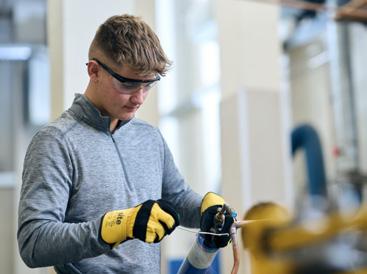
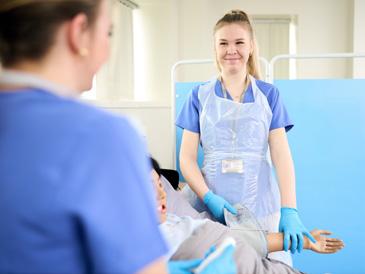


VOCATIONAL STUDIES A LEVEL STUDIES
T LEVEL STUDIES 5 | CONTENTS A Level Courses 18 Apprenticeship Courses 144 Choosing Your Course 8 Contacting Parents/Carers 180 Degree and Higher-Level Study 16 English & Maths Qualifications 9 Entry Requirements 9 ESOL Study Programme 12 General Education 12 Getting to College 15 How to Apply 7 Institute of Technology 14 Open Events & Taster Days 6 Sports Development Centre 13 Vocational & T Level Courses 66 Your Experience (Support) 10
GENERAL INFORMATION
APPRENTICESHIPS
OPEN EVENTS
our
TASTER DAYS
Taster Days for Year 11 students will be held on:

16th & 18th
January 2024
Booking in advance is required. Please see our website or call 01904 770239 for further information.
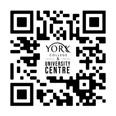
The Schools Liaison Team
Our Schools Liaison Team work closely with schools across the region to ensure students, parents and staff are informed about all Post-16 course options and opportunities available at York College. They deliver presentations and attend careers fairs in school, providing advice and guidance, as well as arranging bespoke visits to the College. To find out more or to get in touch with our Schools Liaison Team, please email info4schools@yorkcollege.ac.uk
19th October
5.30pm
Wednesday 8th November 2023 5.30pm
8.00pm Saturday 25th November 2023 10.30am - 12.30pm Monday 5th February 2024 5.30pm - 8.00pm Tuesday 19th March 2024 5.30pm - 8.00pm Thursday 20th June 2024 5.30pm - 8.00pm
Thursday
2023
- 8.00pm
-
EVENTS | 6 yorkcollege.ac.uk Scan here to see
events page.
HOW TO APPLY
Your application will be reviewed and you may be invited to attend a Guidance Discussion to speak with a member of the curriculum team to discuss the course. You will then receive the outcome of this via email.
Please don’t worry if you are still a little unsure about your course choice, you can change your mind before enrolment by emailing Admissions on info@yorkcollege.ac.uk with your new course choice. If you would like more information on our courses or have any questions, you can attend one of our Open Events or Taster Days, where you can learn a little more about College and speak to tutors and ask questions. For more information on submitting your application, please visit yorkcollege.ac.uk/apply
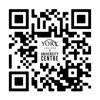
7 | HOW TO APPLY
01
02
will email you to
we
03
Apply online by visiting yorkcollege.ac.uk/ apply
We
confirm
have received your application.
04
on your course in August!
Enrol
Got a Question? Contact our Admissions Team on 01904 770397 or email info@yorkcollege.ac.uk
CHOOSING YOUR COURSe CHOOSING
A LEVELS
A Levels have an academic approach to subjects and are primarily assessed by written exams. Students are advised to take four AS Level subjects. Many students will drop one AS Level at the end of the first year, and study their remaining three subjects to A2 Level (full A Level).

VOCATIONAL COURSES
These courses have a contextual approach to learning and are primarily assessed through assignments and coursework. Students should choose one Vocational course.

T LEVELS
T Levels combine classroom theory, practical learning and a significant industry placement to provide a real experience of the workplace. Students should choose one T Level course.


APPRENTICESHIP PROGRAMMES
These provide a mixture of on and off-the-job training whilst being paid. Students should choose one Apprenticeship course.
HOW TO CHOOSE THE RIGHT PROGRAMME OF STUDY
Plan to your strengths - choose a course or subjects you enjoy and do well at, and for A Level choices don’t worry about odd looking combinations. Don’t just look at what to study - look at how you will study a subject e.g. does it involve group work, debate, and how is it assessed?
Think about your next steps - look at the entry requirements for courses you are hoping to go on to study next.
Consider alternatives - there are lots of different courses and routes available so look at all options and play to your strengths.
Scan to see the York College website.

YOUR COURSE | 8 yorkcollege.ac.uk
entry requirements
The table below gives an overview of typical GCSE entry requirements for our A Level, Vocational, T Level and Apprenticeship programmes starting in September 2024. This is for guidance only. A number of qualifications are being restructured nationally, along with the associated grading approach, so entry requirements may be subject to change for specific programmes of study.
More detailed entry requirement information is available on the course pages of our website, as well as at Open Events, Taster Days and Guidance Discussions. Please note that some courses differ to the general guidance for their level.

Vocational/ Apprenticeship (Level 3)
Vocational/ Apprenticeship (Level 2)
A minimum of 4 subjects at grade 5 or above plus English Language at grade 4 or above.
Exact requirements will vary according to the subject.
5 subjects at grade 4 or above including English and/or Maths.
Exact requirements will vary according to the course.
Please refer to individual curriculum T Level offers for entry requirements.
4 subjects at grade 3. Exact requirements will vary according to the course.
enGLISH & MATHS
In order to support progression to higher levels of study and employment, students who have not yet achieved a grade 4 at GCSE in English Language and Maths, and are 16 -19 years old, will be required to work towards this as part of their study programme. Students will have dedicated English and maths classes and access to additional materials to support independent study, as well as support sessions and revision workshops.
Vocational (Level 1)
Vocational (Entry Level)
3 subjects at grade 2.
Exact requirements will vary according to the course.
There are no formal entry requirements.
A Level (Level 3)
9 | ENTRY REQUIREMENTS
T Level (Level 3)
The ‘Your Experience’ Team at the College are here to support you outside of the classroom to progress and fulfil your ambitions. The team covers a wide range of services on offer to you as a student and each and every one of the team are here to help ensure your experience is a positive one whilst studying at York College.
YOUR PROGRESS
During your time at College you will have a Progress Coach who you will see once a week for both group and one-to-one tutorials. They will talk to you about a range of issues affecting the world around us such as political issues, LGBTQ+ issues, mental health issues and well-being.

Your Progress Coach will check in with your progress within College as well as anything else you may be facing outside of the classroom.
YOUR LEARNING SUPPORT
(for students with learning difficulties and/or disabilities)
York College is committed to ensuring that all students can access, participate and succeed in their learning. We work to provide an inclusive learning environment with a curriculum that ensures that the learning needs of all individuals (including those with learning difficulties and/or disabilities) are met. Many students find that there are times when they need additional support at College. If you have a learning difficulty and/or disability, or an ESOL need and would like support, you can either let us know on your application form, self-refer at enrolment or contact us when you are on your course.
Further information about Learning Support at York College can be found on our website. Alternatively please call 01904 770438 or email learningsupport@yorkcollege.ac.uk
YOUR EXPERIENCE | 10 yorkcollege.ac.uk @ YOUR EXPERIENCE AMBITION | CARE | RESPEC T | SUCCESS
STUDENT SERVICES
Student Services provide impartial information, advice and guidance on a full range of services including:
YOUR FUTURE
The Careers and Enterprise Team is here to enable all students to plan for their future, make informed decisions and learn what’s available in the world of education, employment and training.
Our service is free and confidential and you can book a one-to-one appointment at any time of the academic year. We support you in job applications as well as your UCAS applications, should you be progressing to university. The Work Placement Team assists students in sourcing high-quality placements where this is a requirement for their course, including the new T Levels.
YOUR WELL-BEING
Here at the College we are wholly dedicated to supporting the mental well-being of both our students and staff. We have a dedicated team to support you in your well-being with a programme of events to support your own self-care.
YOUR FINANCE
Our dedicated team will support you with applying for student funding and bursaries, as well as accessing other support from the local community.
YOUR XTRA EXPERIENCE
We offer a wide range of extra-curricular activities that are made easy to access and are developed in response to what students say they would most like to engage with as part of this programme.
Scan here for more details.

YOUR TRANSPORT
Helping you get to and from College. Please see page 15 for more information.
YOUR VOICE
We have developed a robust and active programme of student voice activity in order to ensure students are at the centre of our decision-making and continue to lead us in making the most informed choices in the best interest of our student body.
YOUR LEARNING CENTRE
The Learning Centre is based across three floors in the College and is home to multiple physical and digital learning resources made available to our students to enhance their studies and help them to reach their goals.
The team, known as the Learning and Research team, are on hand across the centre to help you find the right resources and support you with your study skills. They work closely with the curriculum areas to ensure that every field of study has access to current and relevant research materials.

11 | YOUR EXPERIENCE
General Education
Our General Education offer is a small bespoke provision designed to allow students to develop a range of skills, behaviours and attitudes which will help them to progress into further education, employment or higher education. There is a range of courses including:

• Level 1 and Level 2 Prince’s Trust Certificate
• Level 1 and Level 2 Occupational Studies
• Level 3 Extended Project Qualification (EPQ)
For further discussion about the provision, please contact info@yorkcollege.ac.uk
ESOL STUDY PROGRAMME
(ENGLISH FOR SPEAKERS OF OTHER LANGUAGES) 16 -19 YEARS OLD
We offer a bespoke full-time course designed for students from all different overseas backgrounds to improve their reading, writing and communication skills, with basic maths and digital skills included. The course is run over 3 days and starts in late September. There is a beginners and an advanced group to aid progression. We have a designated team who teach and oversee the course allowing students to sit nationally recognised qualifications at levels to suit their ability. This course can offer progression routes into specific vocational courses on offer here at the College moving on to GCSE English & Maths alongside these study programmes. There are entry points for new students to enrol throughout the academic year. For more details you can contact ESOL@yorkcollege.ac.uk
GENERAL EDUCATION | 12 yorkcollege.ac.uk
Sports Development Centre
Our Sports Development Centre is for talented student-athletes aged 16 to 19 who have a passion for their sport and want the opportunity to combine a full-time education programme with high-quality coaching in one of our Development Centre teams.
• Men’s and Women’s Football
• Rugby League

• Basketball
• Netball
These teams are competing at the highest level regionally and nationally within English Colleges and Association of Colleges competitions and leagues. Involvement with the Development Centre is organised during the College week ensuring that students are still free to train and play for their own club outside of College time.

Our Development Centre Sports have outstanding links with local partners who support and enhance our delivery. The whole York College football programme runs in partnership with York City Football Club. Both the Men’s and Women’s Football teams follow the framework of a professional club whilst still accommodating a full-time education programme. Every football coach is UEFA qualified and actively working in academy football.

TASS – DUAL CAREER ACCREDITATION SCHEME


York College are recognised for their support of talented athletes as part of the TASS Dual Career Accreditation Scheme. This recognises our support to talented athletes in their chosen sport in helping them to balance their academic studies alongside their sporting commitments.


For further information please ask our sport tutors at our Open Events or visit the Sports Development Centre page on our website.
You can also ask about the scheme when you enrol at College.
HOW DOES THE EDUCATION AND SPORT MIX WORK?
Every student accepted on to our Sports Development Centre teams is required to undertake a full-time programme of educational study. This is organised to fit in with regular training and coaching. Students may study across the full range of courses offered at the College (subject to Vocational pathways’ timetables and excluding Apprenticeships) and results demonstrate success in both exams and coursework.
WHAT COULD IT LEAD TO?
Successful involvement in any of the Sport Development Centre programmes will provide opportunities to progress into:
• Careers in professional/semi-professional sport (this is only for those who show exceptional development)
• Coaching
• Refereeing
• Work in sport and recreation
• Further and higher education
• Overseas coaching
• Possible scholarships to higher education institutes
To apply for our Sports Development Centre just complete the section on the full-time application form.

13 | SPORTS DEVELOPMENT CENTRE
INSTITUTE OF TECHNOLOGY
The Institute of Technology is part of a government initiative for the College to work alongside local employers and further and higher education institutions to understand what the skills needs are and then look at how the curriculum can be tailored to meet those needs. Through the Institute of Technology, employers will have the opportunity to support the content of courses and help ensure that students’ higher and technical skills are up-to-date and relevant for the workplace.
The IoT brought an investment of circa £10 million of capital funding into the region. York College has invested a proportion of this into industry-standard equipment to support the delivery of higher-level technical training. This massive training boost will enhance employment opportunities and ensure highly qualified individuals for the region’s employers.
WORKING WITH LOCAL EMPLOYERS
The bid has received significant levels of employer support. Digital and engineering businesses, ViSR, CATCH, Skipton Building Society, GB Recruitment and ENGIE Fabricom recognised the need for investment in education to address their wider skills
shortages and have signed up as employer partners to be involved in designing the appropriate curriculum, supported by research from the local universities. These employers are part of the governance of the IoT to ensure continued collaboration and long-term benefits for the region.
York College is delivering programmes in Cybersecurity, Digital Technologies, Construction, Engineering & Manufacturing, Graphics & Communication, Creative Practice and Film Production.

Please see below for the latest information on the developments in our facilities and programmes.
Visit www.yorkcollege.ac.uk
Email info@yorkcollege.ac.uk
Call 01904 770770
Scan to see further IOT information.


INSTITUTE OF TECHNOLOGY | 14 yorkcollege.ac.uk
Getting to COLLEGE
We operate privately run College coach routes directly into College from around the region. In addition to these, public service operators’ stop outside or near the College on interurban routes from Leeds, Thirsk, and Easingwold, amongst others.
If you live within the City of York, College transport serves Huntington and Fulford, with public service operators’ buses available from Manor CE Academy, Rawcliffe, Acomb, Clifton Green, Monks Cross, Heworth and more, all stopping outside or close by the College. Most other routes within the city stop at or near to York train station, where there are regular connecting buses to bring you to College.
If you commute by train there is a fast, frequent Park and Ride service from outside York train station to Askham Bar Park and Ride site, which is a five-minute walk from campus, or simply use any of the other routes passing the College.
If travelling by bike you can use our covered secure cycle parking on campus. Due to its easily accessible location driving to York College couldn’t be more simple. We have secure permit parking for anybody who has held a full driving licence for a year or more.
For more information, please visit the Travel page of the College website www.yorkcollege.ac.uk/about/travel or visit www.itravelyork.info
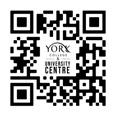
Leeds Richmond 1 6 11 15 8 Northallerton Ripon Knaresborough Harrogate Crossgates Hull Whitby Bridlington 2 3 4 5 10 14 9 7 13 12 Selby Goole Wistow Howden Market Weighton Barmby Moor Nafferton Filey Scarborough
York
Kirkbymoorside
@ TRAVEL & TRANSPORT 15 | GETTING TO COLLEGE
Scan to see the York College travel web page.
Degree & Higher-Level Study
Did you know that as well as offering a range of A Levels, Vocational courses, T Levels and Apprenticeship programmes, we also offer a variety of degree and higher-level qualifications?
We have a wide range of courses that are flexible and personalised to suit your career aspirations. We can provide the support, flexibility, contact time and teaching required to help students of all types succeed. With courses developed with your future employability in mind, and designed to work alongside studying or other life commitments, York College University Centre could be a perfect fit for you.
Here is a selection of courses on offer:
CREATIVE STUDIES
BA (Hons) 3D Creative Practice
BA (Hons) Acting for Stage & Screen
BA (Hons) Fashion Design & Garment Technology
BA (Hons) Film Production & Professional Practice
BA (Hons) Graphic & Communication Design
Foundation Degree (FD) Media Make-up, Special Effects & Hair Design
BA (Hons) Media Make-up, Special Effects & Hair Design (Top-up)
PROFESSIONAL STUDIES
Foundation Degree (FD) Business Management
BA (Hons) Business Management (Top-up)
Certificate in Education (Cert.Ed) Professional/ Postgraduate Certificate in Education (PGCE)
Foundation Degree (FD) Children’s Development & Learning
BA (Hons) Leading Children’s Development & Learning (Top-up)
Salon Management VTCT Level 4
Advanced Beauty Therapy VTCT Level 4 (Top-up)
Internal Quality Assurance Awards Level 4
Therapeutic Counselling Level 4
CIPD Associate Diploma in People Management Level 5
Sports Coach (Community Coach or School Sports Coach) Apprenticeship Level 4
TECHNICAL STUDIES
Higher National Certificate (HNC) Construction & the Built Environment Foundation Degree (FD) Digital Technologies (Cybersecurity)
Higher National Certificate/Diploma (HNC/HND) Engineering
Higher Construction Site Supervisor Level 4 Apprenticeship
Higher Engineering (Electrical/Mechanical) Level 4 Apprenticeship
For advice and guidance email info@yorkcollege.ac.uk or call 01904 770397
Scan to see more information on our website.

DEGREE AND HIGHER-LEVEL STUDY | 16 yorkcollege.ac.uk
DISCLAIMER
Every care has been taken to ensure the accuracy of the information given in this prospectus. However, York College cannot accept any responsibility for the consequences of any error or omissions in its content.
If, in the opinion of the College authorities, circumstances necessitating a change in the course provision occur, an advertised course may be changed or the content of any course may be modified.
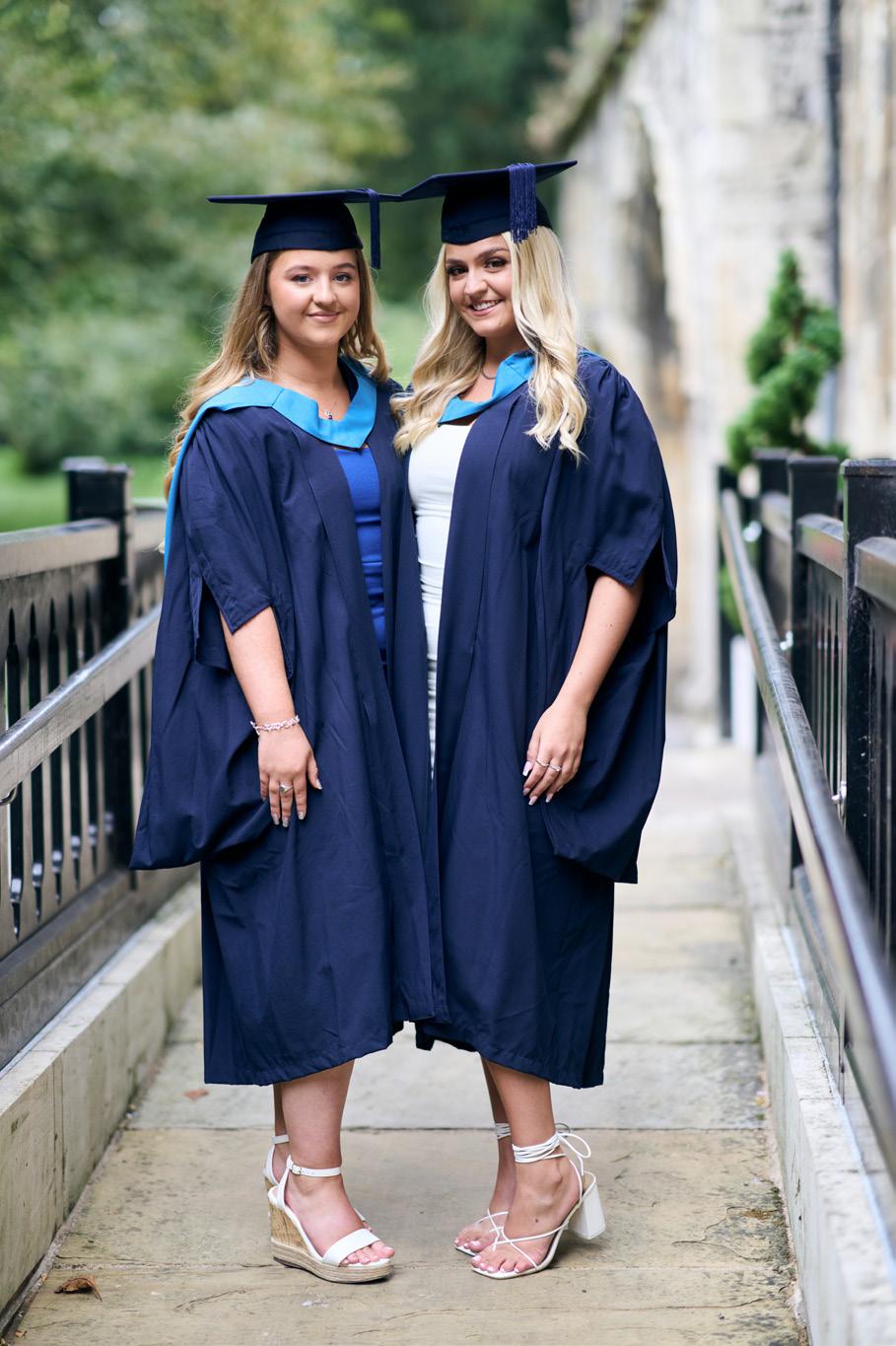
17 | DEGREE AND HIGHER-LEVEL STUDY

A LEVEL | 18 yorkcollege.ac.uk A
LEVEL
A Level Faculty
The A Level Faculty’s academic ethos, freedoms and responsibilities create a culture which acts as a stepping stone between school and university, yet is still underpinned by a thorough pastoral system.
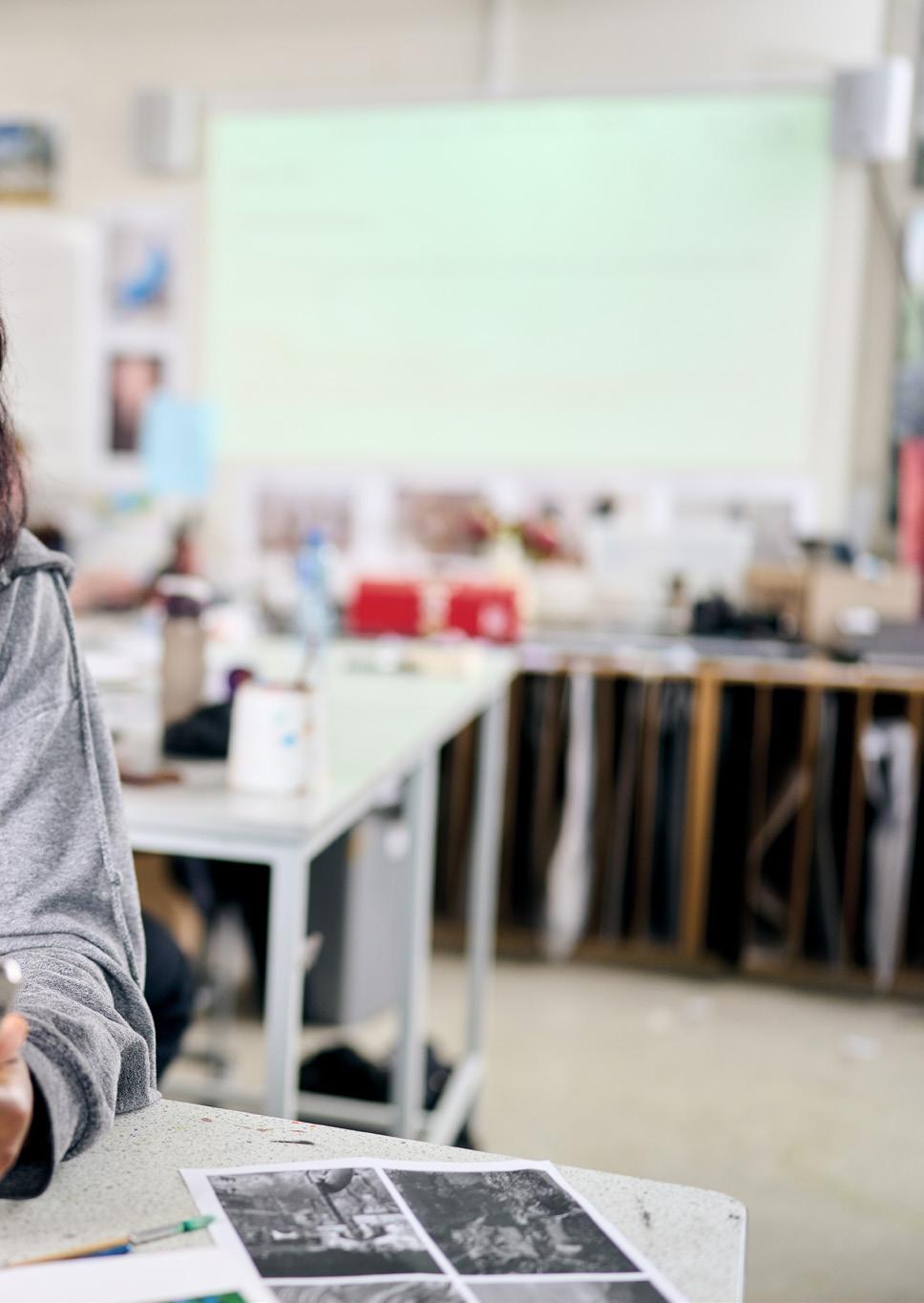
A Level tutors are subject specialists: many of them are examiners and/or hold higher degrees in their subjects and as such they can not only prepare students very well for examinations, but also take them beyond the limits of the course to see what study at a higher level could be like. Our strong links with universities and our more adult working relationships between tutors and students prepare students very well for both higher academic study and the world of work.
A Level students also have access to an excellent range of enrichment activities, many of which develop valuable skills and enhance them as applicants for their next steps. Well-established activities like the debating, law and politics groups are joined each year by more student-led activities reflecting young people’s interests.
19 | A LEVEL

A LEVEL | 20
Course Directory AS and A Level
COURSE DIRECTORY
21 | A LEVEL Languages French 47 German 48 Spanish 48 Maths Mathematics 51 Further Mathematics 52 Core Maths Certificate 53 Media: Print, TV & Film Media Studies 55 Film Studies 55 Music Music 57 Music Technology 57 Performance & Production Drama & Theatre Studies 59 Science Biology 61 Chemistry 61 Geography 62 Geology 62 Physics 63 Sport Physical Education 65 Art & Design Art & Design (Fine Art) 23 Art & Design (Photography) 24 Art & Design (Textiles) 24 Business Accounting 27 Business 27 Economics 28 Financial Studies Certificate/Diploma 28 Digital Technologies Computer Science 31 Engineering Engineering Extended Certificate 33 Design & Technology: Product Design 34 English English Language 37 English Language & Literature 38 English Literature 38 Humanities & Social Sciences History (Ancient History) 41 History (Late Medieval & Early Modern) 41 History (Modern) 42 Law 42 Philosophy, Ethics & Religion 43 Politics 44 Psychology 44 Sociology 45
Page Page
ART & Design
I chose to study at York College because I felt comfortable in its environment and was excited to use its specialised facilities. I enjoy experimenting with new techniques and designing my own creations.

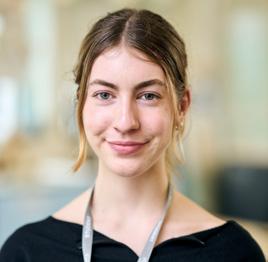

In the future I would like to follow an artistic route and work in fashion design, going to a fashion university to help me do so.
Milly
Textiles A Level
A LEVEL | 22 FIND OUT MORE
ART & Design (FINE ART)
AS & A Level Two year course Entry requirements
Please see page 9 for general A Level guidance and check the course description on our website for exact entry requirements for this subject. You can also speak to our tutors at Open Events and Guidance Discussions for further information. We would be happy to look at a portfolio of your work at your guidance discussion, and if you have the potential will offer you a place.
What will I study?
Students will learn and develop a range of skills in relation to drawing, painting, sculpture and mixed media. Students produce work from initial research, through development and experimentation, to form a finished piece. They also research a range of relevant artists to gain inspiration for their own creative ideas and themes. Students’ studio-based practice is contextualised with educational visits to exhibitions of contemporary art. Students’ achievements are celebrated in an exhibition of work as part of the final Creative Show.
Good course combinations
This course combines well with most other A Levels, although students should not study more than two of the Art & Design options as they are coursework-based subjects which require a lot of time and dedication.

Your next steps
Students can apply to do a one year post-A Level Art & Design Foundation Diploma, go directly on to higher education degree courses or apply for apprenticeships. Past students have successfully completed degrees at Goldsmiths University of London, Edinburgh College of Art, Manchester Metropolitan University and Slade School of Art.
MORE ONLINE YORKCOLLEGE.AC.UK
23 | ART & DESIGN
Two year course
Entry requirements
Please see page 9 for general A Level guidance and check the course description on our website for exact entry requirements for this subject. You can also speak to our tutors at Open Events and Guidance Discussions for further information. We would be happy to look at a portfolio of your work at your guidance discussion, and if you have the potential will offer you a place.
What will I study?
You will be taught a variety of creative techniques and processes in art, design and photography. Coursework will include the use of camera equipment, studio work, computer software presentation skills, bookmaking, building a portfolio and a digital sketchbook of creative ideas and personal project work. Your studio coursework and personal practice is contextualised with educational visits to exhibitions of contemporary art. During the summer term we celebrate your achievements with a public exhibition of your work at the end of year Creative Show.
Good course combinations
This course combines well with most other A Levels, although students should not study more than two of the Art & Design options as they are coursework-based subjects which require a lot of time and dedication.
Your next steps
Students can apply to do a one year post-A Level Art & Design Foundation Diploma, go directly on to higher education degree courses or apply for apprenticeships. Past students have successfully completed creative degrees at Goldsmiths University of London, Edinburgh College of Art, Manchester Metropolitan University and Slade School of Art.
ART
& Design (TEXTILES)
Two year course
Entry requirements
Please see page 9 for general A Level guidance and check the course description on our website for exact entry requirements for this subject. You can also speak to our tutors at Open Events and Guidance Discussions for further information. We would be happy to look at a portfolio of your work at your guidance discussion, and if you have the potential will offer you a place.
What will I study?
The course provides students with the opportunity to learn and develop a range of skills in relation to felt making, silk paper making, hand and machine embroidery, various methods of print and surface decoration, fabric manipulation, pattern cutting and garment construction. Students research a range of artists and designers to gain inspiration for their own creative ideas and themes. The programme provides students with the opportunity to express themselves imaginatively and creatively using a range of media. Students’ studio-based practice is contextualised with educational visits to exhibitions of contemporary art.
Good course combinations
This course combines well with most other A Levels, although students should not study more than two of the Art & Design options as they are coursework-based subjects which require a lot of time and dedication.
Your next steps
Students can apply to do a one year post-A Level Art & Design Foundation Diploma or go directly on to higher education degree courses or apply for apprenticeships. Past students have successfully completed creative degrees at Nottingham Trent University, Edinburgh University, London College of Fashion and Central Saint Martins, and have gone on to study fashion marketing, journalism and merchandising.
yorkcollege.ac.uk
AS & A Level
ART & Design (PHOTOGRAPHY)
AS & A Level A LEVEL | 24

MORE ONLINE YORKCOLLEGE.AC.UK 25 | ART & DESIGN
Business
The Business and Economics courses have linked perfectly and have had a small cross-over of content to help me understand certain topics very well. I like the combination of numerical answers and essay style writing, an especially nice balance in these subjects.
 Daniel A Level Business and Economics
Daniel A Level Business and Economics

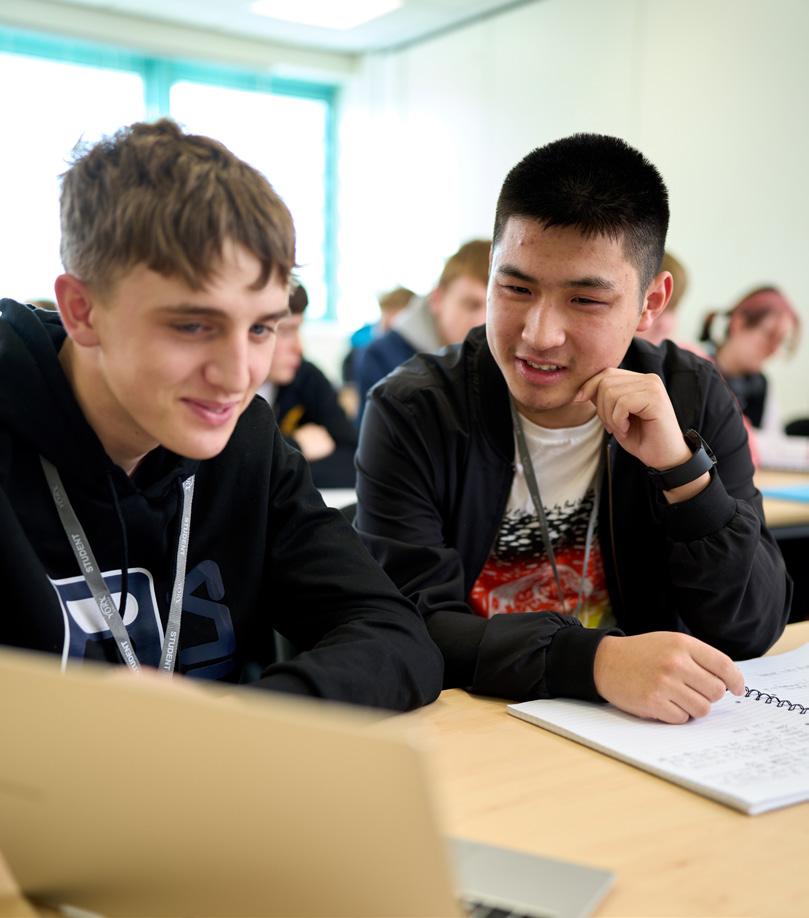
A LEVEL | 26 FIND OUT MORE
Two year course
Entry requirements
Please see page 9 for general A Level guidance and check the course description on our website for exact entry requirements for this subject. You can also speak to our tutors at Open Events and Guidance Discussions for further information.
What will I study?
This course is one full A Level and you must study both years to achieve the qualification.
You will build your knowledge and understanding of key concepts, principles and techniques of accounting that can be applied to real-life scenarios, develop the ability to solve problems logically, analyse data methodically, make reasoned choices and communicate your findings effectively.
Course content includes analysis and evaluation of financial information, budgeting, accounting for limited companies, capital investment appraisal, and preparation of financial statements.
You will gain skills and knowledge that prepare you for work in the accounting and finance sector and for a range of business, management and finance courses at university.
Good course combinations
This subject combines well with Business, Economics, the Financial Studies Certificate/Diploma, Maths or Core Maths.
Your next steps
Upon completion of A Level Accounting, you will be prepared for further study at university or to explore options to study professional qualifications in Accounting such as AAT, ACCA, ACA, CIMA or CIOT.
Two year course
Entry requirements
Please see page 9 for general A Level guidance and check the course description on our website for exact entry requirements for this subject. You can also speak to our tutors at Open Events and Guidance Discussions for further information.
What will I study?
Business gives an understanding of the many problems businesses can face and encourages you to develop analytical and evaluative ways to solve them.
Areas of study include:
• Managers, leadership and decision making
• Decision making to improve marketing performance
• Decision making to improve operational performance
• Decision making to improve financial performance
• Decision making to improve human resource performance
• Analysing the strategic position of a business
• Choosing strategic direction
• Strategic methods: how to pursue strategies
• Managing strategic change
Good course combinations
Business combines well with any subject but particularly Accounting, Economics and the Level 3 Certificate/ Diploma in Financial Studies.
Your next steps
You can progress on to a higher-level course at York College or university, or an apprenticeship in a number of related areas e.g. marketing and business.
27 | BUSINESS
A Level ACCOUNTING AS & A Level Business
AS & A Level
Financial Studies
Certificate/Diploma Level 3
Two year course
Entry requirements
Please see page 9 for general A Level guidance and check the course description on our website for exact entry requirements for this subject. You can also speak to our tutors at Open Events and Guidance Discussions for further information.
What will I study?
Year One subject content includes:
The Operation of Markets and Market Failure
• Economic methodology and the economic problem
• Production, costs and revenue
The National Economy in a Global Context
• The measurement of macroeconomic performance
• Economic performance
Year Two subject content includes:
Individuals, Firms, Markets and Market Failure
• Individual economic decision making
• Price determination in a competitive market
• The labour market
• The market mechanism, market failure
Good course combinations
Economics combines well with Business, Accounting, the Level 3 Certificate/Diploma in Financial Studies, Maths and any of the Social Sciences.
Your next steps
The course will prepare you for higher education economics courses, form a component of a joint degree with a wide range of other subjects or lead to higher apprenticeships. Possible careers could include working in financial markets, business management and corporate law.
Two year course
Entry requirements
Please see page 9 for general A Level guidance and check the course description on our website for exact entry requirements for this subject. You can also speak to our tutors at Open Events and Guidance Discussions for further information.
What will I study?
Year One - The Certificate
The units studied encourage you to become a responsible borrower and sensible saver and to appreciate the need for financial planning throughout your life.
Key content areas include:
• Financial services and products, including sources of help and advice
• Borrowing, budgeting, financial planning and cash flow forecasting
• Risk and reward in managing personal finance
Year Two - The Diploma
Year Two provides an in-depth exploration of the important concepts of financial capability and how to apply them in achieving longer-term financial stability.
Key content areas include:
• Personal and external factors that lead to change
• The financial services system and financial sustainability (individual and general)
• Marketing techniques
Good course combinations
Financial Studies goes well with Accounting, Business and Economics.
Your next steps
The financially-related content serves as a strong grounding for undergraduate study within finance and business-related disciplines. Many students go on to study accounting, business, finance and banking, including higher-level courses and apprenticeships at York College.
yorkcollege.ac.uk
Economics
A LEVEL | 28

MORE
YORKCOLLEGE.AC.UK 29 | BUSINESS
ONLINE
Digital Technologies
Computer Science is an area I’ve been interested in for a long time. This course has been so worthwhile and interesting. The tutors are really knowledgeable and the programming project has helped us prepare for the real world of work.


I’m going to study Cybersecurity at university which includes taking the qualifications to become a qualified Network Engineer, which is what I’d like to do for a career.
Stephanie Computer Science A Level

A LEVEL | 30 FIND OUT MORE
AS & A Level Two year course Entry requirements
Please see page 9 for general A Level guidance and check the course description on our website for exact entry requirements for this subject. You can also speak to our tutors at Open Events and Guidance Discussions for further information. You do not need to have studied GCSE Computer Science.
What will I study?
Practical programming forms a significant element of the course, predominantly in C# which complements any Python experience a student may already have. You will also gain an understanding of different levels and types of programming languages and scripting. Strategies for problem-solving are studied, together with information management techniques. You will gain an understanding of computer hardware and software functionality as well as a detailed appreciation of how computer architectures operate. The course addresses all stages of the life cycle of computer software. The background to computing, including its consequences in society, is also a focus.
The course is organised into four modules including practical programming elements in both years.

The units are:
• Computer Fundamentals
• Programming Techniques and Logical Methods
• Advanced Computer Theory
• Computing Project
Good course combinations
This course combines well with most other A Levels, and is particularly complemented by Maths, sciences and creative subjects.
Your next steps
Computer Science is an extremely useful A Level, leading into a wide variety of computer-based disciplines, plus technologically rich subjects such as engineering or science. Many students progress to a range of university degree courses, whilst others progress to apprenticeships or full-time work in the computing or wider technology sectors.
MORE ONLINE YORKCOLLEGE.AC.UK Computer
31 | DIGITAL TECHNOLOGIES
Science
Engineering
Design Technology is one of my favourite courses as I enjoy designing products that can help people, as well as spending time in the workshop bringing designs to life. It is a really interesting course and I would recommend studying it if you enjoy thinking and being creative to solve problems.

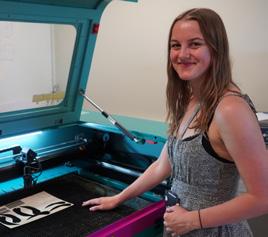

Lilli-Ella
Design & Technology: Product Design
A LEVEL | 32 FIND
MORE
OUT
Two year course Entry requirements
Please see page 9 for general A Level guidance and check the course description on our website for exact entry requirements for this subject. You can also speak to our tutors at Open Events and Guidance Discussions for further information.
What will I study?
This course is equivalent to one A Level and you must study both years to achieve a qualification. It is ideal if you are thinking about a career in the engineering sector; whether an apprenticeship and/or university. Over the two years the course develops a very broad variety of engineering skills and knowledge, involving Engineering Maths, Mechanical and Electrical Engineering Principles, 2D & 3D Computer Aided Design (CAD), Product Design, knowledge and applications of engineering materials and processes, as well as developing practical and teamworking skills to create a batch of engineered products safely. You will learn how to transform problematic designs into successful engineering products.
Year One Engineering Principles
There is an increasing demand for ‘multi-skilled’ engineers who can apply principles from several engineering disciplines to develop solutions. You will develop your mathematical and scientific knowledge and understanding to enable you to solve problems set in an engineering context, covering mechanical and electrical and electronic problems.
Computer Aided Design in Engineering
Engineering is a multi-disciplinary subject that uses CAD as part of other processes to develop products and systems. In this unit you will develop the skills to produce 2D and 3D drawings, using AutoCAD and SolidWorks. You will acquire the skills to produce models of products, editing and modifying these, exploring materials and their properties to produce a portfolio of 2D and 3D drawings.
Year Two
Delivery of Engineering Processes Safely as a Team
To ensure that engineering processes can be planned and carried out safely and effectively, engineers must be able to work together. You will examine engineering materials, processes, health and safety legislation and regulations, and how individual and team performance can be affected by ‘human factors’, as well as learning the principles of engineering drawing and developing two-dimensional computer-aided drawing skills. You will work as a team member and team leader to manufacture an engineered product.
Engineering Product Design and Manufacture
In this unit you will examine what triggers changes in the design of engineering products and the typical challenges that engineers face, and learn how material properties and manufacturing processes impact on the design of an engineering product. You will interpret an externally set brief regarding an engineered product, research this product, plan your approach to improving the product, produce initial concept ideas, develop a final design, communicate this in engineering drawings and justify/ evaluate your proposed improved solution.
Good course combinations
Recommended to be combined with A Level Maths and/or Physics, which allows you to progress to higher education engineering or other STEM-related programmes.
Your next steps
Higher education to study engineering or related subjects; a larger size qualification at Level 3 (e.g. Extended Diploma in Advanced Manufacturing Engineering); an engineering apprenticeship or work in the sector.
Engineering 33 | ENGINEERING
Extended Certificate Level 3
Design & Technology: Product Design
Two year course Entry requirements
Please see page 9 for general A Level guidance and check the course description on our website for exact entry requirements for this subject. You can also speak to our tutors at Open Events and Guidance Discussions for further information.
What will I study?
You will balance developing an understanding of design theory alongside the demands of creative project work where elements of the theory are applied. The substantial creative project element allows you to steer the direction of your work down a more graphical route or a more 3D resistant materials route depending on your preference.
For both AS and A Level the component work is tailored to ‘Product Design’ from initial design to manufacture and marketing.
Year One
Component 1: Principles of Design and Technology
You will learn about materials, processes and techniques to shape, form, join and manufacture relevant products and components. Other areas you will study include CAD (Computer Aided Design), digital technologies, the effects of technological developments and the factors which influence the development of a product and design history.
Component 2: Design and Make Project
You will undertake a small scale ‘design, make and evaluate’ project to a given ‘external’ brief from the exam board. Example briefs have been around products which (with sustainable design) promote a healthy lifestyle, independent living or caring for pets and children. A redesign, product improvement, or re-purposing of an existing product will develop your research and analytical skills.
Year Two
Component 1: Principles of Product Design
Analytical ‘Product based’ exam questions considering usability, materials, manufacturing processes, existing design practices, route to market and sustainability.
Component 2: Problem Solving in Product Design
You will be given a scenario and product where you will need to demonstrate your analytical, problem-solving and evaluative skills in order to redesign and improve the given product.
Component 3: Design and Make Project
You will undertake a substantial ‘design, make and evaluate’ project of your choice, with a ‘real’ client. This requires you to produce a portfolio and a prototype outcome. This will involve justifying the project choice, creating a solution and evaluating the outcome with your ‘real’ client.
Good course combinations
Maths, Physics, Business, Computer Science, and the BTEC Extended Certificate in Engineering. Although Art & Design A Levels would complement this subject, consideration must be given to the amount of coursework being undertaken.
Your next steps
Higher education, in particular any design-related course including product design, engineering disciplines, architecture, animation, graphic design and the post Level 3 Foundation Diploma in Art & Design.
yorkcollege.ac.uk AS & A Level
A LEVEL | 34
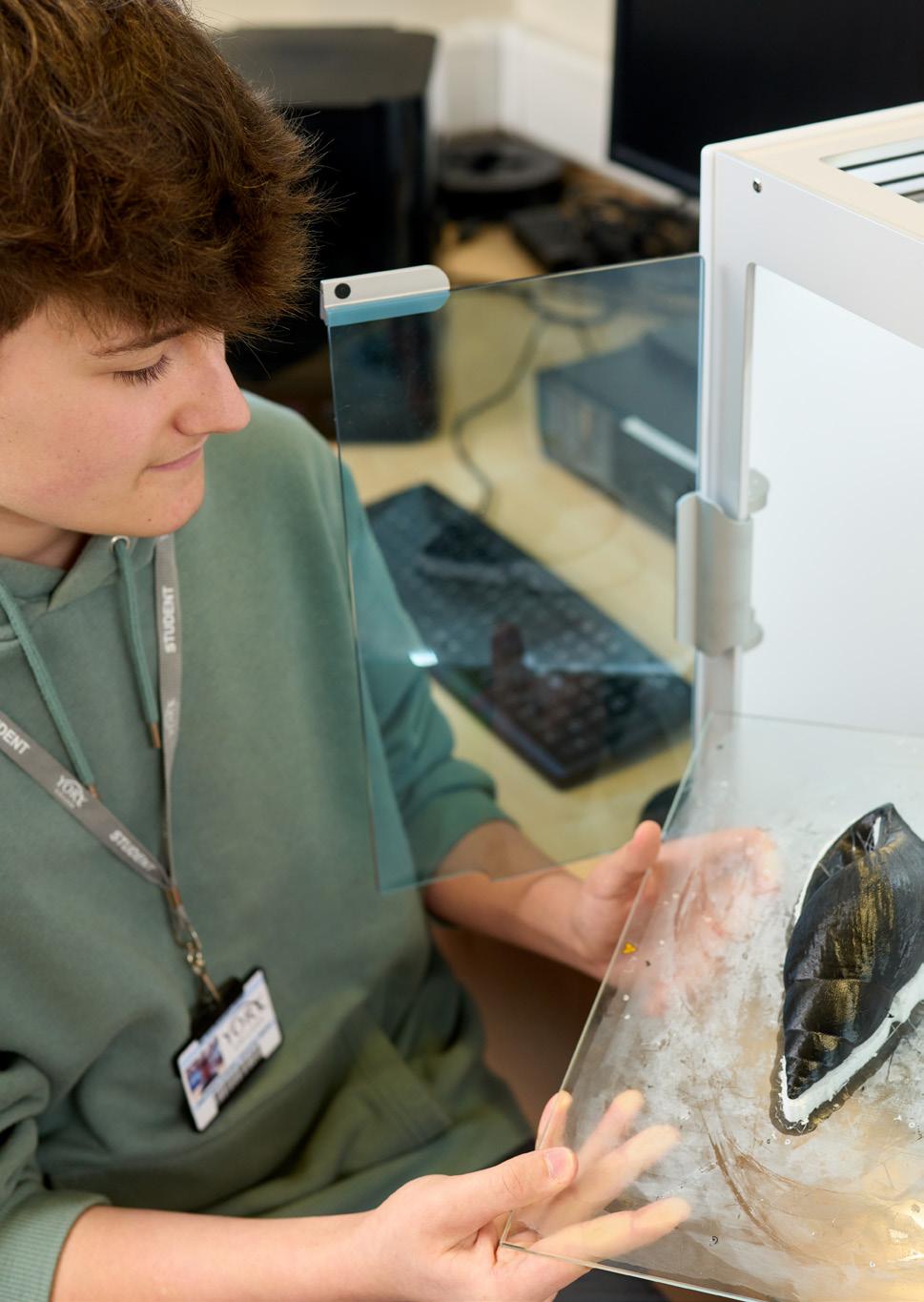
MORE
YORKCOLLEGE.AC.UK 35 | ENGINEERING
ONLINE
ENGLISH
Studying English Language allowed me to do an independent research project on the topic of World English; I was surprised by how much it relates to society. I feel that the analytical skills I have learnt under the guidance of my tutor will help me massively with degree study.
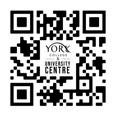
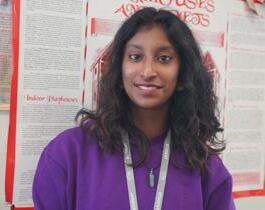

Shakirah
English Language A Level
A LEVEL | 36 FIND OUT MORE
AS & A Level Two year course Entry requirements
Please see page 9 for general A Level guidance and check the course description on our website for exact entry requirements for this subject. You can also speak to our tutors at Open Events and Guidance Discussions for further information.
What will I study?
We follow the AQA English Language specification which builds on GCSE and introduces new areas like sociolinguistics. The content and approach examine new, more varied aspects of the subject including accent and dialect, gender and World English.
Year One
Paper 1: Language and the Individual
Assessing textual variations and representations and methods of language analysis.
Paper 2: Language Varieties
Assessing language diversity, writing skills and methods of language analysis.
Year Two
Paper 1: Language, the Individual and Society
Assessing textual variations and representations, children’s language development and methods of language analysis.
Paper 2: Language Diversity and Change
Assessing language diversity and change, language discourses, writing skills and methods of language analysis.
Non-Exam Assessment: Language in Action
Assessing a language investigation, original writing and methods of language analysis.
Good course combinations
This course combines well with most A Levels, particularly Modern Languages; Sociology; Philosophy, Ethics & Religion; Politics; Psychology and History.
Your next steps
Degree level study in areas such as English, journalism, creative and media industries, public relations, museum work, civil service, law, linguistics degrees and primary school teaching. A number of our students also move on to degree apprenticeships, particularly in journalism.
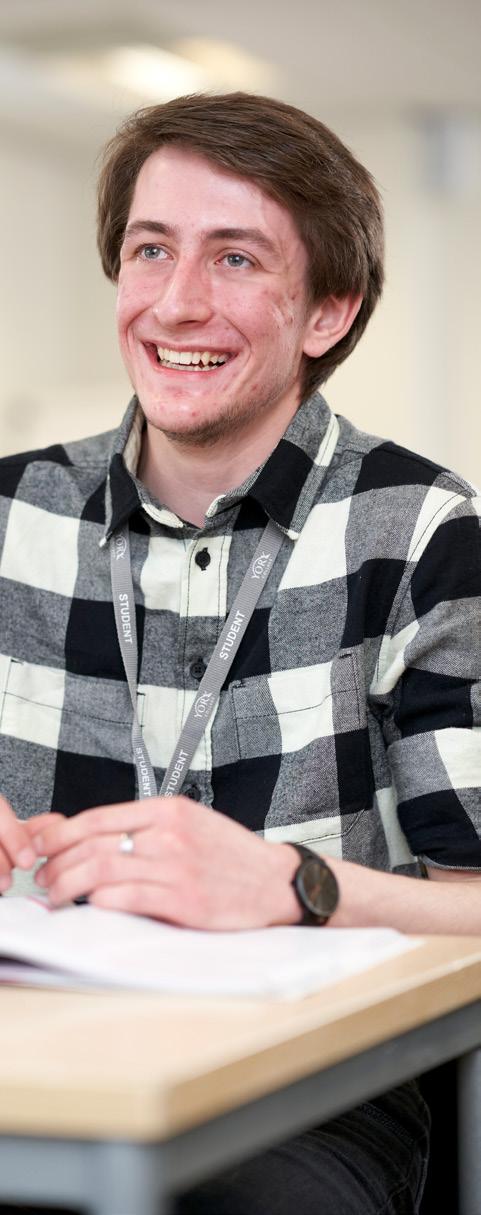
MORE ONLINE YORKCOLLEGE.AC.UK English Language 37 | ENGLISH
Two year course
Entry requirements
Please see page 9 for general A Level guidance and check the course description on our website for exact entry requirements for this subject. You can also speak to our tutors at Open Events and Guidance Discussions for further information.
What will I study?
You will develop skills of literary analysis and evaluation, consider a variety of viewpoints and develop your own skills as a producer of written language.
Year One
Studying The Bloody Chamber by Angela Carter and Wuthering Heights by Emily Brontë as well as a variety of works from Voices in Speech and Writing: An Anthology.
Paper 1: Voices in Speech and Writing
Creation of voice and comparing voices.
Paper 2: Varieties in Language and Literature
Exploring the theme of Encounters.
Year Two
Continuing the theme of Encounters studying Tennessee Williams’ A Streetcar Named Desire and two of your own texts to form the backbone of your non-exam assessment.
Paper 1: Voices in Speech and Writing
In 20th and 21st century text and drama texts.
Paper 2: Varieties in Language and Literature
Looking at unseen prose non-fiction texts, prose fiction and other genres.
Non-Exam Assessment (NEA)
A coursework based assessment that enables you to be analytical, creative, and original.
Good course combinations
This course combines well with most A Levels, particularly Modern Languages, Film Studies, Media Studies, History, Politics, Sociology, Music and Art.
Your next steps
Degree level study in areas such as English, journalism, creative and media industries, public relations, civil service and law.
Two year course Entry requirements
Please see page 9 for general A Level guidance and check the course description on our website for exact entry requirements for this subject. You can also speak to our tutors at Open Events and Guidance Discussions for further information.
What will I study?
You will study Comedy in the first year, exploring concepts including the role of the hero and how language highlights comedy with wit and wordplay. The study of Political and Social Protest Writing in the second year considers issues including the pursuit of power itself.
Year One
Paper 1: Literary Genres - Drama
Based on Shakespeare’s The Taming of the Shrew and Oscar Wilde’s The Importance of Being Earnest.
Paper 2: Literary Genres - Prose and Poetry
Based on Jane Austen’s Emma and a selection of poetry from the AQA Critical Anthology.
Year Two
Paper 1: Literary Genres
Based on The Taming of the Shrew, The Importance of Being Earnest and Emma.
Paper 2: Texts and Genres - Political and Social Protest Writing
Based on Blake’s Songs of Innocence and Experience, Jim Crace’s Harvest and Henrik Ibsen’s A Doll’s House.
Non-Exam Assessment: Theory and Independence
You will study Cristina Rossetti’s poetry and a novel of your choice alongside AQA’s Critical Anthology. You’ll write two essays exploring the texts from a critical perspective –these include gender, Marxism and post-colonialism.
Good course combinations
This course combines well with most A Levels, particularly essay writing subjects such as Modern Languages, History, Psychology, Sociology, Drama & Theatre Studies and Film Studies.
Your next steps
Degree level study in areas such as English, journalism, creative and media industries, public relations, civil service and law.
yorkcollege.ac.uk AS & A Level English Language & Literature AS & A Level English Literature A LEVEL | 38

MORE ONLINE YORKCOLLEGE.AC.UK 39 | ENGLISH
Humanities & Social ScienCes

I chose Politics because I intend to pursue journalism as a future career so informing myself on past and current affairs is useful.
I also enjoy learning about international relations between different states, and the course tutor is very engaging. Lucia Politics A
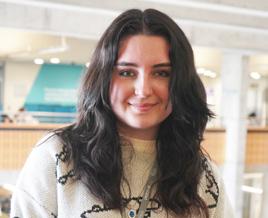

A LEVEL | 40 FIND OUT MORE
Level
History (Ancient History)
AS & A Level Two year course Entry requirements
Please see page 9 for general A Level guidance and check the course description on our website for exact entry requirements for this subject. You can also speak to our tutors at Open Events and Guidance Discussions for further information.
What will I study?
History has rightly been described as an ‘argument without end’. It offers no fixed answers but some insight into what it is to be a human being and real training in logical thought, data-handling and the attractive expression of ideas. It is also great fun.
You will study Greek and Roman history, the views of ancient historians and how the ancient world was viewed by them. We will be looking at a period of at least 75 years and the in-depth study will look at social, economic, political, cultural, religious, technological and military factors involved in a particular event or situation.
Good course combinations
Ancient History can be taken alongside either Modern or Late Medieval & Early Modern History and works well with English. It also makes a stimulating fourth subject alongside any combination.
Your next steps
You should consider studying A Level History if you intend to take a degree in history or a closely related subject such as politics, or if you intend to follow a course in higher education for which history is a suitable preparation (such as law). Past students have gone into careers in law, teaching and museum curation.
History (Late Medieval & Early Modern)
AS & A Level Two year course Entry requirements
Please see page 9 for general A Level guidance and check the course description on our website for exact entry requirements for this subject. You can also speak to our tutors at Open Events and Guidance Discussions for further information.
What will I study?
Year One
England, Authority, Nation and Religion 1509 - 1603
Political, social and economic features of Tudor England from the accession of Henry VIII in 1509 to the death of Elizabeth I in 1603.
Luther and the German Reformation c.1515 - 55 Luther’s challenge to the Catholic Church, the development of a separate Lutheran Church, and the response of Empire and the papacy to this challenge.
Year Two
Lancastrians, Yorkists and Henry VII 1399 - 1509 Comprising two parts: the aspects in breadth focus on long-term changes and contextualise the aspects in depth, which focus in detail on key episodes.
Coursework
Focussing on how events in the past have been interpreted by different historians. It develops the skills of analysis and evaluation, based on a question surrounding a key area of historical debate of your choice.
Good course combinations
This course works well with English courses, Law, Sociology and Politics. It is not possible to study Late Medieval & Early Modern History alongside Modern History.
Your next steps
A degree in history or a closely related subject such as politics, or a course in higher education for which history is a suitable preparation (such as law). Past students have gone on to careers in law, teaching, business and politics.
41 | HUMANITIES & SOCIAL
SCIENCES
Two year course
Entry requirements
Please see page 9 for general A Level guidance and check the course description on our website for exact entry requirements for this subject. You can also speak to our tutors at Open Events and Guidance Discussions for further information.
What will I study?
Year One units include:
Germany and West Germany, 1918 - 89
You will learn about key political changes experienced in a unified Germany and then in West Germany after the Second World War, and the impact of these changes on German economic, social and cultural developments.
The Rise and Fall of Fascism in Italy, c. 1911 - 46
A study in depth of the turbulent years in Italy that saw the collapse of the liberal state, the creation of a fascist dictatorship under Mussolini and a return to democracy in the aftermath of the Second World War.
Year Two units include:
Poverty, Public Health and the State in Britain, c.1780 - 1939
Exploring how the British government gradually took on more responsibility for people’s health and welfare within the context of the Industrial Revolution.
Coursework
This module focuses on how events in the past were interpreted by different historians. It develops analysis and evaluation skills, based on a question or problem surrounding a key historical event or period.
Good course combinations
This course works well with Politics and Sociology. It also makes a stimulating fourth subject alongside any combination. It is not possible to study Late Medieval & Early Modern History alongside Modern History.
Your next steps
A degree in history, a closely related subject such as politics or a course for which history is a suitable preparation (such as law). Past students have gone on to careers in law, teaching, business, journalism and politics.
AS & A Level
Two year course
Entry requirements
Please see page 9 for general A Level guidance and check the course description on our website for exact entry requirements for this subject. You can also speak to our tutors at Open Events and Guidance Discussions for further information.
What will I study?
Law provides useful knowledge for life and transferable skills useful for a wide range of university courses and jobs. You will develop analysis, evaluation, independent research and problem-solving skills.
Year One units include:
• The Legal System – Civil courts and criminal courts, legal professionals, access to justice and sentencing.
• Introduction to Criminal Law – Basic principles of criminal law, non-fatal offences against the person.
• Law Making – Parliamentary law making, delegated legislation and judicial precedent.
• Tort Law – Introduction to Tort Law, basic principles of negligence and duty of care, damages and compensation.
Year Two units include:
• Criminal Law – An advanced study of non-fatal offences and fatal offences, attempted crimes and a range of defences.
• Additional Tort Law – Torts against land nuisance, defences in the law of negligence and vicarious liability.
• Further Law – The concepts/ideas which underpin our laws.
• Human Rights – Including liberty (police powers), fair trial, privacy and freedom of expression.
Good course combinations
This course works well with Politics, Sociology and English Language and is a stimulating fourth subject alongside any combination.
Your next steps
Many students go on to study law further and progress to work in the legal professions. It is useful for degree subjects such as criminology, policing and social work.
yorkcollege.ac.uk
AS & A Level History (Modern)
A LEVEL | 42
Law
Philosophy, Ethics & Religion
AS & A Level Two year course Entry requirements
Please see page 9 for general A Level guidance and check the course description on our website for exact entry requirements for this subject. You can also speak to our tutors at Open Events and Guidance Discussions for further information.
What will I study?
This is a stimulating course that invites you to investigate controversial areas of ethics, enter into philosophical discussion and discover religious ideas of the 21st century.
Year One units include:
• Philosophy of Religion – God/gods/ultimate reality; life after death; arguments for the existence of God; evil and suffering; religious experience and how it’s assessed
• Ethics – Ethical theories: situation ethics, virtue ethics and natural moral law; ethical issues such as euthanasia, abortion, designer babies and animal rights
• Christianity – God; self, death and the afterlife; good conduct and key moral principles; sources of wisdom and authority
Year Two units include:
• Philosophy of Religion – Religious language; miracles; self and life after death
• Ethics – Key moral principles; religious identity; free will and moral responsibility; conscience
• Christianity – Expressions of Christian identity; Christianity, gender and sexuality; Christianity and science
Good course combinations
This course works well with English, Maths and Humanities subjects.
Your next steps
This subject with its debate, exploration of ethical issues and investigation into belief, provides an ideal platform for courses at degree level. Professions such as law, medicine and those involving people can draw on its many varied aspects. Past students have gone on to acting, courses in maths, human rights law and youth work.

MORE ONLINE YORKCOLLEGE.AC.UK
43 | HUMANITIES & SOCIAL SCIENCES
AS & A Level
Two year course
Entry requirements
Please see page 9 for general A Level guidance and check the course description on our website for exact entry requirements for this subject. You can also speak to our tutors at Open Events and Guidance Discussions for further information.
What will I study?
Understanding politics is the best way to engage with contemporary political debates, understand contemporary political structures and place them within their historical and ideological context. By the end of the course, you will be able to critically examine political arguments to more effectively formulate key arguments and reach your own conclusions.
Year One units include:
• Government in the United Kingdom – This involves understanding the key processes and debates about the role of the British constitution and Parliament, as well as the Prime Minister and Cabinet.
• Political Participation in the UK – This involves understanding the nature of modern political parties, voting and elections as well as the relationship between democracy and participation.
Year Two units include:
• Ideologies – You will be required to explore the key principles behind a range of modern political philosophies and political thinkers.
• Comparative Politics – You will study global politics, exploring a complex world with significant challenges, including global terrorism, poverty, economic instability, weapons proliferation, failing states and environmental degradation.
Good course combinations
This course works well with History, Law and any subject that involves debate.
Your next steps
University to study politics or international relations. A job in politics, the civil service, media and publishing, pressure groups, consultancy or education is also achievable.
AS & A Level
Two year course
Entry requirements
Please see page 9 for general A Level guidance and check the course description on our website for exact entry requirements for this subject. You can also speak to our tutors at Open Events and Guidance Discussions for further information.
What will I study?
Psychology is the scientific study of mind and behaviour, attempting to explain a wide range of different processes, behaviours and mental states, ranging from the function of memory to the risks in forming addictions.
Year One units include:
• Memory – How memory works and recalling the details of crime.
• Attachment – Emotional development in children.
• Psychopathology – What are the explanations and treatments of depression, Obsessive Compulsive Disorder, and phobias?
Year Two units include:
• Biopsychology – A detailed introduction to the structures of the brain and the way that the body affects our behaviours, including a look at sleep.
• Addiction – A look at the possible reasons why people will continue to perform self-destructive behaviour even when they want to stop.
• Schizophrenia – What are the explanations and treatments for schizophrenia?
Good course combinations
If you are taking a ‘science’ route with your A Levels, it goes well with Biology and Maths. If you are taking a ‘humanities’ route it can go well with Sociology or Philosophy, Ethics & Religion.
Your next steps
Psychology is useful for any career that involves working with people (or animals). Previous students have also gone on to study for a range of degrees including law, medicine, business, sports studies and music.
yorkcollege.ac.uk
Politics
Psychology A LEVEL | 44
AS & A Level Two year course Entry requirements
Please see page 9 for general A Level guidance and check the course description on our website for exact entry requirements for this subject. You can also speak to our tutors at Open Events and Guidance Discussions for further information.

What will I study?
Sociology is the study of society and social institutions. Within each topic area we examine the role each institution has played in the past, its current role in society and its influence on society as a whole. We also examine how each institution influences groups as well as individuals. These ideas are explored from a range of different perspectives such as Marxism and Feminism.
Year One units include:
• Families and Households – What do we mean by ‘the family’?
• Research Methods – How can we study society and collect data? What are the advantages and disadvantages of different research methods?
• Methods in the Context of Education – Examining how can we use the different research methods to study the education system.
Year Two units include:
• Beliefs in Society – What are religions for? What impact do they have?
• Crime and Deviance – What is the difference between crime and deviance?
• Sociological Theory – How do different sociological theories and perspectives explain society?
Good course combinations
This course combines well with English; History; Law; Politics; Philosophy, Ethics & Religion; Media Studies; Film Studies and Psychology.
Your next steps
Sociology is highly regarded in a number of areas including nursing, law, policing, teaching, social work and journalism. Past students have gone on to study sociology, criminology, social policy and planning, and anthropology.
MORE ONLINE YORKCOLLEGE.AC.UK Sociology 45 | HUMANITIES & SOCIAL SCIENCES
I enjoy the variety of topics that French covers, which we study with up-to-date and authentic French resources, such as articles.


I find that I get a real sense of satisfaction when I am able to apply the knowledge in my free time by listening to French music and watching French TV programmes.
ANNABELLE FRENCH A Level
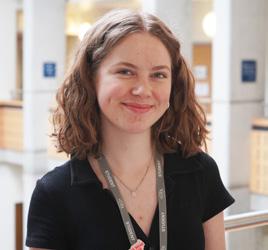
Languages
A LEVEL | 46 FIND OUT MORE
AS & A Level Two year course Entry requirements
Please see page 9 for general A Level guidance and check the course description on our website for exact entry requirements for this subject. You can also speak to our tutors at Open Events and Guidance Discussions for further information.

What will I study?
You will continue the development of skills from GCSE, learning the language in the context of French-speaking countries and the issues and influences which have shaped them.
Year One units include:
• Cyber Society: positive and negative aspects of new technologies
• A Culture Proud of its Heritage: tourism, historic monuments and the importance of food
• Cinema: history and government support for French cinema
Year Two units include:
• Life for the Marginalised: attitudes to poverty
• Demonstrations: industrial and political unrest
• Politics and Immigration: the history of immigration and aspects of racism and integration
You will also study a French language film in both years and a literary work in the second year. The second year also includes an independent research project, on a topic of your choice, related to an aspect of Francophone society or culture.
Good course combinations
Students can combine French successfully with the full range of A Levels.
Your next steps
Many students go on to a language-related degree, including new languages e.g. Mandarin or Arabic, or a language combined with another option. Possible careers include teaching, translation, journalism, publishing, and work in the tourism or financial sectors.
MORE ONLINE YORKCOLLEGE.AC.UK French 47 | LANGUAGES
AS & A Level
Two year course
Entry requirements
Please see page 9 for general A Level guidance and check the course description on our website for exact entry requirements for this subject. You can also speak to our tutors at Open Events and Guidance Discussions for further information.
What will I study?
You will continue the development of skills from GCSE, learning the language in the context of German-speaking countries and the issues and influences which have shaped them.
Year One units include:
Aspects of German Speaking Society
• Family: the changing state of the family
• Youth Culture: fashion, trends, music, television
Artistic Culture in the German Speaking World
• Festivals and Traditions: origins, importance, diversity
• Cultural Life in Berlin: history, music, museums
Year Two units include:
Multiculturalism in German Speaking Society
• Immigration: benefits and challenges
• Integration: measures and obstacles to integration
Aspects of Political Life in the German Speaking World
• Germany and the EU
• Politics and Youth
You will also study a German language film in both years and a literary work in the second year. The second year of the course also includes an independent research project, on a topic of your choice, related to an aspect of German language, society or culture.
Good course combinations
Students can combine German successfully with the full range of A Levels.
Your next steps
Many students go on to a language-related degree, including new languages e.g. Mandarin or Arabic, or a language combined with another option. Possible careers include teaching, translation, journalism, publishing, and work in the tourism or financial sectors.
AS & A Level
Two year course
Entry
requirements
Please see page 9 for general A Level guidance and check the course description on our website for exact entry requirements for this subject. You can also speak to our tutors at Open Events and Guidance Discussions for further information.
What will I study?
You will continue the development of skills from GCSE, learning the language in the context of Spanish-speaking countries and the issues and influences which have shaped them.
Year One units include:
Aspects of Hispanic Society
• Modern and Traditional Values: family changes
• Equal Rights: sexism and feminism, LGBTQ+ rights
Artistic Culture in the Hispanic World
• Modern Day Idols: musicians, TV and cinema stars
• Spanish Regional Identity: customs, gastronomy, languages spoken
Year Two units include:
Multiculturalism in Hispanic Society
• Immigration: positive and negative aspects
• Integration: different ways cultures integrate
Aspects of Political Life in the Hispanic World
• Monarchies, Republics and Dictatorships
• Popular Movements: protests and strikes
You will study a Spanish language film in both years and a literary work in the second year. The second year of the course also includes an independent research project, on a topic of your choice, related to an aspect of Spanish language, society or culture.
Good course combinations
Students can combine Spanish successfully with the full range of A Levels.
Your next steps
Many students go on to a language-related degree, including new languages e.g. Mandarin or Arabic, or a language combined with another option. Possible careers include teaching, translation, journalism, publishing, and work in the tourism or financial sectors.
yorkcollege.ac.uk
A LEVEL | 48
German
Spanish

MORE ONLINE YORKCOLLEGE.AC.UK 49 | LANGUAGES
Maths
I particularly enjoy the mechanics section of the course as it makes the maths very practical to real life and helps me in visualising where I can use these skills in the future.
Overall, I have had a really enjoyable experience at York College, I have been taught by very knowledgeable tutors who have great expertise in their subjects, making the learning environment very positive.

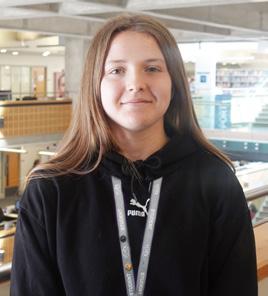
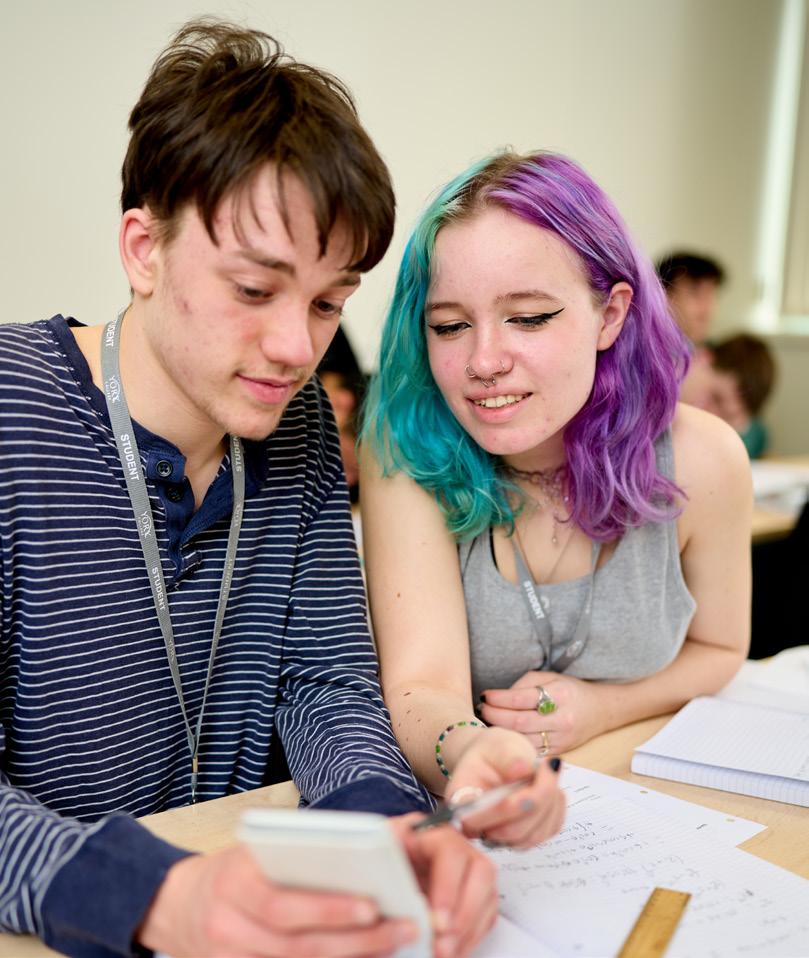
EVIE Mathematics A Level A LEVEL | 50 FIND OUT MORE
Two year course
Entry requirements
Please see page 9 for general A Level guidance and check the course description on our website for exact entry requirements for this subject. You can also speak to our tutors at Open Events and Guidance Discussions for further information.
What will I study?
You will continue to study some topics familiar to you from GCSE, such as algebra and trigonometry, and you will also be introduced to new ones like calculus. Your study of maths will be divided up into two areas, Pure Maths and Applied Maths.
Year One
There are two components of the course, containing 70% Pure Maths and 30% Applied Maths (Mechanics and Statistics):
Pure Mathematics
Units include proof, algebra, graphs, binomial expansions, trigonometry, logarithms, calculus and vectors.
Mechanics
Units in Mechanics include kinematics in one dimension, working with forces and Newton’s Laws.
Statistics
Units in Statistics include working with data from a sample to make inferences about a population, probability calculations, using binomial distribution as a model and statistical hypothesis testing.
Year Two
There are three components of the course:
Pure Mathematics with Mechanics
Units in Mechanics include kinematics, motion under gravity, working with forces, Newton’s Laws and simple moments.
Pure Mathematics with Statistics
Units in Statistics include working with data from a sample to make inferences about a population, probability calculations, using binomial and normal distributions as models and statistical hypothesis testing.
Pure Mathematics with a Comprehension
Units in Pure Mathematics are developed and students are given advice and practice in using their mathematical skills in unfamiliar contexts in the assessment.
University Entrance Exams
There will be informal support for students sitting university entrance exams such as STEP, AEA, TMUA or Oxford entrance papers.
Maths Challenge
Every year we encourage our maths students to test their maths in the National Maths Challenge.
Good course combinations
This course combines well with most other A Levels. Many students take Further Maths together with their AS Maths. This is a good combination supporting and extending your main qualification.
Your next steps
An A Level in Maths is helpful for many careers, especially in the areas of science, financial services, banking, accountancy and actuarial work. It is also a desirable qualification for many degrees and in some cases a necessary one, such as physics. Past students have been inspired to go on to read maths in its own right at top universities.
Core Maths
If you like maths but are unsure if AS Maths is right for you, Core Maths (Level 3 Certificate in Mathematical Studies) is a good alternative. This allows you to maintain and develop maths skills that you can apply to other subjects and everyday life.
See the Core Maths course on page 53 for more details.
AS
Mathematics
& A Level
51 | MATHS
Further MathEMATICS
AS & A Level
Two year course
Entry requirements
Please see page 9 for general A Level guidance and check the course description on our website for exact entry requirements for this subject. You can also speak to our tutors at Open Events and Guidance Discussions for further information.
What will I study?
Students will study the AS Level Further Maths specification but in general will not take the AS Level Further Maths exam at the end of the first year. They study three components; pure maths, mechanics and statistics.
Most students will progress to A Level Further Maths in the second year. There is also an option for second year students to take AS Level Further Maths.
Year One
Pure Mathematics
Units include complex numbers, matrices, vectors, planes and sequences.
Mechanics
Units include forces in equilibrium (including moments), friction, projectiles and Newton’s Laws of Motion.
Statistics
Units include probability distributions such as poisson, geometric and the normal distribution.
Year Two
All students study Pure Maths, with students opting for one major option in Applied Maths.
Option 1 Major in Mechanics, minor in Statistics
Option 2 Major in Statistics, minor in Mechanics
In the exam the major option carries twice the weight of the minor option.
Pure Mathematics
The Pure Maths part of the course develops the work of the first year and deals with topics that are often found on the first year of degree courses.
Mechanics
This gives students an opportunity to explore areas of particular interest at a much higher level. For instance, those taking the Major Mechanics option will study oscillations, circular motion and the application of differential equations to mechanics problems, making it ideal for students wanting to progress to a Physics or Engineering degree.
Statistics
The Major Statistics option includes bivariate data, chi squared tests, confidence intervals and simulation.
University Entrance Exams
There will be informal support for students sitting university entrance exams such as STEP, AEA, TMUA or Oxford entrance papers.
Maths Challenge
Every year we encourage our maths students to test their maths in the National Maths Challenge.
Good course combinations
You must take AS Maths (first year) or A Level Maths (second year) with Further Maths.
The Maths and Further Maths courses are taught separately in the first year and combined in the second year.
Maths and Further Maths combine well with all other A Levels. In addition to Further Maths, students study everything from Art to Science.
Your next steps
An A Level in Maths is helpful for many careers, especially in the areas of science, financial services, banking, accountancy and actuarial work. It is also a desirable qualification for many degrees and in some cases a necessary one, such as physics. Further maths study will provide you with a deeper understanding of maths and give you a head start on courses requiring maths at university. Past students have been inspired to go on to read maths in its own right at top universities.
yorkcollege.ac.uk
A LEVEL | 52
Certificate in mathematical studies Level 3
One year course (taken in your AS year)
Entry requirements
Please see page 9 for general A Level guidance and check the course description on our website for exact entry requirements for this subject. You can also speak to our tutors at Open Events and Guidance Discussions for further information.
What will I study?
This is a Level 3 Certificate in Mathematical Studies, equivalent to an AS Level in terms of UCAS points. Core Maths builds on GCSE Maths, focusing on problem-solving and interpretation of maths in the real world.

Units include:
• Statistics and Algebra
• Probability and Estimation
• Data Analysis and Modelling
• Sequences and Growth
• Financial Planning and Management
• Problem-Solving Approaches and Techniques
e.g. Linear Programming
• Using Technology and Spreadsheets
This equips students with practical and useful mathematics skills relevant to:
• Business needs: e.g. analysing and evaluating data, budget management, problem-solving approaches and financial calculations
• Everyday life requirements: e.g. preparing tax returns, applying for loans, general budgeting and managing household finances
Good course combinations
This course is particularly useful for students studying Economics, Psychology, Sociology, Business, Biology and Politics. Please note, this course is not suitable for students studying A Level Physics.
Your next steps
Core Maths is for students who need to be equipped for the mathematical and quantitative demands of other courses and employment, but it is also particularly relevant for those who need these skills to meet the demands of a range of courses in higher education.
MORE ONLINE YORKCOLLEGE.AC.UK
53 | MATHS
Core Maths
Media: Print, TV & Film
I think that film studies is a really fun subject. You get to watch and analyse films, dissecting them to figure out how they were put together and produced.
College tutors, whether a Progress Coach or subject tutor, are very approachable. I found that they support you and give you all the help they can, especially when applying to university.

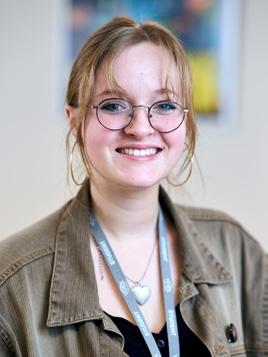
After College I’m going to university to study Costume Design and then hopefully become a costume designer for film, theatre and TV. Clare Film Studies A Level

A LEVEL | 54 FIND OUT MORE
Media Studies
Film Studies
AS & A Level
Two year course
Entry requirements
Please see page 9 for general A Level guidance and check the course description on our website for exact entry requirements for this subject. You can also speak to our tutors at Open Events and Guidance Discussions for further information.
What will I study?
Year One
Introduction to the key concepts and themes of Media Studies. You will explore the way we interact with the media, find out about companies/institutions that dominate the media industries, analyse the ways in which the media represents the world around us and learn about the techniques used to make media products, such as camera work, editing, layout and design. You will also explore the different media sectors.
Year Two
This builds on the knowledge you have developed in the first year and introduces you to some of the interesting theories that we use to understand the role of the media in society, culture, politics and economics.
Good course combinations
Film Studies, Sociology, Politics, Psychology, Photography, Textiles, Drama & Theatre Studies and English.
Your next steps
Media Studies gives you excellent analytical, technical and group-working skills, all of which are attractive to employers and universities. Students have gone on to study media, film, journalism, events management and marketing at university, giving them the practical skills and academic knowledge to work in the industry.
Two year course
Entry requirements
Please see page 9 for general A Level guidance and check the course description on our website for exact entry requirements for this subject. You can also speak to our tutors at Open Events and Guidance Discussions for further information.
What will I study?
Year One
You will have the opportunity to develop your appreciation and understanding of film as a dominant art form and as a vastly commercial venture. You will study camera work, editing, acting, set and costume design, lighting, story structure and genre in a variety of films. You will create your first film from pre-production to post-production.
Year Two
You will deepen your knowledge and appreciation of film by continuing your Hollywood and British film studies, but you will broaden your understanding beyond ‘mainstream’ cinema by developing your appreciation of global film, documentary film, silent film and experimental film. You will create your second film from script to screen, using industry standard equipment. Each year we also run a trip to Hollywood and experience the day to day work of the major studios.
Good course combinations
English, Sociology, Media Studies, Textiles, Photography, Drama & Theatre Studies and Psychology.
Your next steps
A Level Film Studies will help you to achieve a place on one of the film studies or film journalism degree courses in higher education, as well as industry work.
MORE ONLINE YORKCOLLEGE.AC.UK
AS & A Level
55 | MEDIA: PRINT, TV & FILM
Music
I chose Music Technology because I would like to be a producer in the future. I am really interested in music technology and music production. This course is perfect for me because it is creative, inventive and inspiring. I also love meeting people with the same interests.

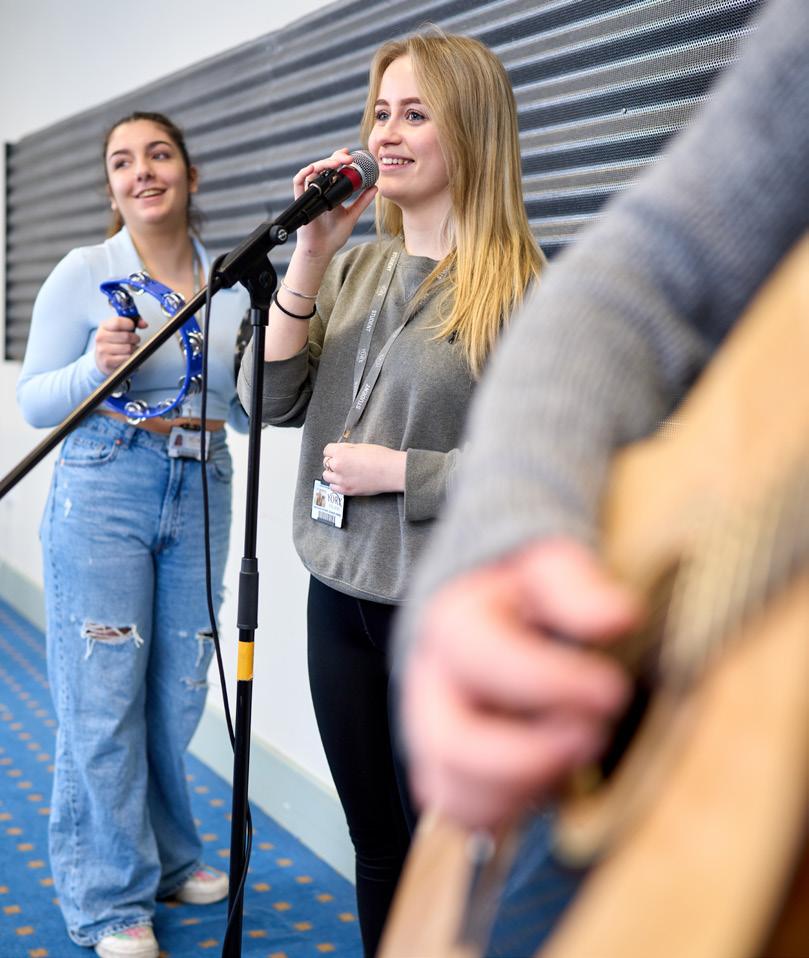
I really enjoy College. There is freedom so you feel much more independent, and you’re treated respectfully. I really enjoy my lessons and have nice connections with my tutors.
 Guy Music technology A Level
Guy Music technology A Level
A LEVEL | 56 FIND OUT MORE
Two year course
Entry requirements
Please see page 9 for general A Level guidance and check the course description on our website for exact entry requirements for this subject. You can also speak to our tutors at Open Events and Guidance Discussions for further information.
What will I study?
Year One
Performing – students will perform a 6-8 minute recital. Composition – students will demonstrate their ability to create and develop musical ideas by creating two compositions. One will be set to a brief and one to a brief written by the student.
Listening Exam – this is a written exam including aural extracts, covering six areas of study.
The exam will include the following elements:
• Analysing and Evaluating Music
• Familiar and Unfamiliar Pieces
• Prescribed Works
• Questions based on Aural Extracts
Year Two
The second year follows a similar pattern to the first year.
Good course combinations
This course combines well with Music Technology, Media Studies, Film Studies, Drama & Theatre Studies and Maths.
Your next steps
Music courses in higher education with students progressing to study at university and top conservatoires.
Two year course
Entry requirements
Please see page 9 for general A Level guidance and check the course description on our website for exact entry requirements for this subject. You can also speak to our tutors at Open Events and Guidance Discussions for further information.
What will I study?
The course follows several areas of study.
Main areas of focus
• Operating a professional recording studio and learning all associated techniques
• Capturing, producing and mixing recordings
• Sampling, synthesis and effects
• The principles of sound and audio technology
Good course combinations
This course combines well with Music, Maths, Physics, Media Studies, Film Studies and Drama & Theatre Studies.
Your next steps
Many students go on to university where they may study a wide range of music technology-based subjects and further specialise in their chosen area of the industry.
Employment possibilities include working in recording studios, in broadcasting (e.g. BBC), as a Composer for film and video games, working in the live entertainments industry and as a Freelance Musician.
MORE ONLINE YORKCOLLEGE.AC.UK
AS & A Level Music AS & A Level Music
57 | MUSIC
Technology
Performance & Production
My overall experience at York College has been impeccable. I find that everyone is very encouraging and supportive of one another. Tutors provide an ongoing line of support regarding work and stress management. I have received plentiful amounts of reassurance and help, and have also been encouraged on multiple occasions to strive towards high achieving goals that work for me. My hopes for the future are to study the dramatic arts at university or drama school.
 Millie Drama & Theatre Studies A Level
Millie Drama & Theatre Studies A Level


A LEVEL | 58 FIND OUT MORE
Drama & Theatre Studies
AS & A Level
Two year course
Entry requirements
Please see page 9 for general A Level guidance and check the course description on our website for exact entry requirements for this course. You can also speak to our tutors at Open Events and Guidance Discussions for further information.
What will I study?
The range of work will involve practical performance, devising and working from scripts, writing about theatre you have seen and plays you have read, and the theory and practice of practitioners, playwrights and directors.
Good course combinations
Drama & Theatre Studies complements a range of subjects including Music, Film Studies, Media Studies, English (Literature and Language), Law, Psychology, History and Sociology. It is useful in building confidence and improving team working and presentation skills for a range of careers.
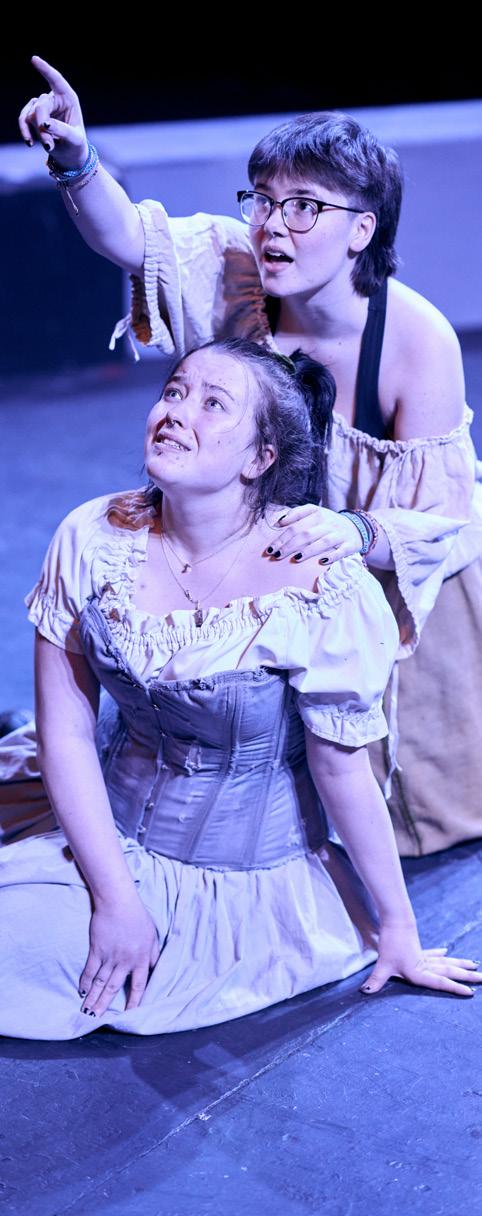
Your next steps
Drama & Theatre Studies can lead to further study in drama, theatre studies and performing arts in higher education at degree or HND level or drama school. It can be used as part of your course to broaden your studies and may lead on to a career in the performing arts industries. Several students have gone on to study at prestigious institutions such as Manchester Metropolitan University and LIPA.
MORE ONLINE YORKCOLLEGE.AC.UK
59 | PERFORMANCE & PRODUCTION
Science
I chose this course because it goes into depth in very interesting topics such as fossils, dinosaurs and deltas for example. After my A Levels I hope to take a Geology degree and then specialise in Volcanology.


Jacob Geology A Level

A LEVEL | 60 FIND OUT MORE
Two year course
Entry requirements
Please see page 9 for general A Level guidance and check the course description on our website for exact entry requirements for this subject. You can also speak to our tutors at Open Events and Guidance Discussions for further information.
What will I study?
This course allows you to develop practical skills and the conceptual knowledge of essential biological units. The course relates each topic to meaningful and interesting contexts, and you will develop crucial transferable skills such as competence in mathematical techniques and problem solving. There is an emphasis on practical skills taught in specialist biology labs that are well-equipped, allowing you to work in small groups or individually.
Year One units include:
• Development of practical skills in biology
• Cells, chemicals for life, transport and gas exchange
• Cell division, development and disease control
Year Two units include:
• Energy, reproduction and populations
• Genetics, control, and homeostasis
Good course combinations
Biology works well with most subjects, including Chemistry, Psychology and Physical Education.
Your next steps
Studying biology develops the biological knowledge to study a bioscience-related degree. You’ll gain a wealth of transferable skills such as problem solving, data analysis and teamwork that are valued in many degree programmes.
Past students have studied a range of courses including biology, chemistry and biochemistry, medicine, veterinary medicine, pharmacy, environmental science, geography, geology, physiotherapy, psychology, marine biology and sports studies.
Two year course
Entry requirements
Please see page 9 for general A Level guidance and check the course description on our website for exact entry requirements for this subject. You can also speak to our tutors at Open Events and Guidance Discussions for further information.
What will I study?
Chemistry builds on concepts taught at GCSE. The units are made interesting and relevant with an emphasis on real life chemistry.
Development of practical skills alongside the theoretical content helps you to gain a wider understanding of chemistry. You’ll have access to well-equipped specialist chemistry labs, allowing you to work in small groups or individually.
Year One units include:
• Elements of Life
• Developing Fuels
• Elements from the Sea
• The Ozone Story
• What’s in a Medicine
Year Two units include:
• The Chemical Industry
• Polymers and Life
• Oceans
• Developing Metals
• Colour by Design
Good course combinations
Chemistry works well with Biology, Physics and Maths.
Your next steps
Chemistry can lead to a variety of careers and higher education courses. It’s an essential requirement for entry into medicine, dentistry, pharmacy and veterinary science, as well as degrees based on chemistry itself. Chemistry is a useful subject for anyone wanting to do a biology-based degree.
AS & A Level Biology AS & A Level Chemistry 61 | SCIENCE
Two year course
Entry requirements
Please see page 9 for general A Level guidance and check the course description on our website for exact entry requirements for this subject. You can also speak to our tutors at Open Events and Guidance Discussions for further information.
What will I study?
Year One units include:
• Physical Geography and People and the Environment
• Water and Carbon Cycles
• Contemporary Urban Environments
• Changing Places
• Geography Fieldwork Investigation and Geographical Skills
Year Two units include:
• Water and Carbon Cycles
• Hot Desert Systems and Landscapes
• Hazards
• Global Systems and Global Governance
• Changing Places
• Contemporary Urban Environments
You will also take part in fieldwork and a residential trip in the first year and will undertake a geographical investigation in the second year.
Good course combinations
Geography will complement both science and humanities subjects.
Your next steps
Past students have gone on to study physical geography, human geography, environmental management and environmental science.
Two year course
Entry requirements
Please see page 9 for general A Level guidance and check the course description on our website for exact entry requirements for this subject. You can also speak to our tutors at Open Events and Guidance Discussions for further information.
What will I study?
Geology is ideal for anyone with an interest in the origin and structure of Earth. You’ll be taught about the Earth’s composition and internal processes by studying its geological history, and by analysing fossils and rock structure.
In the first year, there’s emphasis on learning about minerals, the three main groups of rocks, fossil formation, volcanic eruptions and geological time. In the second year you’ll expand your knowledge on the formation of rock types, engineering geology and mining, earthquakes and the evolution of life and climate on Earth.
Local field trips enable you to extend your learning. The course is taught in a purpose-built geology laboratory with access to a number of specimens that are used in lessons. The laboratory also houses a range of practical equipment.
Good course combinations
Geology works well with Geography and complements science and humanities subjects.
Your next steps
Many students find work in environment-based public service, planning, engineering, mining and quarrying, the oil and gas industries, conservation and heritage. Students have progressed to university to study geology or physical geography and into careers in the environment sector.
yorkcollege.ac.uk
AS & A Level
A LEVEL | 62
Geography AS & A Level Geology
AS & A Level Two year course Entry requirements
Please see page 9 for general A Level guidance and check the course description on our website for exact entry requirements for this subject. You can also speak to our tutors at Open Events and Guidance Discussions for further information.
What will I study?
Physics allows you to investigate and understand some of the fundamental laws of the universe, ranging from the tiniest particles of matter to vast star systems. First year units include simple electrical circuits, fundamental particles, quantum mechanics, waves and optics; as well as Newtonian mechanics, which deals with forces, motion, energy and power.
In the second year units include radioactivity and thermal physics. The additional topic is ‘Turning Points in Physics’ - this investigates some important experiments which helped to define our current knowledge of physics.
All the theoretical work is underpinned by regular practical work that enables you to improve your understanding of theory and develop practical skills. Lessons are taught in specialist laboratories with access to a range of equipment.

Good course combinations
In addition to Maths, Physics works well with Chemistry, Computer Science and Geology.
Your next steps
Together with Maths, Physics is essential if you wish to study physics or engineering-related courses and is highly desirable for many other courses including maths, computing, architecture and medicine. Physics graduates are highly employable and are sought after in fields such as technology, education, finance and commerce. Past students have gone on to university to study engineering, theoretical physics, astrophysics, computing, electronics, accounting, maths, medicine etc.
MORE ONLINE YORKCOLLEGE.AC.UK Physics 63 | SCIENCE
Sport
I really enjoy coming into PE, the atmosphere is always upbeat and the room is full of so many successful people in each of their sports. You learn so much from the course but also about different sports from first hand experiences of peers.


Ava
Physical Education A Level
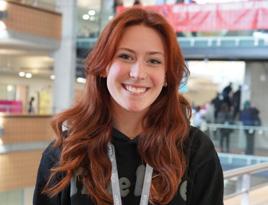
A LEVEL | 64
OUT MORE
FIND
Physical Education
AS & A Level Two year course Entry requirements
Please see page 9 for general A Level guidance and check the course description on our website for exact entry requirements for this subject. You can also speak to our tutors at Open Events and Guidance Discussions for further information. You must also play competitive sport and be able to evidence participation through practical video footage throughout the duration of the course.
What will I study?
• Factors Affecting Participation in Physical Activity and Sport
• Applied Anatomy and Physiology
• Exercise Physiology
• Biomechanical Movement
• Sport and Society and the Role of Technology in Physical Activity and Sport
Good course combinations
This course combines well with most other A Levels.
Your next steps
This course could lead to opportunities to study physical education, sport studies, sport science, physiotherapy, sports therapy, recreation and leisure studies, sports management and sports coaching. Sports-related qualifications help those wishing to work with people such as in teaching, leadership and coaching roles, as well as roles in the Police and the Armed Services. Past students have combined their academic and sporting pathways by taking up sport scholarships in the UK, Europe and America.

MORE ONLINE YORKCOLLEGE.AC.UK
65 | SPORT
Vocational & T Level
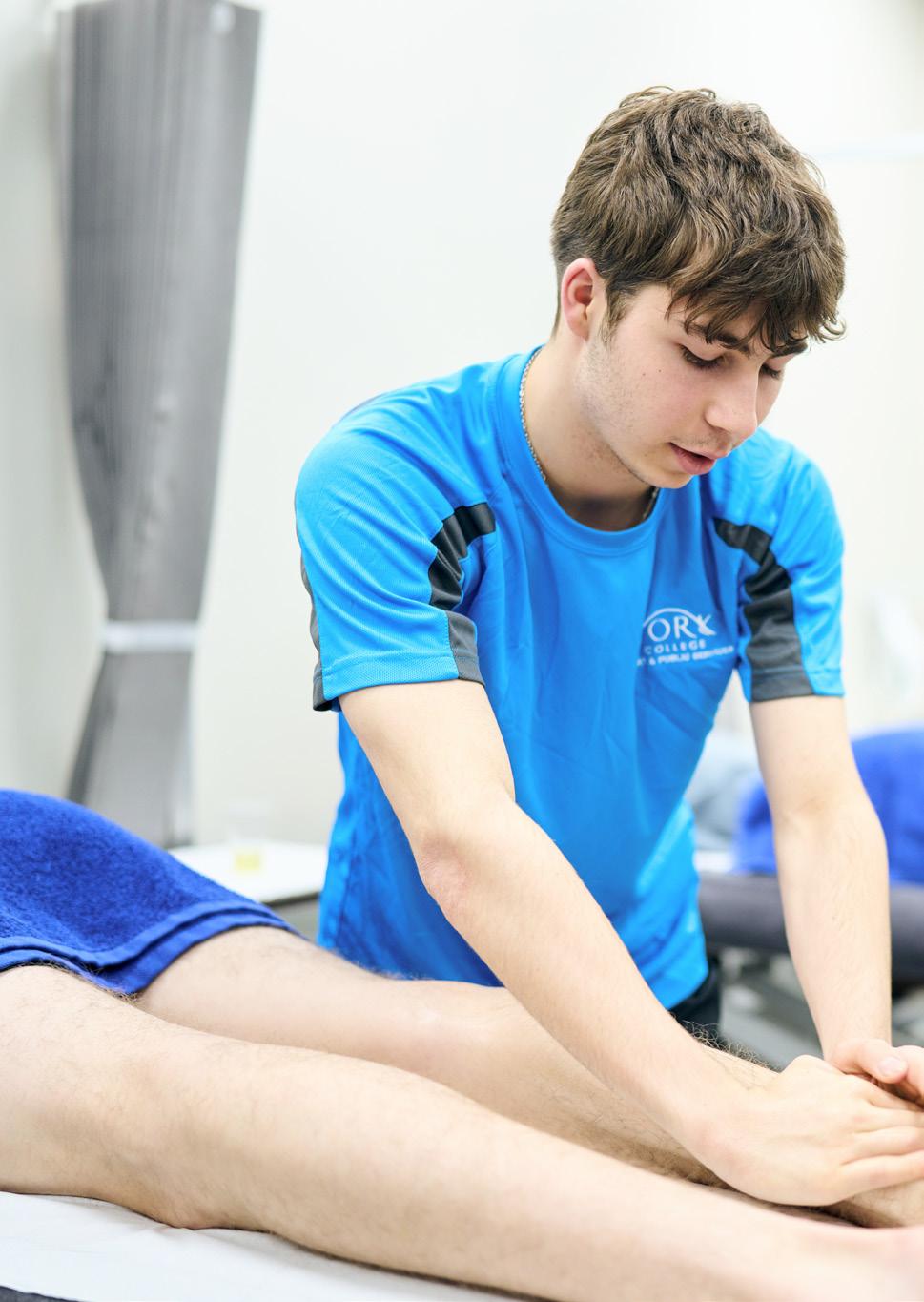
VOCATIONAL & T LEVEL | 66
A Different Way of Learning
At York College we have over 80 Vocational & T Level programmes on offer. These cover a range of vocational, professional and technical routes, so there is something to suit all aspirations and interests, and with programmes from Entry Level to Level 3, we have the right course for you, whatever your starting point.

Our Vocational programmes help students to prepare for employment or further study in a specific work sector and usually have a high level of practical content, much of which is assessed through written and practical assignments. In many cases work experience is a significant aspect of a programme of study. Vocational programmes are not an easy option though, and at York College we have very high expectations of our Vocational students. Whilst many students completing Level 3 Vocational programmes progress straight into employment, most go on to university to continue their studies.
T Levels are Level 3 courses that follow GCSEs and are equivalent to 3 A Levels. They combine classroom theory with exam assessment, practical learning and a significant work placement. The placement provides a fantastic opportunity to demonstrate and apply the knowledge and skills learnt in a real work situation. Developed in collaboration with employers and businesses they’re designed to meet the needs of industry and prepare students for work. T Levels will prepare you to progress into a skilled job, or you can choose further training such as a higher apprenticeship or degree.
67 | VOCATIONAL & T LEVEL
Course Directory VocationaL & T Level
VOCATIONAL & T LEVEL | 68 Building Services Engineering for Construction - Electrical Installation T Level (Level 3) • 86 Painting & Decorating Diploma Level 1 • 90 Painting & Decorating Technical Certificate/Diploma Level 2 • 90 Plumbing Diploma Level 2 • 88 Building Services Engineering for Construction - Plumbing T Level (Level 3) • 88 Stonemasonry Diploma Level 2 • 91 Digital Technologies Creative Computing, Media & Games Level 1 • 95 Computing & Games Development Level 2 • 95 Esports Diploma Level 2 • 96 Esports Extended Diploma Level 3 • 96 Computer Games Development Extended Diploma Level 3 • 98 Computing & the Digital Environment T Level (Level 3) • 98 Early Years & Education Introduction to Health, Social Care and Children’s & Young People’s Settings Diploma Level 1 • 119 Working with Children in Early Years & Primary Settings Certificate Level 2 • 101 Education & Early Years T Level (Level 3) • 101 Engineering Light Vehicle Maintenance Certificate/Diploma Level 1 • 103 Vehicle Fitting Principles Diploma Level 2 • 103 Art & Design Art & Design Diploma Level 1 • 73 Art & Design Diploma Level 2 • 74 Art & Design Applied General Extended Diploma Level 3 • 74 3D Design Applied General Extended Diploma Level 3 • 75 Fashion & Clothing Applied General Extended Diploma Level 3 • 76 Graphic Design Applied General Extended Diploma Level 3 • 76 Art & Design Foundation Diploma Post Level 3 • 77 Business & Tourism Business & Tourism Level 2 • 79 Business Extended Certificate Level 3 • 79 Leadership & Management T Level (Level 3) • 80 Travel & Tourism Foundation Diploma/Extended Diploma Level 3 • 80 Construction Construction Crafts Multiskill 83 Construction Skills Extended Certificate Entry Level 3 • 83 Construction Design, Surveying & Planning T Level (Level 3) • 92 Bricklaying Diploma Level 1 • 84 Bricklaying Technical Certificate/Diploma Level 2 • 84 Carpentry & Joinery Diploma Level 1 • 85 Carpentry & JoinerySite Carpentry Technical Certificate/Diploma Level 2 • 85 Electrical Installation (Electrician’s Course) Diploma Level 2 • 86 LEVEL 1 LEVEL 2 LEVEL 3 LEVEL 1 LEVEL 2 LEVEL 3

MORE ONLINE YORKCOLLEGE.AC.UK 69 | VOCATIONAL & T LEVEL Light Vehicle Maintenance & Repair Diploma Level 2 (Direct Entry) • 104 Light Vehicle Maintenance & Repair Diploma Level 3 • 104 Performing Engineering Operations (PEO) NVQ Level 2 • 106 Engineering & Technology Diploma Level 3 • 106 Advanced Manufacturing Engineering Certificate (Multiskill) Level 3 (Year One) • 108 Advanced Manufacturing Engineering Extended Diploma (Multiskill) Level 3 (Year Two) • 108 Engineering & Manufacturing: Design & Development T Level (Level 3) • 109 Hair & Beauty Introduction to the Beauty & Media (Make-up) Sector VRQ Certificate Level 1 (Foundation Learning) • 111 Hairdressing NVQ Certificate Level 1 • 114 Beauty Therapy VRQ Level 2 • 112 Beauty Therapy VRQ Diploma Level 3 • 112 Hairdressing VRQ Level 2 • 114 Hairdressing VRQ Level 3 • 115 Hair & Media Make-up Diploma Level 2 • 116 Theatrical, Special Effects, Hair & Media Make-up Diploma Level 3 • 116 Hair, Beauty & Barbering T Level (Level 3) • 117 LEVEL 1 LEVEL 2 LEVEL 3
VOCATIONAL & T LEVEL | 70 Performance & Production Performing & Production Arts Diploma Level 2 • 133 Performing & Production Arts (Acting) Extended Diploma Level 3 • 134 Performing & Production Arts (Dance & Musical Theatre) Extended Diploma Level 3 • 134 Performing & Production Arts (Backstage Arts) Extended Diploma Level 3 • 135 Science Applied Science Foundation/ Extended Diploma Level 3 • 137 Sport & Uniformed Services Fitness Instructing (Gym-Based Exercise) Certificate Level 2 • 139 Personal Training Certificate Level 3 • 139 Sport (Coaching) Diploma Level 2 • 140 Sports Coaching & Development Foundation Diploma/Extended Diploma Level 3 • 140 Sport & Exercise Science Extended Diploma Level 3 • 141 Uniformed Services Extended Certificate Level 2 • 142 Uniformed Protective Services Extended Diploma Level 3 • 142 LEVEL 1 LEVEL 2 LEVEL 3 Health & Social Care Introduction to Health, Social Care and Children’s & Young People’s Settings Diploma Level 1 • 119 Health & Social Care Extended Diploma Level 2 • 120 Health T Level (Level 3) • 120 Hospitality Introduction to the Hospitality Industry Foundation Learning • 123 Hospitality (Chef & Pâtisserie Chef) Level 2 • 123 Food & Beverage Supervision Level 3 • 124 Professional Cookery (Professional Chef/Pâtisserie) Level 3 • 124 Media: Print, TV & Film Creative Media Production & Technology Diploma Level 2 • 127 Creative Media Production Extended Diploma Level 3 • 127 Music Music Performance & Production Diploma Level 2 • 129 Music Performance & Production Extended Diploma Level 3 • 129 Pathways to Work & Independent Living Pathways to Work & Independent Living Programme • 130 LEVEL 1 LEVEL 2 LEVEL 3
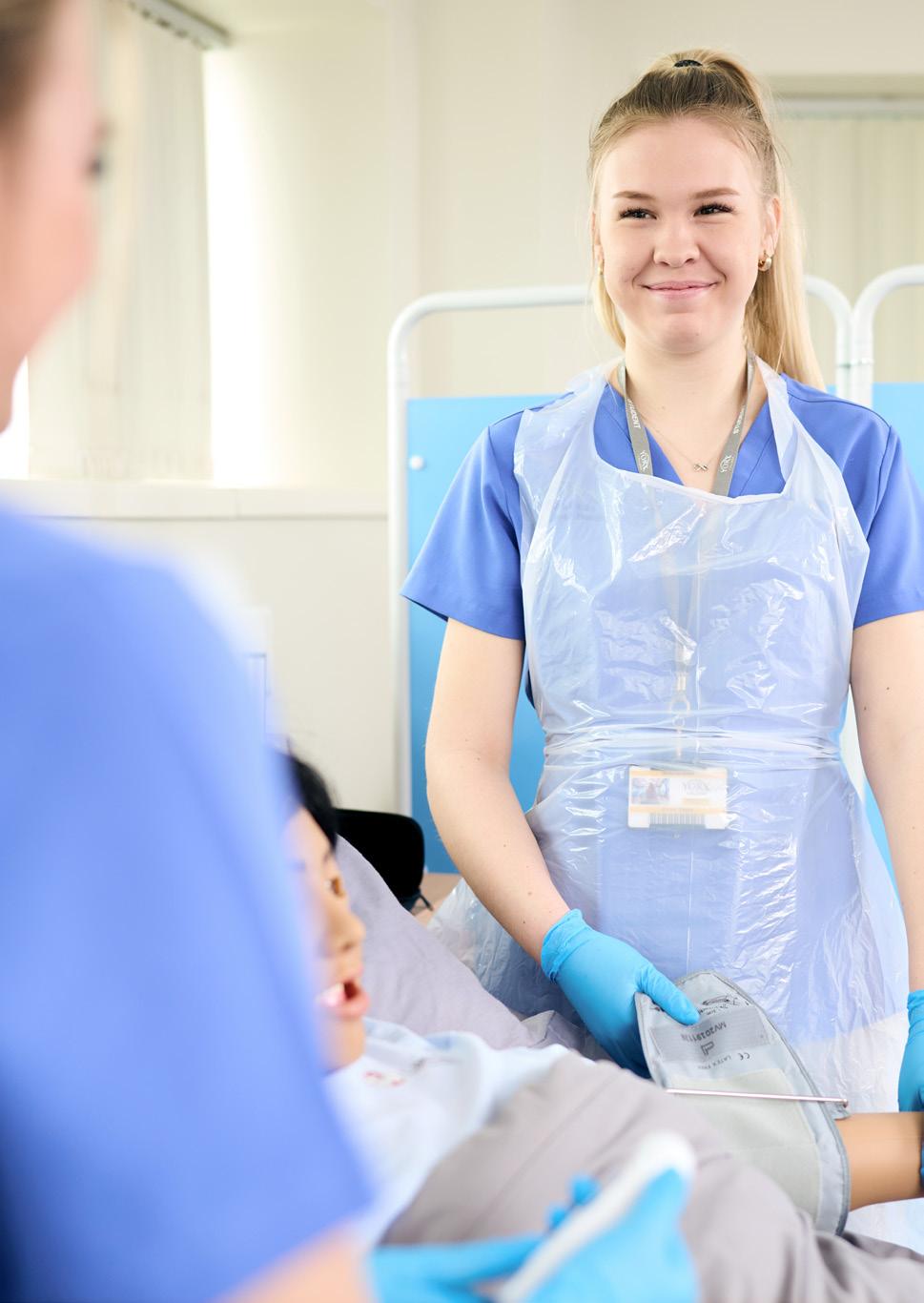
MORE ONLINE YORKCOLLEGE.AC.UK 71 | VOCATIONAL & T LEVEL
ART & Design
I’m studying 3D Design because I didn’t want to study an exam based subject and I like the idea of combining art and design.
The tutors are really friendly and helpful. I also get personalised and regular tutor feedback and discussion which helps me develop my skills. There are also a variety of extra curricular activities which provide a more enjoyable experience.



VOCATIONAL & T LEVEL | 72 FIND OUT MORE
Francesca 3D Design Extended Diploma Level 3
Diploma Level 1
One year course
Entry requirements
Please see page 9 for general Level 1 Vocational guidance and check the course description on our website for exact entry requirements for this course. You can also speak to our tutors at Open Events and Guidance Discussions for further information. You will be invited to show a portfolio of your art and design work at your guidance discussion.
What will I study?
The course involves the following areas: exploring drawing, painting, print techniques, 3D design craft and a personal project. You will experiment with a variety of art, design and craft media and techniques, and explore the work of other artists in a lively and exciting way. You will use your ideas for subjects such as painting, drawing, print, 3D and collage, and develop ideas for projects such as designing giftware and contemporary three-dimensional pieces, as well as an artist journal. At the end of the course your work will be exhibited in the Creative Show.
During the programme there are visits to galleries, museums or exhibitions to provide inspiration for your own work in art and design.
Your next steps
This course is a stepping stone towards a career in art and design. After this course you would apply for the Level 2 Diploma in Art and Design or another Level 2 course in the College or use your skills in employment.
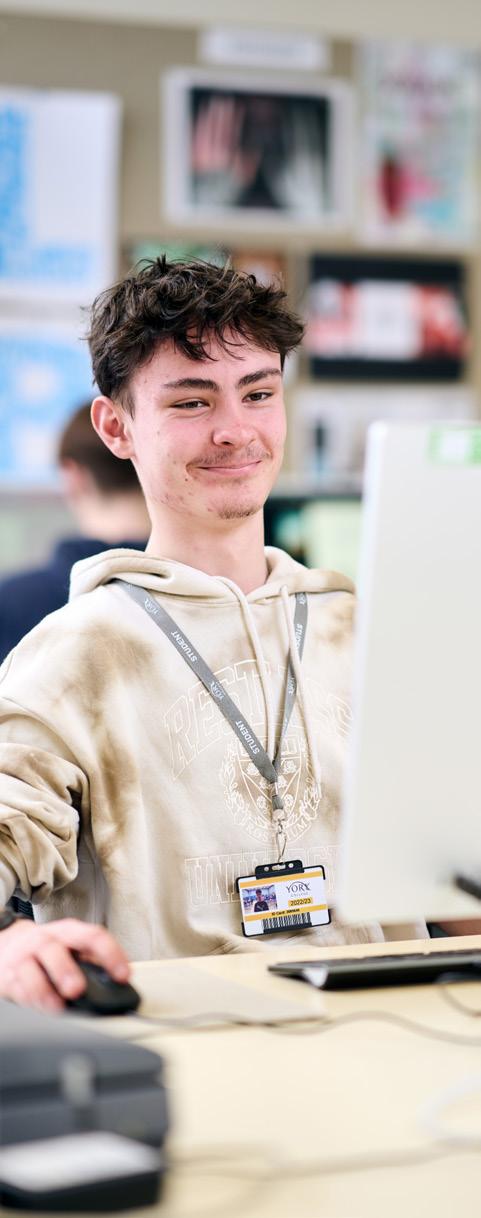
MORE ONLINE YORKCOLLEGE.AC.UK
&
73 | ART & DESIGN
ART
Design
ART & Design
Art & Design
Diploma Level 2
One year course Entry requirements
Please see page 9 for general Level 2 Vocational guidance and check the course description on our website for exact entry requirements for this course. You can also speak to our tutors at Open Events and Guidance Discussions for further information. You will be invited to show a portfolio of your art and design work at your guidance discussion.
What will I study?
The course involves working on projects in a rich variety of fields such as painting, drawing, graphics, sculpture, digital design and mixed media printmaking. Students work in an art and design studio and also spend time in the Apple Mac and mixed media studios, enjoying a very broad range of media that prepares them for the next stage of study. Students will research the work of artists and designers in a historical and contemporary context. There will be opportunities to go on educational visits that are linked to the course.
Your next steps
Students who achieve a Merit grade can progress to one of our Level 3 Extended Diplomas in Art & Design, Graphic Design, 3D Design or Fashion & Clothing. There may be the opportunity to go on to employment at assistant level in an art, design or craft-related profession.
Applied General Extended Diploma Level 3
Two year course
Entry requirements
Please see page 9 for general Level 3 Vocational guidance and check the course description on our website for exact entry requirements for this course. You can also speak to our tutors at Open Events and Guidance Discussions for further information. You will be invited to show a portfolio of your art and design work at your guidance discussion.
What will I study?
Students study a wide range of art and design activities before specialising in the second year in one of the key areas of fine art, graphics, illustration, photography, fashion, textiles and 3D design.
You will extend your art and design skills by working in printmaking workshops, photography studios, Apple Mac suites and 3D workshops. There are educational visits to galleries, workshops, museums, exhibitions and places of specific interest to extend your awareness of the wide range of contemporary creative activity. Art and design history is an integral part of the course and supports students’ work.
At the end of the course students will work on a Personal Project in a specialist area, which will be exhibited in the Creative Show.
Your next steps
This course can lead to a wide range of specific Art and Design degree programmes at universities and colleges within the UK, related to the areas of graphics, illustration, 3D design, fine art, fashion and textiles including our own degree courses at York College. Past students have successfully completed creative degrees at University of the Arts London, Goldsmiths, Northumbria University, Manchester Metropolitan University and Glasgow School of Art.
yorkcollege.ac.uk
VOCATIONAL & T LEVEL | 74
Applied General Extended Diploma Level 3
Two year course
Entry requirements
Please see page 9 for general Level 3 Vocational guidance and check the course description on our website for exact entry requirements for this course. You can also speak to our tutors at Open Events and Guidance Discussions for further information. You will be invited to show a portfolio of your art and design work at your guidance discussion.
What will I study?
You will be introduced to a variety of processes and techniques in wood and heavy metal, ceramics and glass, mixed media, fine metal, and jewellery. During the course you will work in sketchbooks, learning how to research, design and develop creative outcomes in response to a brief. Alongside your sketchbook, you will spend time in the workshops, exploring and developing skills with materials, techniques, and processes to produce 3D outcomes that are professionally finished and well presented. You will have the opportunity to work on live projects with links to industry and at the end of the course you will work on a Personal Project which will be exhibited in the Creative Show.
Your next steps
You can go directly into employment or continue to higher education. Degree courses might include the BA (Hons) 3D Creative Practice at York College as well as 3D design, product design, architecture, interior design, jewellery design and production, theatre/set design, model making, ceramic and glass design, furniture and product design, game design/animation.
Past students have successfully completed creative degrees at Northumbria University, Sheffield Hallam University, Manchester Metropolitan University, Birmingham University and York College, as well as other prestigious universities across the UK.

MORE ONLINE YORKCOLLEGE.AC.UK
3D Design 75 | ART & DESIGN
Fashion & Clothing
Graphic Design VOCATIONAL
Applied General Extended Diploma Level 3
Applied General Extended Diploma Level 3
Two year course
Entry requirements
Please see page 9 for general Level 3 Vocational guidance and check the course description on our website for exact entry requirements for this course. You can also speak to our tutors at Open Events and Guidance Discussions for further information. You will be invited to show a portfolio of your art and design work at your guidance discussion.
What will I study?
This course covers a wide range of themes specialising in all visual and technical aspects of fashion. Specialist taught skills include fashion illustration, pattern cutting, Computer Aided Drawing (CAD), garment construction and all aspects of fashion. There are also real-life projects, competitions and opportunities to work with professionals culminating in a Final Major Project which is exhibited at the end of year Fashion Show/Creative Show.
Your next steps
Students go into a diverse range of careers within the realms of fashion in the creative industries. Progression on to degree courses include fashion design, buying and merchandising, design/production/marketing, fashion promotion/styling/imaging and fashion communication.
Students have progressed on to the York College degree in Fashion Design & Garment Technology, as well as to courses throughout the UK. Past students have successfully completed degrees in Fashion at Northumbria University, Manchester Metropolitan University and London College of Fashion.
Two year course
Entry requirements
Please see page 9 for general Level 3 Vocational guidance and check the course description on our website for exact entry requirements for this course. You can also speak to our tutors at Open Events and Guidance Discussions for further information. You will be invited to show a portfolio of your art and design work at your guidance discussion.
What will I study?
This is an exciting course made up of inspirational projects which integrate many different approaches to graphic design. There are live briefs set by companies and industry professionals and workshops which will teach you a wide range of graphic design skills.
You will experience a variety of new graphic art and design media techniques in order to broaden your own visual experience in areas including graphics, printmaking, illustration, digital imaging, animation, typography, drawing and layout. You may work on magazines, animation, adverts, posters, flyers, book covers, stationery and packaging. At the end of the course you will work on a Personal Project which will be exhibited in the Creative Show.
Your next steps
Students have gone to universities to study graphic design, illustration, printmaking, graphic arts, computer games design, animation and interactive media.
Past students have successfully completed creative degrees at Northumbria University, Brighton University, Edinburgh College of Art, Middlesex University, Nottingham Trent University, Leeds Arts University, Liverpool John Moores University and York College. Students also choose to go straight into industry building on opportunities presented through live projects.
yorkcollege.ac.uk
& T LEVEL | 76
Art & Design
Foundation Diploma Post Level 3
One year course
Entry requirements
To gain entry on to this pre-degree course you will have a minimum of one A Level and 6 GCSEs at grade 4 or above, or equivalent level of qualification such as a Level 3 Extended Diploma. If you do not have the normal entry qualifications, you may gain entry on to the course with appropriate experience or a mixture of work experience and the ability to demonstrate competence in art and design. You will be invited to show a portfolio of recent art and design work at your guidance discussion.
What will I study?
This course is delivered in three distinctive stages: Diagnostic Investigation, Developing Specialist Practice and Consolidating Practice. You will experience a number of different art and design areas before choosing a specialism from areas such as: fine art, fashion and textiles, graphic design and illustration, and 3D design, which you will study in much greater depth leading towards a celebratory exhibition at the end of the year.
Your next steps
You will work with tutors to help you focus on your strengths and to develop an individual and focused portfolio of work. A wide range of progression opportunities are achieved with students studying degree courses in fashion, textiles, fine art, illustration, photography, graphic design and 3D design. Past students have successfully gained places at top creative universities such as Central Saint Martins, London College of Fashion, The Ruskin School of Art, University of Cambridge and Edinburgh College of Art.

MORE ONLINE YORKCOLLEGE.AC.UK 77 | ART & DESIGN
Business & Tourism
This course was best suited to me as I am interested in running my own business in the future. The work is challenging but enjoyable and I have learnt more about work through my industry placement.
I like that I’ve met people on my course with similar interests, but also with different skills that you can learn from when we work together. The tutors are nice and I like that we are treated and respected like adults.

 Noah Management & Administration T Level
Noah Management & Administration T Level

VOCATIONAL & T LEVEL | 78 FIND OUT MORE
2
One year course Entry requirements
Please see page 9 for general Vocational guidance and check the course description on our website for exact entry requirements for this subject. You can also speak to our tutors at Open Events and Guidance Discussions for further information.
What will I study?
This qualification is an introduction to the world of business and the travel and tourism industry. You will develop an understanding of the essential skills required to work successfully in these environments and an understanding of business culture and responsibilities. The qualification allows you to develop the skills required to solve problems, communicate and work effectively with others, and gives you the opportunity to learn how to manage and improve your own performance in a working environment.
Units covered include:
• Customer Service
• Introduction to Business
• Marketing
• The Travel & Tourism Industry
• Travel Agency Operations
• Plan, Develop & Participate in a Business or Tourism Project
Your next steps
On completion you may progress into employment within the business, retail, hospitality, visitor or tourism sector or progress to higher studies at Level 3 in either Business or Travel & Tourism. Alternatively, you could progress on to an apprenticeship.
Extended certificate Level 3
One year course Entry requirements
Please see page 9 for general Vocational guidance and check the course description on our website for exact entry requirements for this subject. You can also speak to our tutors at Open Events and Guidance Discussions for further information.
What will I study?
This qualification will help you develop a core understanding of the skills required to work in business and provide you with the foundations of business culture and responsibilities.
This programme will prepare you to work in a business environment by developing your skills in communication, problem solving, work efficiency and managing your own performance in a business setting. This qualification is equivalent to one AS Level.
Units studied include:
• Exploring Business
• Business & Personal Finance
• Marketing
• Managing an Event
You will also study GCSE English or Maths if you have not yet achieved a grade 4 in one of these.
Your next steps
You could progress on to the T Level in Leadership & Management; a Higher National Certificate/Diploma in Business or International Tourism Management or a Business Management degree at York College or other universities; advanced/higher apprenticeships.
Level
Business & Tourism
79 | BUSINESS & TOURISM
Business
Leadership & Management
T Level (Level 3)
TRAVEL & TOURISM
Two year course
Entry requirements
Please see page 9 for general T Level guidance and check the course description on our website for exact entry requirements for this subject. You can also speak to our tutors at Open Events and Guidance Discussions for further information.
What will I study?
This qualification provides classroom theory, practical learning and 315 hours industry placement with an employer. The breadth of content will ensure you can apply your skills for different purposes and in different roles. The classroom-based element of the course consists of two components:
Core Content
Providing the knowledge that underpins the industry with units including:
• Business Context
• Quality and Compliance
• Finance
• Project and Change Management
Occupational Specialisms
These ensure you develop the knowledge and skills necessary to achieve a level of competence needed to enter employment in the occupational specialism.
Content includes:
• Business Improvement
• Team Leadership/Management
• Business Support
• Information Management
Industry Placement
This allows you to develop your subject specific skills as well as those necessary to working in any environment.
Your next steps
This technical qualification will support you on to a range of progression routes including employment, higher education and higher apprenticeships. Career paths include Operations Manager, HR Professional, Marketing Manager and Project/Events Manager.
Foundation Diploma/Extended Diploma Level 3
One and two year courses
Entry requirements
Please see page 9 for general Vocational guidance and check the course description on our website for exact entry requirements for this subject. You can also speak to our tutors at Open Events and Guidance Discussions for further information.
What will I study?
You will develop your skills in problem solving, customer care, teamwork and product development and examine some of the major tourism trends within the industry. You will also have the opportunity to develop your employability skills through a work placement in the sector.
This qualification covers units such as:
• The UK Travel and Tourism Industry
• The UK Conference and Event Industry
• Tour Guiding
• Travel Agency Operations
• Airline Cabin Crew
• Specialist Tourism
In addition, trips and visits are organised across the year to enhance students’ learning and support the units being studied. Costs for these visits are additional and cover a range of destinations.
Your next steps
Higher National Diploma in International Tourism Management or Business, a BA (Hons) Degree in Business with Management or a higher apprenticeship at York College or another university, or other higher education tourism, business, events or hospitality management qualifications. Alternatively, employment and apprenticeship opportunities across the tourism sector.
yorkcollege.ac.uk
VOCATIONAL & T LEVEL | 80

MORE ONLINE YORKCOLLEGE.AC.UK 81 | BUSINESS & TOURISM
CONSTRUCTION
I enjoy this course because I like doing physical work and bricklaying is a good trade to get in to.
I’ve enjoyed building walls and learning new skills. The tutors are really helpful and I plan to move on to the next level bricklaying course and then work in the industry.
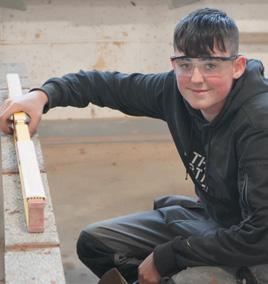

Kiaran Construction Skills
Extended Certificate Entry Level 3

VOCATIONAL & T LEVEL | 82 FIND OUT MORE
CONSTRUCTION CRAFTS MULTISKILL
Extended certificate ENTRY Level 3
5 week non-qualification
Entry requirements
Please see page 9 for general Vocational guidance and check the course description on our website for exact entry requirements for this subject. You can also speak to our tutors at Open Events and Guidance Discussions for further information.
What will I study?
This course is suitable if you want to progress into a career within the construction industry as a General Operative, or to progress on to the various craft courses delivered by the College. It will prepare you for employment and look at core work skills required.
The course covers a range of hand-skills, practical tasks and theory lessons in the following trade areas:
• Bricklaying
• Carpentry and joinery
• Painting and decorating
To be successful on this course, you need to have the ability to work well in a team, outstanding commitment and enthusiasm, and outstanding attendance and punctuality.
Your next steps
On successful completion of this course, you can progress on to a programme in one of the following trade areas:
• Bricklaying
• Carpentry and joinery
• Painting and decorating
One year course
Entry requirements
Please see page 9 for general Vocational guidance and check the course description on our website for exact entry requirements for this subject. You can also speak to our tutors at Open Events and Guidance Discussions for further information.
What will I study?
This course is suitable if you want to progress into a career within the construction industry as a General Operative, or to progress on to the various craft courses delivered by the College. It will prepare you for employment and look at core work skills required.
The qualification covers a range of hand-skills, practical tasks and theory lessons in the following trade areas:
• Bricklaying
• Carpentry and joinery
• Painting and decorating
To be successful on this course, you need to have the ability to work well in a team, outstanding commitment and enthusiasm, and outstanding attendance and punctuality.
Your next steps
On successful completion of this course, you can progress on to a Level 1 Diploma in one of the following trade areas:
• Bricklaying
• Carpentry and joinery
• Painting and decorating
83 | CONSTRUCTION
CONSTRUCTION SKILLS
One year course
Entry requirements
Please see page 9 for general Vocational guidance and check the course description on our website for exact entry requirements for this subject. You can also speak to our tutors at Open Events and Guidance Discussions for further information.
What will I study?
This course is a practical, hands-on course that will teach you the foundations of bricklaying and allow you to learn, develop and practise the skills required for employment. To be successful on this course, you need to have outstanding commitment and enthusiasm, a willingness to work as part of a team, and outstanding attendance and punctuality.
You will gain experience in:
• Principles of Building Construction, Information and Communication
• Contribute to Setting Out and Building of Masonry Structures up to Damp Proof Course
• Carrying Out Block Laying Activities
• Carrying Out Bricklaying Activities
• Health, Safety and Welfare in Construction
Your next steps
On completion of this course, you can progress on to the next level where appropriate or go on to find employment in order to transfer to an apprenticeship, then higher-level courses in construction.
One year course
Entry requirements
Please see page 9 for general Vocational guidance and check the course description on our website for exact entry requirements for this subject. You can also speak to our tutors at Open Events and Guidance Discussions for further information. You can also progress from the Bricklaying Diploma Level 1.
What will I study?
This course is a practical, hands-on course that teaches a variety of bricklaying skills and allows you to learn, develop and practise these skills required for employment. To be successful on this course, you need to have outstanding commitment and enthusiasm, a willingness to work as part of a team, and outstanding attendance and punctuality.
Units include:
• Principles of Construction
• Building Cavity Walls
• Building Solid Walls and Piers
• Constructing Basic Arches
• Setting Out Buildings
Your next steps
This qualification will allow you to progress into employment or on to an apprenticeship in Bricklaying. Some of our students then go on to higher-level courses in construction.
yorkcollege.ac.uk
Level 1 BRICKLAYING Technical certificate/diploma level 2 BRICKLAYING VOCATIONAL & T LEVEL | 84
Diploma
CARPENTRY & JOINERY
DIPLOMA LEVEL 1
One year course Entry requirements
Please see page 9 for general Vocational guidance and check the course description on our website for exact entry requirements for this subject. You can also speak to our tutors at Open Events and Guidance Discussions for further information.
What will I study?
This course is a practical, hands-on course that will teach you the foundations of carpentry and joinery and allow you to learn, develop and practise the skills required for employment. To be successful on this course, you need to have outstanding commitment and enthusiasm, a willingness to work as part of a team, and outstanding attendance and punctuality.
Units include:
• Principles of Building Construction, Information and Communication
• Maintain and Use Carpentry and Joinery Portable Hand Tools
• Prepare and Use Carpentry and Joinery Portable Power Tools
• Produce Woodworking Joints
• Health, Safety and Welfare in Construction
Your next steps
On completion of the Diploma, you can progress on to the next level where appropriate or go on to find employment in order to transfer to an apprenticeship, then higher-level courses in construction.
One year course Entry requirements
LEVEL 2
Please see page 9 for general Vocational guidance and check the course description on our website for exact entry requirements for this subject. You can also speak to our tutors at Open Events and Guidance Discussions for further information. You can also progress from the Carpentry & Joinery Diploma Level 1.
What will I study?
This course is a practical, hands-on course that teaches a variety of carpentry and joinery skills and allows you to learn, develop and practise these skills required for employment. To be successful on this course, you need to have outstanding commitment and enthusiasm, a willingness to work as part of a team, and outstanding attendance and punctuality.
Units include:
• Principles of Construction
• Structural Carpentry
• Non-structural Carpentry First Fix Prior to Plastering
• Non-structural Carpentry Second Fixing Following Plastering
• Timber Technology and the Use of the Circular Saw
Your next steps
This qualification will allow you to progress into employment or on to an apprenticeship in Carpentry & Joinery. Some of our students then go on to higher-level courses in construction.
85 | CONSTRUCTION
TECHNICAL CERTIFICATE/DIPLOMA
CARPENTRY & JOINERY - SITE CARPENTRY
ELECTRICAL INSTALLATION (ELECTRICIAN’S COURSE)
Diploma Level 2
BUILDING SERVICES
ENGINEERING FOR CONSTRUCTIONELECTRICAL INSTALLATION
T Level (Level 3)
One year course
Entry requirements
Please see page 9 for general Vocational guidance and check the course description on our website for exact entry requirements for this subject. You can also speak to our tutors at Open Events and Guidance Discussions for further information.
What will I study?
This course is a practical, hands-on course that teaches a variety of electrical installation skills and allows you to learn, develop and practise these skills required for employment. To be successful on this course, you need to have outstanding commitment and willingness to learn, the ability to succeed, and outstanding attendance and punctuality.
Units include:
• Working Effectively and Safely as an Electrician
• Principles of Electrical Installation which includes Basic Mechanics (Resistance, Voltage, Amps), Magnetism and Transformers, AC and DC Supplies, Electrical Circuits, and Methods of Wiring and Earth Bonding Requirements
• Principles of Electrical Machines (AC/DC Machines)
• Electrical Installation to Buildings and Structures which includes Wiring Systems, Cable Calculations, Fire Alarms and Security Systems, and Inspection and Testing of Systems
You will also study GCSE English or Maths if you have not yet achieved a grade 4 in one of these.
Your next steps
On completion of this Diploma, you can progress on to the next level or go on to find employment in order to transfer to an apprenticeship, and then on to higher-level courses in construction.
Two year course
Entry requirements
Please see page 9 for general T Level guidance and check the course description on our website for exact entry requirements for this subject. You can also speak to our tutors at Open Events and Guidance Discussions for further information.
What will I study?
This qualification is a combination of classroom theory, practical learning and industry placement (work placement) with an employer. It is for students who want to work as electricians in the building services engineering sector. Please note that this qualification does not make candidates fully qualified electricians or electrical installation engineers. To become fully qualified you must achieve the Level 3 Apprenticeship.
The Technical Qualification is the main classroom-based element of the course and consists of two components:
Core Content
This will develop the core skills you will need to apply when working within the industry.
Units will include:
• Health and Safety
• Science Principles
• Design Principles
• Construction and the Built Environment
• Sustainability
• Measurement
• Building Technology
• Information and Data
• Relationship Management
• Digital Technology
yorkcollege.ac.uk
VOCATIONAL &
LEVEL | 86
T
• Commercial Business
• Building Services Engineering Systems
• Maintenance
• Tools, Equipment and Materials
Occupational Specialisms
These develop the knowledge, skills and behaviours necessary to achieve threshold competence to enable you to enter the occupation and industry. You must also demonstrate the ability to achieve occupational competence over time with the correct support and training.

The Occupational Specialism route is Electrotechnical Engineering (Electrical Installation).
Industry Placement
The 45 day industry placement allows you to develop your occupational specialism skills as well as those necessary to working in any environment, such as effective planning, working with others, health and safety and promoting equality and diversity.
Your next steps
You may progress into employment, an apprenticeship, higher apprenticeship or higher-level of study, including university.
MORE ONLINE YORKCOLLEGE.AC.UK 87 | CONSTRUCTION
PLUMBING
One year course
Entry requirements
Please see page 9 for general Vocational guidance and check the course description on our website for exact entry requirements for this subject. You can also speak to our tutors at Open Events and Guidance Discussions for further information.
What will I study?
This course is a practical, hands-on course that teaches a variety of plumbing skills and allows you to learn, develop and practise these skills required for employment. To be successful on this course, you need to have outstanding commitment and enthusiasm, a good eye for detail and outstanding attendance and punctuality.
Units include:
• Safety in Plumbing Activities
• Principles of Plumbing
• Hot and Cold Water Systems for Housing
• Sanitation (Bathroom and WCs)
• Central Heating Systems
• Electrical Supplies to Heating Controls
• Lead Work (Waterproofing to Roofs)
• Environmental Awareness
• Effective Working Relationships
Your next steps
On completion of this Diploma, you can progress on to the next level or go on to find employment in order to transfer to an apprenticeship, and then on to higher-level courses in construction.
BUILDING SERVICES ENGINEERING FOR CONSTRUCTIONPLUMBING
Two year course
Entry requirements
Please see page 9 for general T Level guidance and check the course description on our website for exact entry requirements for this subject. You can also speak to our tutors at Open Events and Guidance Discussions for further information.
What will I study?
The T Level qualification has been designed to combine classroom theory, practical learning and industry placement with an employer to ensure that students have the knowledge and skills to progress into skilled employment or relevant higher-level training. This course is for students who want to work as plumbers in the building services engineering sector. Please note that this qualification does not make candidates fully qualified plumbers or plumbing and heating engineers. To become fully qualified you must achieve the Level 3 Apprenticeship.
The Technical Qualification is the main classroom-based element of the course and consists of two components:
Core Content
This will develop the core skills you will need to apply when working within the industry.
Units will include:
• Health and Safety
• Science Principles
• Design Principles
• Construction and the Built Environment
• Sustainability
• Measurement
• Building Technology
• Information and Data
yorkcollege.ac.uk
Diploma Level 2
T Level (Level 3)
VOCATIONAL & T LEVEL | 88
• Relationship Management
• Digital Technology
• Commercial Business
• Building Services Engineering Systems
• Maintenance
• Tools, Equipment and Materials
Occupational Specialism
These develop the knowledge, skills and behaviours necessary to achieve threshold competence to enable you to enter the occupation and industry. You must also demonstrate the ability to achieve occupational competence over time with the correct support and training.
The Occupational Specialism route is Plumbing and Heating Engineer.

Industry Placement
The 45 day industry placement allows you to develop your occupational specialism skills as well as those necessary to working in any environment, such as effective planning, working with others, health and safety and promoting equality and diversity.
Your next steps
You may progress into employment, an apprenticeship, higher apprenticeship or higher-level of study, including university.
MORE ONLINE YORKCOLLEGE.AC.UK 89 | CONSTRUCTION
PAINTING & DECORATING
PAINTING & DECORATING
Diploma Level 1
One year course
Entry requirements
Please see page 9 for general Vocational guidance and check the course description on our website for exact entry requirements for this subject. You can also speak to our tutors at Open Events and Guidance Discussions for further information.
What will I study?
This course is a practical, hands-on course that will teach you the foundations of painting and decorating and allow you to learn, develop and practise the skills required for employment. To be successful on this course, you need to have outstanding commitment and enthusiasm, a good eye for detail and outstanding attendance and punctuality.
Units include:
• Principles of Building Construction, Information and Communication
• Erecting and Dismantling Access Equipment and Working Platforms
• Preparing Surfaces for Decoration
• Applying Paint Systems by Brush and Roller to Non-complex Areas
• Applying Foundation and Plain Papers
• Producing Specialist Decorative Finishes
• Health, Safety and Welfare in Construction
Your next steps
On completion, you can progress on to the next level where appropriate or go on to find employment in order to transfer to an apprenticeship. Some of our students then go on to higher-level courses in construction.
TECHNICAL CERTIFICATE/DIPLOMA LEVEL 2
One year course
Entry requirements
Please see page 9 for general Vocational guidance and check the course description on our website for exact entry requirements for this subject. You can also speak to our tutors at Open Events and Guidance Discussions for further information. You can also progress from the Painting & Decorating Diploma Level 1.
What will I study?
This course is a practical, hands-on course that teaches a variety of painting and decorating skills and allows you to learn, develop and practise these skills required for employment. To be successful on this course, you need to have outstanding commitment and enthusiasm, a good eye for detail and outstanding attendance and punctuality.
Units include:
• Principles of Construction
• Access Equipment
• Preparation of Surfaces for Decoration
• Application of Surface Coatings
• Application of Papers to Walls and Ceilings
• Producing Decorative Colour Effects
Your next steps
This qualification will allow you to progress into employment or on to an apprenticeship in Painting & Decorating. Some of our students then go on to higher-level courses in construction.
yorkcollege.ac.uk
VOCATIONAL & T LEVEL | 90
DIPLOMA LEVEL 2
One year course
Entry requirements
Please see page 9 for general Vocational guidance and check the course description on our website for exact entry requirements for this subject. You can also speak to our tutors at Open Events and Guidance Discussions for further information.
What will I study?
This course is a practical, hands-on course that teaches a variety of stonemasonry skills and allows you to learn, develop and practise these skills required for employment. To be successful on this course, you need to have outstanding commitment and enthusiasm, willingness to learn a new skill and outstanding attendance and punctuality.
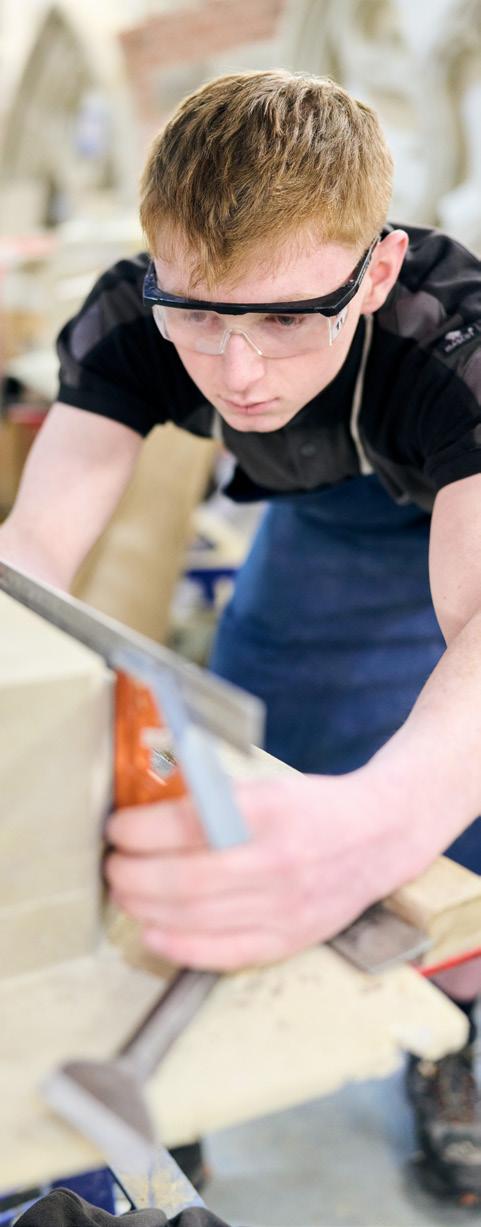
Units include:
• Cutting Templates to Form Geometric Shapes
• Setting Out and Shaping Stone by Traditional and Modern Power-assisted Methods
• Stone-cutting Skills including Squaring, Surface Finished and Straight Mouldings
• Produce Circular Moulds, e.g. Scroll Work and Ornate Carvings
• Health and Safety
Your next steps
On completion of the Diploma, you should aim to go on to find employment in order to transfer to an apprenticeship, then higher-level courses in construction.
MORE ONLINE YORKCOLLEGE.AC.UK 91 | CONSTRUCTION
STONEMASONRY
CONSTRUCTION DESIGN, SURVEYING & PLANNING
T Level (Level 3)
Two year course
Entry requirements
Please see page 9 for general T Level guidance and check the course description on our website for exact entry requirements for this subject. You can also speak to our tutors at Open Events and Guidance Discussions for further information.
What will I study?
The T Level qualification has been designed by a panel of employers, professional bodies and education specialists. The purpose of the Level 3 Technical qualification is to ensure that students have the knowledge and skills to progress into skilled employment or higher-level training relevant to the T Level.
This qualification is a combination of classroom theory, practical learning and industry placement (work placement) with an employer.
The Technical Qualification is the main classroom-based element of the course and consists of two components:
Core Content
The Core Content focuses on your knowledge and understanding relevant to design, surveying and planning within the construction industry. The breadth of the content will ensure you are able to apply your skills in a variety of contexts and purposes, relating to employment in the occupations linked to the qualification.
Units will include:
• Health and Safety
• Science
• Measurement
• Building Technology
• Information and Data
• Digital Technology
• Construction Mathematical Techniques
• Design
• Construction and the Built Environment Industry
• Sustainability
• Relationship Management
• Commercial Business
• Project Management
• Law
Occupational Specialisms
Although there are four specialisms available in this T Level we only offer the Surveying and Design for Construction and the Built Environment route, as this offers the broadest range of skills and progression opportunities.
INDUSTRY PLACEMENT
The industry placement allows you to develop your occupational specialism skills as well as those necessary to working in any environment, such as effective planning, working with others, health and safety and promoting equality and diversity.
Your next steps
You may progress into employment, an apprenticeship or higher-level study, including university. Career paths include Architect, Quantity Surveyor and Site Manager.
yorkcollege.ac.uk
VOCATIONAL & T LEVEL | 92
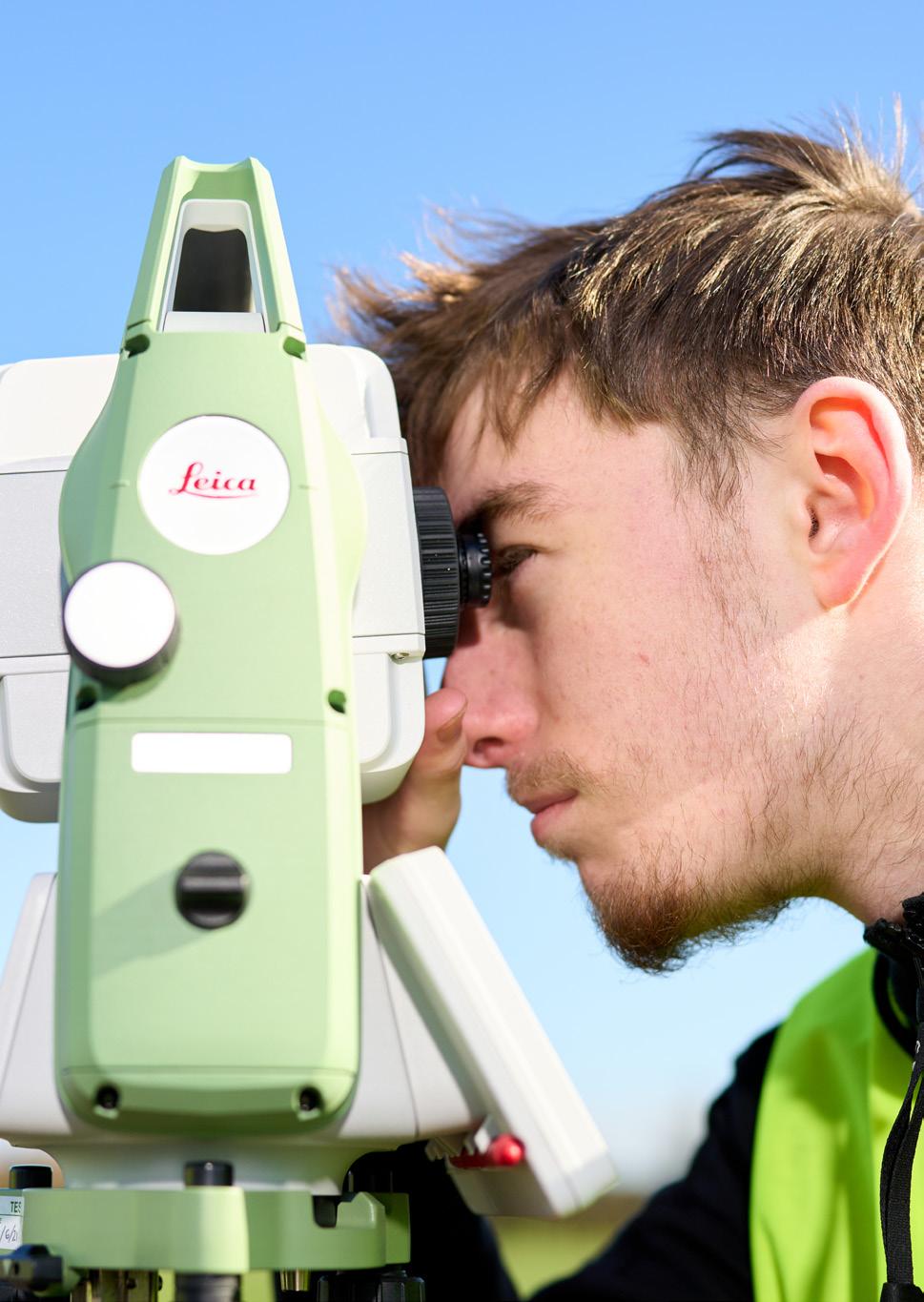
MORE ONLINE YORKCOLLEGE.AC.UK 93 | CONSTRUCTION
Digital Technologies

I originally chose this course to improve my art and implement some game design but throughout the year I have come to discover that it’s way more than that.
I enjoy the freedom that this course allows and the fact that there are multiple ways you are assessed in order to pass.
 George Creative Computing, Media & Games Level 1
George Creative Computing, Media & Games Level 1
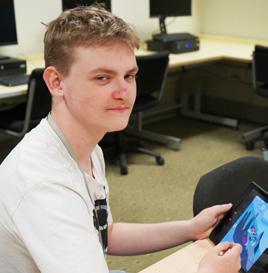
VOCATIONAL & T LEVEL | 94 FIND OUT MORE
Creative Computing, Media & Games
Computing & Games Development
Level 1
One year course
Entry requirements
Please see page 9 for general Vocational guidance and check the course description on our website for exact entry requirements for this subject. You can also speak to our tutors at Open Events and Guidance Discussions for further information.
What will I study?
This exciting course gives you the opportunity to develop a wide skill set completing hands on practical projects. Whilst studying the course you will continue to develop your interpersonal skills and industry knowledge through completion of practical projects.
You will complete a number of projects over the year which include:
• Introduction to Digital Technologies
• Animation
• Digital Illustration
• Digital Photography & Film
• Introduction to Programming
• Games Design & Development
• Working in the Creative Industries
• Information Technology Fundamentals
• Final major project
You will develop subject specific skills such as IT for employment, programming, Adobe suite, Procreate design software, animation and the moving image, plus a range of apps that enhance your learning further. The course is designed to develop a wide variety of digital skills that can be utilised in numerous different areas such as Digital Technologies, Games, Business and Digital Media.
Your next steps
On successful completion of the course you may progress to the Level 2 in Computing & Games Development or an equivalent pathway, such as Creative Media or Business.
Course content may be subject to change. Please see our website for up-to-date information.
Level 2
One year course
Entry requirements
Please see page 9 for general Vocational guidance and check the course description on our website for exact entry requirements for this subject. You can also speak to our tutors at Open Events and Guidance Discussions for further information.
What will I study?
All sessions will involve practical activities supported by discussion and demonstration, leading to the development of skills and behaviours desired by digital employers. Technologies may include RobotC, Mindstorms robots, HTML and CSS coding, Flowlab, GameMaker, AppInventor and PhotoShop.
The units covered are:
• Games Design and Development
• Digital Skills Project
• Website Design and Development
• Cybersecurity
• Programming
• Mobile App Development
• Exploring New and Emerging Technologies
• Photo editing software
• Digital Skills Project
• Digital Skills Progression
This engaging one year course is aimed at students with a love of hands-on digital technologies and games development involving a broad range of technical skills development, including coding, web development and cybersecurity skills. We also encourage students to seek work experience opportunities to support their study.
Your next steps
This is a respected qualification allowing access into entry level jobs in the IT industry, or progression on to Level 3 Digital qualifications such as Games Development, T Level in Computing & the Digital Environment, or to go into Creative Media or Business.
This Gateway qualification is subject to approval. Please see our website for up-to-date information.
95 | DIGITAL TECHNOLOGIES
Diploma Level 2
ESPORTS
One year course
Entry requirements
Please see page 9 for general Vocational guidance and check the course description on our website for exact entry requirements for this subject. You can also speak to our tutors at Open Events and Guidance Discussions for further information.
What will I study?
The course is aimed at students who have chosen to focus their learning and career development within the world of esports. It is an engaging and stimulating qualification that will prepare you for successful performance in working life and progression into employment by developing a range of essential skills, techniques and attitudes.
The Level 2 Diploma is made up of a range of units, which include:
• Esports Games, Teams and Tournaments
• Establishing an Esports Organisation
• Streaming for Esports
• Plan for an Esports Enterprise
• Start an Enterprise in Esports
• Positive Health and Well-being in Esports
You can re-sit GCSE Maths and English alongside this course.
Your next steps
On completion of this diploma you may also want to progress to further study such as BTEC Level 3 qualifications in Esports, Information Technology, Creative Media, Sport or Business.
Two year course
Entry requirements
Please see page 9 for general Vocational guidance and check the course description on our website for exact entry requirements for this subject. You can also speak to our tutors at Open Events and Guidance Discussions for further information.
What will I study?
This course is aimed at individuals who want to progress into employment in the esports industry, possibly via an apprenticeship, or who may aspire to enter higher education. The qualification is endorsed by the British Esports Association as being suitable for those who want to work in the industry. This means that it will be recognised by employers and will support entry into the industry in a range of roles.
Units you will study include:
• Introduction to Esports
• Esports Skills, Strategies and Analysis
• Enterprise and Entrepreneurship in the Esports Industry
• Health, Well-being and Fitness for Esports Players
• Esports Events
• Producing an Esports Brand
• Video Production
• Esports Coaching
• Nutrition for Esports Performance
Your next steps
Completion of the Extended Diploma could lead to a career as an Esports Player, Team Coach, Shoutcaster and Presenter, Social Media Influencer, Video Production Editor, Data Analyst or Events Organiser. Career industries you could enter include cybersecurity, cloud solutions, network management and virtual reality.
yorkcollege.ac.uk
Esports
Extended Diploma Level 3 VOCATIONAL & T LEVEL | 96

MORE
YORKCOLLEGE.AC.UK 97 | DIGITAL TECHNOLOGIES
ONLINE
Computer Games Development
Computing & the Digital Environment
Extended Diploma Level 3
T Level (Level 3)
Two year course
Entry requirements
Please see page 9 for general Vocational guidance and check the course description on our website for exact entry requirements for this subject. You can also speak to our tutors at Open Events and Guidance Discussions for further information.
What will I study?
This course is a fantastic opportunity to learn about computer games development from both a practical and theoretical standpoint. It is designed to provide you with a broad set of production skills within the gaming context.
During the first year, you will study a range of different units including Video Production, Digital Graphics, Sound Production and Video Games. Through a variety of projects, you are encouraged to explore ideas and techniques to develop a range of practical skills, develop an understanding of how to use a range of software and build on theoretical understanding of media production and its applications. This culminates in a larger, individualised project where you will have the opportunity to focus on your desired specialism.
During the second year, you will experience larger, more challenging assignments and work with external clients to realise more sophisticated projects.
Your next steps
The aim of the course is to prepare you for the progression to higher education and digital production, in particular computer games production. Students may progress on to university to take degrees or foundation degrees in subjects such as computer games development, computer games animation, 3D modelling and multimedia development.
Two year course
Entry requirements
Please see page 9 for general T Level guidance and check the course description on our website for exact entry requirements for this subject. You can also speak to our tutors at Open Events and Guidance Discussions for further information. You do not need to have taken GCSE Computer Science.
What will I study?
Designed and developed in collaboration with employers, this programme is a mixture of classroom and work-based learning to give you the technical skills and workplace experience to kick-start your career into the digital arena. This course provides a great opportunity for you to work alongside industry professionals. You will become part of a team and significantly contribute to ongoing projects in industry. This will allow you to develop your skills and to put the theory you learn into practice. The Technical Qualification is the main classroom-based element of the course and consists of two components:
Core Content
The core component provides a broad understanding of the digital industry and covers digital focused units including:
• Problem Solving
• Programming
• Emerging Issues and Impact of Digital
• Legislation and Regulatory Requirements
• Business Context
• Data
• Digital Environments & Networks
• Security
• Project Planning
• Software Testing
yorkcollege.ac.uk
VOCATIONAL & T LEVEL | 98
Occupational Specialisms
This will allow you to develop the relevant skills in preparation for your career in the digital industry.
The content will cover units including:
• Analysing a problem to define requirements and acceptance criteria aligned to user needs
• Designing, implementing and testing software
• Changing, maintaining and supporting software
• Creating solutions in a social and collaborative environment
• Discovering, evaluating and applying reliable sources of knowledge
• Applying ethical principles and managing risks in line with legal and regulatory requirements when developing software
Industry Placement
This course provides a great opportunity for you to work alongside industry professionals. You will become part of a team and significantly contribute to ongoing projects in industry. This will allow you to develop your skills and to put the theory you learn into practice.
An important requirement of the programme is that you must complete a 315 hour (approximately 45 days) work placement with an employer in the digital sector, where you will be fully integrated into the business, gaining real life skills and practical experience, which are vital additions to your CV and UCAS applications for university.
We will help and support you to find the right placement. Your next steps
You may progress into employment within the digital industry for example Software Development, Artificial Intelligence, Cybersecurity, Cloud Computing, Networking, Games Development, E-Learning, Data Analysis, App Development, Web Development, Business Systems, and Digital Marketing. Alternatively you may progress on to an apprenticeship or higher-level study, including university.

MORE ONLINE YORKCOLLEGE.AC.UK 99 | DIGITAL TECHNOLOGIES
Early Years & Education
I chose this course because I enjoy working with children and helping with their learning and development. Within the course you have the opportunity to enhance your CV with placement opportunities which is great, and the tutors are really good and very supportive. In the future I’d like to find a job working with children with special needs.


Cerys
Childcare and Education Level 3

VOCATIONAL & T LEVEL | 100 FIND OUT MORE
Working with Children in Early Years & Primary Settings
Certificate Level 2
Education & Early Years
T Level (Level 3)
One year course
Entry requirements
Please see page 9 for general Vocational Level 2 guidance and check the course description on our website for exact entry requirements for this subject. You can also speak to our tutors at Open Events and Guidance Discussions for further information.
Students are also required to complete a successful Disclosure and Barring Service (DBS) check prior to starting the course, for which there will be a charge.
What will I study?
The course is aimed at students who have an interest in supporting the learning and development of children from birth to 11 years 11 months.
The qualification is made up of six units which include:
• Child Development from Birth to 11 years and 11 months
• Play and Learning
• Exploring Legislation
• Nutrition
• Physical Development and Physical Activity
There will be a placement setting of 120 hours of real work experience.
Your next steps
Progression to Level 3 qualifications within the areas of early years, children and young people, and supporting teaching and learning. Students can also progress to employment in roles such as Nursery Assistant, Classroom Assistant and Pre-School Assistant.
Introduction to Health, Social Care and Children’s & Young People’s Settings
Diploma Level 1 is now available.
See page 119 for course details.
Two year course Entry Requirements
Please see page 9 for general T Level guidance and check the course description on our website for exact entry requirements for this subject. You can also speak to our tutors at Open Events and Guidance Discussions for further information.
What will I study?
This qualification will provide classroom theory, practical learning and a significant industry placement with an employer. It has been developed in collaboration with employers and businesses so that it meets the needs of industry and prepares the students for work.
The Technical Qualification is the main classroom-based element of the course and consists of two components:
Core Content
This provides you with the knowledge that underpins the industry with units which could include safeguarding, supporting education, special educational needs and reflective practice.
Occupational Specialisms
You can choose to specialise in a specific field which could include early years education and childcare, assisting teaching or supporting and mentoring students in further and higher education.
Industry Placement
The industry placement allows you to develop your subject specific skills as well as those necessary to working in any environment, such as effective planning, working with others, health and safety and promoting equality and diversity.
Your next steps
You may progress into employment, a higher apprenticeship or higher-level study, including university.
MORE ONLINE YORKCOLLEGE.AC.UK
101 | EARLY YEARS & EDUCATION
The tutors treat us like adults; we have fun but do work to a very high level. The work is demanding but throughout you know how it relates to the real world, which makes it more engaging.
My highlight has been the Mechanical Principles assignments which were incredibly engaging and showed how the world of engineering actually works.
Tom Advanced Manufacturing Engineering Extended Diploma (Multiskill) Level 3



Engineering
VOCATIONAL & T LEVEL | 102 FIND OUT MORE
Light Vehicle Maintenance
Vehicle Fitting Principles
Certificate/Diploma Level 1
Diploma Level 2
One year course Entry requirements
Please see page 9 for general Vocational guidance and check the course description on our website for exact entry requirements for this subject. You can also speak to our tutors at Open Events and Guidance Discussions for further information.
What will I study?
This course is designed to engage and motivate students who are interested in learning about the maintenance of motor vehicles and the various roles that are available in the retail motor industry.
You will study a selection of the following units:
Mandatory units:
• Health and Safety Practices in Vehicle Maintenance
• Tools, Equipment and Materials for Vehicle Maintenance
Other units may include:
• Spark Ignition Engine Systems Components and Operation
• Compression Ignition Engine Systems Components and Operation
• Vehicle Braking Systems Components and Maintenance
• Routine Vehicle Maintenance Processes and Procedures
• Vehicle Wheels and Tyres Construction and Maintenance
• Vehicle Exhaust Systems Components and Maintenance
• Vehicle Driveline Maintenance
• Introduction to Spark Ignition Fuel Systems
• Introduction to Compression Ignition Fuel Systems
• Vehicle Electrical Foundation Skills
Your next steps
You can continue your studies by progressing on to the Vehicle Fitting Principles Diploma Level 2 course, or find employment in the automotive industry or a motor vehicle apprenticeship.
One year course Entry Requirements
Please see page 9 for general Vocational guidance and check the course description on our website for exact entry requirements for this subject. You can also speak to our tutors at Open Events and Guidance Discussions for further information. You can progress on to this course having completed the Light Vehicle Maintenance Diploma Level 1.
What will I study?
This course includes the full range of routine vehicle fitting procedures. It provides essential knowledge and skills for vehicle fitters working on a wide range of vehicles in all types of garages, dealerships and fast fit businesses.
It will provide you with the opportunity to study both the theory and practical aspects of some of the following:
• Inspecting, repairing and replacing high performance light vehicle and motorcycle tyres
• Carrying out light vehicle front wheel alignment
• Inspecting and replacing light vehicle clutches, exhaust components, suspension dampers, vehicle batteries and braking systems
• Safe use of oxy-acetylene
• Assessing and securing a roadside situation
• You will gain a broad knowledge and understanding of health and safety in the workplace, agreeing customer vehicle needs and other skills associated with working in a garage
Your next steps
Progression on to the Light Vehicle Maintenance & Repair Diploma Level 2 or an apprenticeship.
MORE ONLINE YORKCOLLEGE.AC.UK
103 | ENGINEERING
Light Vehicle Maintenance & Repair
Light Vehicle Maintenance & Repair VOCATIONAL
Diploma Level 2 (Direct Entry)
Diploma Level 3
One year course
Entry requirements
Please see page 9 for general Vocational guidance and check the course description on our website for exact entry requirements for this subject. You can also speak to our tutors at Open Events and Guidance Discussions for further information. You can also progress having completed the Vehicle Fitting Principles Diploma Level 2.
What will I study?
The course covers the whole range of motor vehicle engineering skills from routine maintenance to repair techniques. It is based on the Technical Certificate requirement of a motor vehicle apprenticeship.
Units studied may include:
• Health and Safety Practices in Vehicle Maintenance
• Job Roles in the Automotive Industry
• Spark Ignition Engine Systems, Components and Operation
• Routine Vehicle Maintenance Processes and Procedures
• Introduction to Low Carbon Technologies in the Automotive Industry
• Vehicle Electrical Foundation Skills
• Removing and Replacing Engine Units and Components
• Removing and Replacing Chassis Units and Components
Your next steps
Many of the students take up employment in the automotive industry and/or follow a motor vehicle apprenticeship. Alternatively, it is possible to progress on to the Light Vehicle Maintenance & Repair Diploma Level 3 with the correct entry requirements and a successful interview (depending on number of applicants).
One year course
Entry requirements
You must have achieved the Level 2 Diploma in Light Vehicle Maintenance & Repair. It is not possible to start this course with a GCSEs only profile.
What will I study?
The course covers the whole range of motor vehicle engineering skills from routine maintenance to advanced repair techniques. It is based on the Technical Certificate requirement of a motor vehicle apprenticeship.
Units you will cover include:
• Diagnose and Repair Engine Units and Components
• Diagnose and Repair Electrical Units and Components
• Diagnose and Repair Chassis Units and Components
• Transmission and Driveline Units and Components
Your next steps
Students would normally progress on to a job in the motor vehicle industry or on to an apprenticeship. You could also broaden your skill set by studying another course such as the Level 2 Performing Engineering Operations.
yorkcollege.ac.uk
& T LEVEL | 104

MORE ONLINE YORKCOLLEGE.AC.UK 105 | ENGINEERING
Performing Engineering Operations (PEO)
NVQ Level 2
Engineering & Technology
One year course
Entry requirements
Please see page 9 for general Vocational guidance and check the course description on our website for exact entry requirements for this subject. You can also speak to our tutors at Open Events and Guidance Discussions for further information.
What will I study?
The course has been designed to give you an understanding of a wide range of engineering practices and allows you to develop a range of practical engineering skills. Alongside the practical lessons you will also study some underpinning theory to further develop your understanding of units including engineering processes, tools and equipment, the engineering environment, health and safety and engineering drawings.
The practical work aims to cover a range of engineering disciplines including mechanical, maintenance and fabrication engineering, and in some cases an understanding of basic electrical/electronic engineering.
Typical units may include:
• Working Efficiently and Effectively in Engineering (mandatory)
• Filing and Fitting Techniques
• Preparing and Using a Lathe
• Working with Sheet Metal
• MIG/MAG/Gas Welding
• Electrical Wiring & Testing
• Engineering Maintenance
• Pneumatics Systems and Maintenance
• Computer Aided Design (AutoCAD)
You will study GCSE English and/or Maths if you haven’t yet achieved a grade 4. Or you can study Higher Maths if you have a grade 4 and wish to improve this.
Your next steps
The Level 3 Diploma in Engineering & Technology (which builds on your practical skills); or on to a job or an apprenticeship. To take a more academic route you will need GCSE grade 5 (or above) in Maths on the higher paper to progress on to our Engineering (Multiskill) Level 3 course or Engineering & Manufacturing T Level.
One year course
Entry requirements
You must have already completed the NVQ Level 2 PEO (Performing Engineering Operations) or an equivalent practical qualification.
What will I study?
You will extend your practical engineering skills and focus on developing your competency across a range of engineering practical skills, knowledge and behaviours. You will also develop your theoretical underpinning knowledge which will support your understanding of the processes and engineering practices. You are required to achieve eight units; two of which are mandatory.
Mandatory units are:
• Engineering and Environmental Health and Safety
• Organisational Efficiency and Improvement, Quality Assurance/Control
Other units may include:
• Advanced Turning
• Computer Aided Drawing
• MIG/MAG Welding
• Producing Sheet Metal Fabrications
• Pattern Development
Your next steps
A job or apprenticeship in engineering e.g. Maintenance Engineer, Mechanical Engineer, Welder and/or Fabricator. Alternatively, you could study another course to expand your engineering skill set, perhaps in the field of electrical installation or any other relevant programme.
yorkcollege.ac.uk
Diploma Level 3 VOCATIONAL & T LEVEL | 106
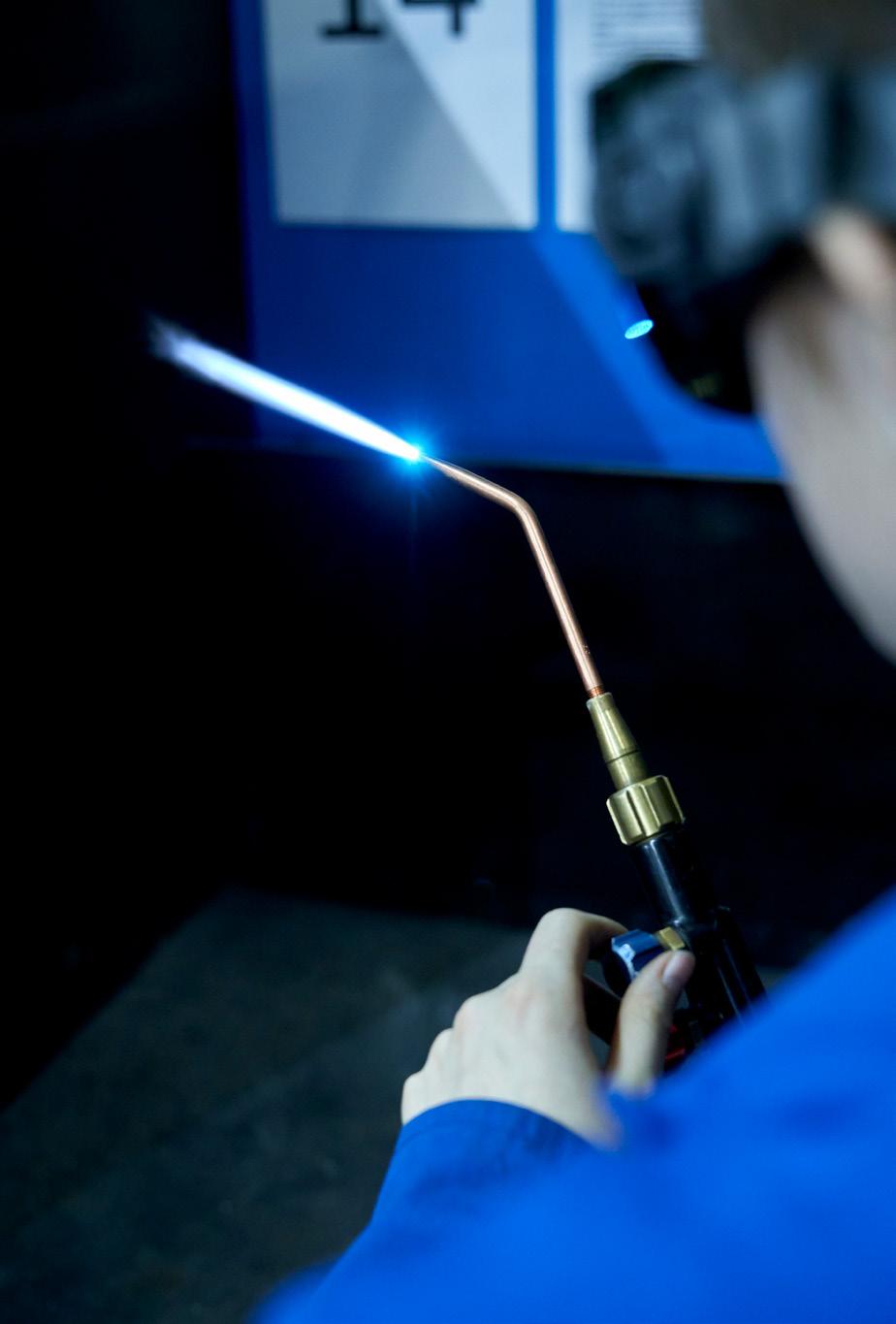
MORE ONLINE YORKCOLLEGE.AC.UK 107 | ENGINEERING
Advanced Manufacturing Engineering
Certificate (Multiskill) Level 3 (Year One)
One year course
Entry requirements
Please see page 9 for general Vocational guidance and check the course description on our website for exact entry requirements for this subject. You can also speak to our tutors at Open Events and Guidance Discussions for further information.
What will I study?
You will develop a broad range of engineering knowledge and skills and an understanding of engineering theory and industry practice, covering manufacturing, mechanical and electronic/electrical engineering disciplines. The units give a multiskilled experience as advised by local and regional employers.
Units may typically include:
• Mathematics for Engineering Technicians
• Mechanical Principles of Engineering Systems
• Electrical and Electronic Principles in Engineering
• Computer Aided Drafting in Engineering
• Engineering Maintenance
• Health & Safety
• Engineering Communications
• Engineering Secondary and Finishing Techniques
• Engineering Design
Your next steps
Whilst on this course it is possible to transfer, at any point, to most engineering apprenticeships; this is the course that many engineering apprentices will study. Alternatively, you would typically progress on to the second year of this course which is the Extended Diploma in Advanced Manufacturing Engineering.
Advanced Manufacturing Engineering
Extended Diploma (Multiskill) Level 3 (Year Two)
One year course
Entry requirements
You will need to have achieved the Year One Certificate in Advanced Manufacturing Engineering to progress to the full Extended Diploma.
What will I study?
Building on Year One, you will continue to develop further understanding and skills across a range of engineering disciplines, studying both theory and industry practice.
A substantial part of Year Two is to carry out a ‘design and make’ project with a ‘mechatronics’ theme, combining both mechanical and electronic engineering skills. This will also help develop wider skills of project management, research and analysis, communication and problem-solving.
Units may typically include:
• Engineering Project (worth 2 units)
• Selecting and Using Programmable Controllers
• Features and Applications of Electrical Machines
• Properties and Applications of Engineering Materials
• Principles and Applications of Electronic Devices and Circuits
• Engineering Maintenance
• Industrial Robot Technology
• Computer Aided Manufacture
• Further Engineering Mathematics*
*Anyone considering university degree programmes must study the Further Engineering Mathematics unit as an additional part to their programme.
Your next steps
Higher education such as a HND or degree programme. As this course is ‘multiskill’ it can lead on to a full range of engineering disciplines, from mechanical to electronic, aeronautical, advanced manufacturing and engineering design to name but a few. You could also transfer or progress on to an advanced or higher apprenticeship, or employment in engineering. It is important to investigate the entry requirements for engineering degree programmes as many will require the BTEC Further Maths unit or A Level Maths.
yorkcollege.ac.uk
VOCATIONAL & T LEVEL | 108
ENGINEERING & MANUFACTURING: DESIGN & DEVELOPMENT
T Level (Level 3)
Two year course Entry requirements
Please see page 9 for general T Level guidance and check the course description on our website for exact entry requirements for this subject. You can also speak to our tutors at Open Events and Guidance Discussions for further information.
What will I study?
This qualification will develop your knowledge, skills and professional behaviours across a wide range of engineering and manufacturing occupations and industries, and is delivered through a mixture of classroom theory and academic study projects, applied and practical learning and 315 hours industry placement with an employer/s.
The classroom-based element of the course consists of the Core Content and the Occupational Specialisms.
Core Content (Year One)
Units include:
• Maths and Science Principles for Engineering
Mathematics and science for engineering and manufacturing, materials, mechanical/electrical & electronic principles
• Engineering in Context
Including working within the sectors, mechatronics, control systems, quality management, project and programme management
• Employer Set Project
You will apply your skills and knowledge to design a solution to a given engineering problem, or to re-engineer a product, component or engineering system to improve it
Occupational Specialisms (Year Two)
The occupational specialisms we are offering from the Design & Development pathway* from which you will choose are:
• Mechanical Engineering
• Electrical & Electronic Engineering
*Pathways are subject to numbers.
Industry Placement
The placement allows you to develop and apply your subject specific skills as well as those necessary to working in any environment. You will complete 315 hours as a combination of day and block release across the two years.
Your next steps
This technical qualification will support you on to a broad range of progression routes including employment, higher education engineering degree programmes or advanced/ higher apprenticeships.
Due to the breadth of the T Level syllabus you could progress on to a range of engineering careers from Computer Aided Design Technician to Mechanical Engineer, and roles in electrical/electronic engineering, aerospace & aeronautical and advanced manufacturing engineering.
109 | ENGINEERING
Hair & Beauty
I have always enjoyed anything beauty related and like the idea of helping others with relaxation or their appearance.

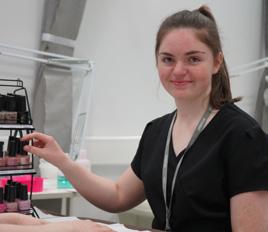
The course has been everything I thought it would be and I have made some really good friends.

Diploma Level 2 VOCATIONAL & T LEVEL | 110 FIND OUT MORE
Sophie Beauty Therapy
Introduction to the Beauty & Media (Make-up) Sector
VRQ Certificate Level 1 (Foundation Learning)
One year course
Entry requirements
Please see page 9 for general Vocational guidance and check the course description on our website for exact entry requirements for this subject. You can also speak to our tutors at Open Events and Guidance Discussions for further information.
What will I study?
This is an introduction to Beauty Therapy and Media Make-up, providing a stepping stone to Level 2 Hairdressing, Beauty Therapy or Hair & Media Make-up.
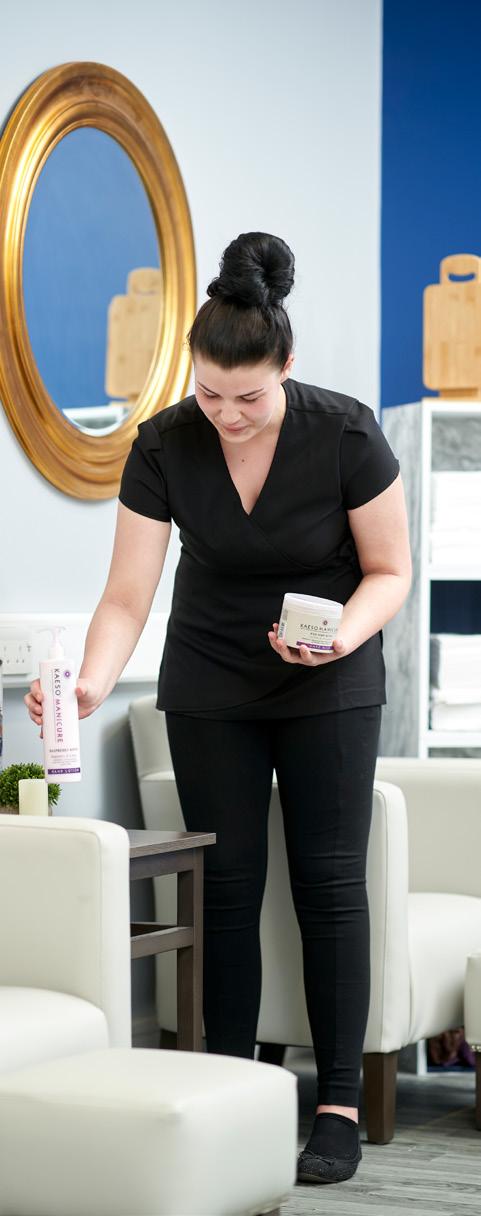
The programme of study includes:
• Basic Skin Care
• Basic Make-up Techniques
• Basic Manicure Treatments
• Simple Nail Art
• Face Painting
• Presenting a Professional Image in a Salon
• Health and Safety in a Salon
• Reception Duties
Further study may include:
• Competition work
• Work experience
• English and Maths (if you haven’t achieved GCSE grade 4)
Your next steps
You can progress on to the Level 2 courses in Hair & Media Make-up, Hairdressing or Beauty Therapy. Alternatively, you may go straight into a salon as a Salon Assistant/Junior. The course also provides skills transferable to other subject areas.
MORE ONLINE YORKCOLLEGE.AC.UK
111 | HAIR & BEAUTY
Beauty Therapy
Beauty
Therapy
VRQ Level 2
One year course
Entry requirements
Please see page 9 for general Vocational guidance and check the course description on our website for exact entry requirements for this subject. You can also speak to our tutors at Open Events and Guidance Discussions for further information.
What will I study?
Subjects include:
• Facial Treatments
• Waxing for Hair Removal
• Manicure Treatments
• Pedicure Treatments
• Make-up (including themed make-up design)
• Lash and Brow Tinting
• Eyebrow Shaping
• Artificial Eyelashes
• Health and Safety
• Client Care and Communication Skills
• Promotional Skills
• Reception Duties
Your next steps
Further study may include:
• Competition work
• Attendance at beauty seminars/presentations
• Eve Taylor professional skin care qualifications and additional external training
• Work experience
• English or Maths (if you haven’t achieved GCSE grade 4)
One year course
Entry requirements
This course is a progression route from Level 2 Beauty Therapy or Media Make-up. Please see the course description on our website for exact entry requirements for this subject. You can also speak to our tutors at Open Events and Guidance Discussions for further information.
What will I study?
Subjects include:
• Body Massage
• Massage using Hot and Cold Stones
• Indian Head Massage
• Advanced Facial Electrotherapy Treatments
• Advanced Body Electrotherapy Treatments
• Monitor Procedures to Safely Control Work Operations
• Planning and Implementation of Promotional Activities
• Contribute to the Financial Effectiveness of the Business
Further study may include:
• Competition work
• Attendance at beauty seminars/presentations
• Eve Taylor professional skin care qualifications and additional external training
• Work experience
• English and/or Maths (if you haven’t achieved GCSE grade 4)
Ideally students would progress on to the Beauty Therapy Diploma Level 3.
Students with a Level 2 qualification could seek employment in a beauty salon, make-up studio or nail bar. There are also opportunities to complete consultancy work, become a Demonstrator for a product manufacturer, or a Beauty Therapist on a cruise liner. Self-employment and working in retail are also possibilities.
Your next steps
Level 4 Diploma in Salon Management or Foundation Degree in Media Make-up, Special Effects & Hair Design (grade 4 or above in GCSE English and Maths is required). Employment opportunities include salon/spa work, work on cruise liners, mobile Beauty Therapist, and setting up your own business.
yorkcollege.ac.uk
VRQ Diploma Level 3 VOCATIONAL & T LEVEL | 112
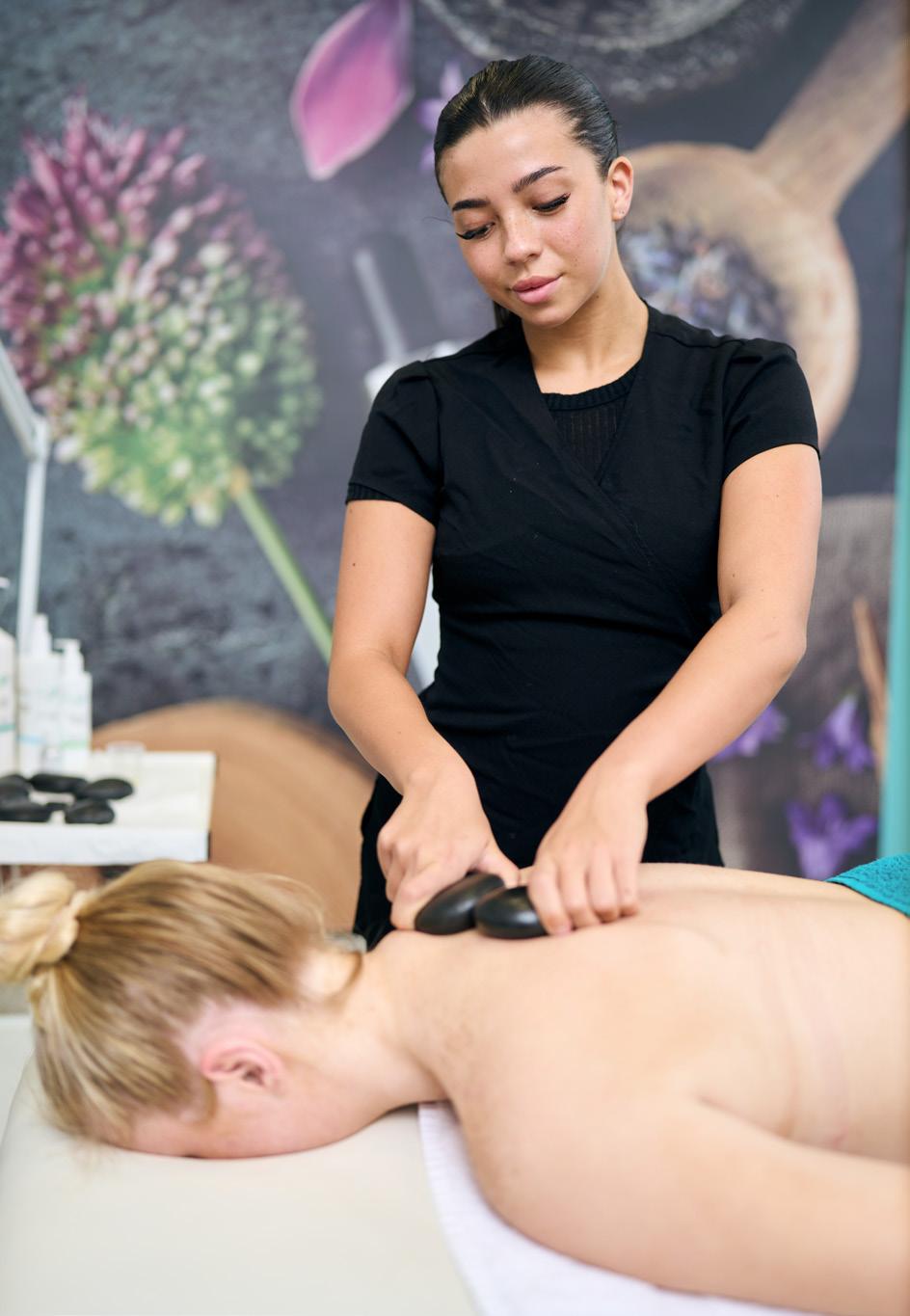
MORE ONLINE YORKCOLLEGE.AC.UK 113 | HAIR & BEAUTY
One year course
Entry requirements
Please see page 9 for general Vocational guidance and check the course description on our website for exact entry requirements for this subject. You can also speak to our tutors at Open Events and Guidance Discussions for further information.
What will I study?
This is an introduction to hairdressing, providing a stepping stone to Level 2 Hairdressing, Beauty Therapy or Hair & Media Make-up.
The programme of study includes:
• Prepare for Hair Services and Maintain Work Areas
• Contribute to the Development of Effective Working Relationships
• Blow Dry Hair
• Shampoo and Condition Hair
• Assist with Hair Colouring and Lightening Services
• Plait and Twist Hair using Basic Techniques
Further study may include:
• Competition work
• Work experience
• English and Maths
(if you haven’t achieved GCSE grade 4)
Your next steps
You can progress on to the Level 2 courses in Hairdressing, Beauty Therapy or Hair & Media Make-up. Alternatively, you may go straight into a salon as a Salon Assistant/ Junior. The course also provides skills transferable to other subject areas.
One year course
Entry requirements
Please see page 9 for general Vocational guidance and check the course description on our website for exact entry requirements for this subject. You can also speak to our tutors at Open Events and Guidance Discussions for further information.
What will I study?
The programme content includes:
• Working in the Hair Industry
• Following Health and Safety Practices in the Salon
• Client Consultation for Hair Services
• Shampooing and Conditioning the Hair and Scalp
• Cutting Women’s Hair
• The Art of Dressing Hair
• Colouring and Lightening Hair
• Perming and Neutralising Hair
• Promoting Products and Services to Clients in the Salon
• Salon Reception Duties
• Creating an Image on a Theme within the Hair and Beauty Sector
Further study may include:
• Competition work
• Work experience/work placement
• Employability skills
• Visits to hair shows and relevant exhibitions
• English and Maths (if you haven’t achieved GCSE grade 4 or above)
Your next steps
Hairdressing Diploma VRQ Level 3 for one year, or you could follow an apprenticeship route and study the Advanced & Creative Hair Professional Apprenticeship Level 3.
yorkcollege.ac.uk
Hairdressing
VOCATIONAL & T LEVEL | 114
NVQ Level 1
VRQ Level 2 Hairdressing
VRQ Level 3
One year course Entry requirements
Please see page 9 for general Vocational guidance and check the course description on our website for exact entry requirements for this subject. You can also speak to our tutors at Open Events and Guidance Discussions for further information. You must have completed Hairdressing VRQ Level 2 and be confident working at this level.
What will I study?
Units include:
• Consultation Support for Colleagues on Hair Services
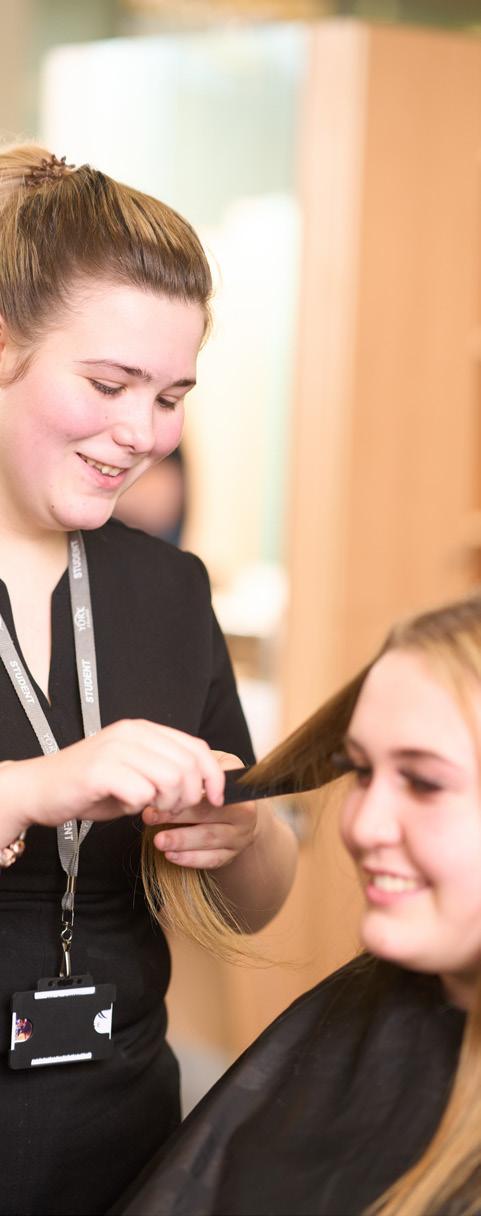
• Cut Women’s Hair to Create a Variety of Looks
• Style and Dress Hair using a Variety of Techniques
• Colour Hair to Create a Variety of Looks
• Bridal Hair
• Cut Men’s Hair
• Hair Colour Correction
Further study may include:
• Competition work
• Work experience
• Trips to hair shows/exhibitions
• English or Maths (if you haven’t achieved GCSE grade 4)
Your next steps
Progression includes Specialist Hairstylists for home and abroad, Educators for manufacturers, Assessors, Lecturers, Demonstrators, and Specialist Hair Colourists/Fashion Styling. Students could progress to the Level 4 Diploma in Salon Management or to higher education such as the Foundation Degree in Media Make-up, Special Effects & Hair Design. If you want to progress to higher education you must have GCSE English and Maths at grade 4 or above.
MORE ONLINE YORKCOLLEGE.AC.UK Hairdressing 115 | HAIR & BEAUTY
Diploma Level 2
Theatrical, Special Effects, Hair & Media Make-up
Diploma Level 3
One year course
Entry requirements
Please see page 9 for general Vocational guidance and check the course description on our website for exact entry requirements for this subject. You can also speak to our tutors at Open Events and Guidance Discussions for further information.
What will I study?
Subjects include:
• Health and Safety
• Client Care and Communication in the Beauty-related Industry
• Apply Make-up
• The Art of Photographic Make-up
• The Art of Dressing Hair
• Create an Image Based on a Theme within the Hair and Beauty Sector
• Theme Face Painting
• Body Art Design
• Colour and Lighten Hair
• Cut Women’s Hair
• Shampoo and Condition the Hair and Scalp
Further study may include:
• Competitions
• Work experience
• Visits from external speakers/demonstrators
• English or Maths (if you haven’t achieved GCSE grade 4)
Your next steps
You could progress on to the Theatrical, Special Effects, Hair & Media Make-up Diploma Level 3. Employment in the hair and beauty industry, e.g. in a hairdressing salon or as a Make-up Consultant/Make-up Artist.
One year course
Entry requirements
Please see the course description on our website for exact entry requirements for this subject. You can also speak to our tutors at Open Events and Guidance Discussions for further information. You must have completed the Hair & Media Make-up Diploma Level 2.
What will I study?
The subjects covered include the theory and practice of:
• Apply Airbrush Make-up to the Face
• Camouflage Make-up
• Media Make-up
• Fashion and Photographic Make-up
• Style and Fit Postiche
• Apply Prosthetic Pieces and Bald Caps
• Design and Apply Face and Body Art
• Fantasy Hair Design for Performers
• Monitor and Maintain Health and Safety Practices in the Salon
• Client Care and Communication in the Beauty-related Industry
Further study may include:
• Competition work
• Work experience
• Demonstrations from visiting speakers
Your next steps
Progression on to Level 4 or 5 or Foundation Degree. Career possibilities include employment in the media make-up and hairdressing industries with opportunities for self-employment. Examples could include working in theatre, TV or film (although more experience at Levels 4, 5 and 6 are beneficial for film and television).
yorkcollege.ac.uk
Hair & Media Make-up
VOCATIONAL & T LEVEL | 116
Hair, Beauty & Barbering
T Level (Level 3)
Two year course Entry requirements
Please see page 9 for general T Level guidance and check the course description on our website for exact entry requirements for this subject. You can also speak to our tutors at Open Events and Guidance Discussions for further information.
What will I study?
The T Level qualification has been designed by a panel of employers, professional bodies and education specialists. The purpose of the Level 3 Technical qualification is to ensure that students have the knowledge and skills to progress into skilled employment or higher-level training relevant to the T Level.
This qualification is a combination of classroom theory, practical learning and industry placement (work placement) with an employer.
The Technical Qualification is the main element of the course and consists of two components:
Core Content
The Core Content focuses on your knowledge and understanding relevant to the Hair, Beauty and Barbering industries. The breadth of the content will ensure you are able to apply your skills in a variety of contexts and purposes, relating to employment in the occupations linked to the qualifications.
Units will include:
• How the Sector Operates
• Health and Safety
• Understanding the Client Journey
• Client Consultation
• Sales and Marketing
• Business Practices
• Self Development
Occupational Specialisms
Students can choose to specialise in different occupational specialisms. This will ensure that you develop the knowledge, skills and behaviours to support your development once in work (including an apprenticeship).
Occupational specialisms with this T Level include:
• Beauty Therapy
• Hairdressing
• Barbering
Industry Placement
The industry placement allows you to develop your occupational specialism skills as well as those necessary to working in any environment, such as effective planning, working with others, health and safety and promoting equality and diversity.
Your next steps
You may progress into employment, an apprenticeship or higher-level study, including university.
117 | HAIR & BEAUTY
Health & Social Care

T Level Health is amazing. It involves so many great elements such as practical work with the doll, placement, theory and individual work. I have a great relationship with all my tutors. They are so supportive and understanding which makes College so much more enjoyable and they treat you more like an adult.


After College I would like to attend university to study Midwifery.
Ruby Health T LEVel
VOCATIONAL & T LEVEL | 118 FIND OUT MORE
Introduction to Health, Social Care and children’s & young people’s settings
Diploma Level 1
One year course
Entry requirements
Please see page 9 for general Vocational Level 1 guidance and check the course description on our website for exact entry requirements for this subject. You can also speak to our tutors at Open Events and Guidance Discussions for further information.
What will I study?
This course is aimed at those considering a career in health and/or social care, with adults or children and young people, and will develop your knowledge and awareness of the types of provision in health/social and children’s care. It includes the roles played by workers, from principles and values through to health and safety and working with others.

There is the option to study specialised areas such as learning disability, sensory loss or mental health. The course will support progression to Level 2 qualifications in health, social care or children’s settings.
Your next steps
On completion you may progress into employment within the health/social and children’s care sector or progress on to a related Level 2 course, for which a Pass profile is required.
MORE ONLINE YORKCOLLEGE.AC.UK
119 | HEALTH & SOCIAL CARE
Health & Social Care
Health
Extended Diploma Level 2
One year course
Entry requirements
Please see page 9 for general Vocational Level 2 guidance and check the course description on our website for exact entry requirements for this subject. You can also speak to our tutors at Open Events and Guidance Discussions for further information.
What will I study?
The programme is designed to provide you with an understanding of the basic aspects of health and social care and the factors affecting an individual’s health and well-being.
You will study a range of key areas which include:
• Principles of Safeguarding and Protection in Health and Social Care
• The Role of the Health and Social Care Worker
• Implement Person Centred Approaches in Health and Social Care
• Contribute to Health and Safety in Health and Social Care
• Optional units which are matched to the needs of the job market
Also included are visits, guest speakers, career preparation events and experience of work.
Your next steps
Further studies at Level 3 or progression to an apprenticeship. This qualification does not provide a licence to practise, but may support progression into a range of job roles in the health and social care sector, including Care Support Workers in adult residential settings; Healthcare Assistants in community, primary care and acute health environments; Care Support Workers in domiciliary services, supported living or day services and Community-based Support Workers.
Two year course
Entry requirements
Please see page 9 for general T Level guidance and check the course description on our website for exact entry requirements for this subject. You can also speak to our tutors at Open Events and Guidance Discussions for further information.
What will I study?
This qualification will provide classroom theory, practical learning and 315 hours industry placement with an employer. The Technical Qualification is the main classroom-based element of the course and consists of two parts:
Core Content
There are two components in the Core Content: Route Core Component and Pathway Core Component.
These provide you with the knowledge that underpins the industry with units covering working within the health sector, managing information and data and good clinical practice. The breadth of content will ensure you can apply your skills for different purposes and in different roles.
Occupational Specialisms
These provide you with knowledge and skills required in the specific occupational area. There are two parts to this component:
• Occupational Specialism Core: Supporting Healthcare
• Supporting the Adult Nursing Team
Industry Placement
The industry placement develops your subject specific skills as well as those necessary to working in any environment, such as effective planning and working with others.
Your next steps
This technical qualification will support you on to a range of progression routes including employment, higher education and higher apprenticeships.
yorkcollege.ac.uk
T Level (Level 3) VOCATIONAL & T LEVEL | 120

MORE ONLINE YORKCOLLEGE.AC.UK 121 | HEALTH & SOCIAL CARE
Hospitality
This was the only subject that interested me. I have always baked when growing up and my dream is to own my own cake shop or be a pastry chef in a Michelin star restaurant.
I started on the Level 2 Pâtisserie course last year. I’ve loved it here, the tutors are great and I’ve met great people on my course.



I’ve learnt loads - especially as it’s hands-on work. It gives you more experience of what the job is going to be like in industry.
Connie Pâtisserie & Confectionery
Level 3
VOCATIONAL & T LEVEL | 122 FIND
MORE
OUT
Introduction to the Hospitality Industry
Hospitality (Chef & Pâtisserie Chef)
Foundation Learning
One year course
Entry requirements
Please see page 9 for general Vocational guidance and check the course description on our website for exact entry requirements for this subject. You can also speak to our tutors at Open Events and Guidance Discussions for further information. You should have an interest in Hospitality.
What will I study?
The course is an introduction for students who would like to prepare to enter the hospitality industry and who may need a little extra help with confidence building and developing literacy and numeracy.
You will gain experience in:
• Customer Service in the Hospitality Industry
• Food Service
• Basic Food Preparation and Cooking
• Food Safety
• Serving Food and Drink
There will be opportunities to work within our industrial kitchen and our Ashfields Restaurant to develop sector specific skills.
This programmes includes GCSE English Language and Maths.
Your next steps
You can progress to the Level 2 in Hospitality, which includes food and beverage service and professional cookery, depending on progress throughout the programme. Alternatively, you may wish to take up a job opportunity in the industry. Potential job occupations include Hotel Porter, Hotel Receptionist, Hotel Room Attendant, Food Processing Operative and Fast Food Service Assistant.
Level 2
One year course
Entry requirements
Please see page 9 for general Vocational guidance and check the course description on our website for exact entry requirements for this subject. You can also speak to our tutors at Open Events and Guidance Discussions for further information.
What will I study?
This qualification will provide the knowledge and practical skills to work within the hospitality sector in front facing roles (Bar Person, Food Service, Team Member) or professional cookery roles. It covers a range of essential skills enabling you to gain confidence in delivering a high level of service and product in a range of environments.
Units include:
• Customer Service in Hospitality
• Food Safety in Catering
• Team Working in Hospitality
Other units may include:
• Food and Beverage Service Skills
• Professional Cookery Skills
• Pâtisserie & Confectionery
• Handling Payments and Maintaining Payment Points
You will also study GCSE English and Maths if you have not yet achieved a grade 4 in these.
Your next steps
Progression on to Level 3 Professional Cookery; Level 3 Advanced Professional Cookery or Pâtisserie & Confectionery; or Hospitality Supervision and Leadership courses, depending on progress and achievement at Level 2. Potential job occupations include Catering/ Restaurant Member, Contract Chef/Cook, Bartender, Food and Beverage Attendant, Receptionist and Housekeeper.
123 | HOSPITALITY
Professional Cookery (professional chef/ Pâtisserie)
Level 3
Food & Beverage Supervision
Level 3
One year course
Entry requirements
Please see page 9 for general Vocational guidance and check the course description on our website for exact entry requirements for this subject. You can also speak to our tutors at Open Events and Guidance Discussions for further information. You must have achieved a Level 2 Professional Cookery or Pâtisserie Diploma to access this course.
What will I study?
This course is aimed at those wishing to progress from Level 2 and/or for those in industry who wish to be recognised for their skills and further increase their knowledge. You will achieve a higher level of supervisory skills and have an ability to manage others.
There are two pathways: Professional Cookery (Kitchen Larder) or Pâtisserie & Confectionery.
Units include:
• Supervisory Skills in the Hospitality Industry
• Principles of Food Safety Supervision for Catering
• Practical Gastronomy
• Pâtisserie & Confectionery
There are also other additional units developing advanced skills and techniques in producing poultry, meat, fish, shellfish, vegetables, game, fermented dough products, pastry, petit fours, desserts, biscuits, cakes and sponges, chocolate work, pastillage and sugar work.
Your next steps
Other Level 3 courses in Hospitality or Business; a Higher National Diploma in International Tourism Management or Business; a BA (Hons) Degree in Business with Management or a higher apprenticeship at York College or another university. Potential job occupations include Sous Chef, Catering/Restaurant Manager, Kitchen Supervisor/ Manager, Development Chef and Nutritional Therapist.
One year course
Entry requirements
Please see page 9 for general Vocational guidance and check the course description on our website for exact entry requirements for this subject. You can also speak to our tutors at Open Events and Guidance Discussions for further information. You must have achieved a Level 2 Hospitality Service or Food & Beverage Service qualification.
What will I study?
This programme allows you to learn and develop the skills required for employment and/or career progression in the food and beverage/front of house sector. You will learn the key skills required to ensure you have a thorough understanding of the role and expectations that any future employer will expect from you as a Supervisor.
Units include:
• Principles of Supervising Food and Beverage Services
• The Principles of Food Safety Supervision for Catering
• Principles of Promoting Food and Beverage Services and Products
• Supervise Food and Beverage Service
• Legislation in Food and Beverage Service
Your next steps
Other Level 3 courses in Hospitality or Business; a Higher National Diploma in International Tourism Management or Business; a BA (Hons) Degree in Business with Management or a higher apprenticeship at York College or another university. Potential job occupations include Catering/Restaurant Supervisor, Bartender Supervisor and Deputy Manager.
yorkcollege.ac.uk
VOCATIONAL & T LEVEL | 124

MORE ONLINE YORKCOLLEGE.AC.UK 125 | HOSPITALITY
Media: Print, TV & Film
My favourite part of the Creative Media course is the experimentation. It’s just pure fun filming, editing and using things you have learnt. It teaches expression and is the perfect canvas for creative thinking.

After this course I’m going to study Film Making at Leeds Beckett University and then hope to become an editor, director or cinematographer.
 Charlie Creative Media Production Level 3
Charlie Creative Media Production Level 3

VOCATIONAL & T LEVEL | 126 FIND OUT MORE
Creative Media Production & Technology
Diploma Level 2
Creative Media Production
Extended Diploma Level 3
One year course Entry requirements
Please see page 9 for general Vocational Level 2 guidance and check the course description on our website for exact entry requirements for this subject. You can also speak to our tutors at Open Events and Guidance Discussions for further information.
What will I study?
This is a practical programme with an additional focus exploring a theoretical understanding of the products that will be produced. You will complete work-related projects, which link directly to realistic workplace demands. You will produce a variety of media products as well as exploring media organisations, audiences and specific media texts. At the end of the course you will be given freedom to specialise in one of the practical units explored.
Units include:
• Audio Production
• Advertising
• Graphic Design
• Video Game Design and Animation
• Final Digital Production Project
Your next steps
Upon successful completion of the course, you can progress on to a Level 3 programme in one of the specialist pathways offered at the College.
Two year course Entry requirements
Please see page 9 for general Vocational Level 3 guidance and check the course description on our website for exact entry requirements for this subject. You can also speak to our tutors at Open Events and Guidance Discussions for further information.
What will I study?
During the first year, you will work on a large variety of projects. Each is designed to give you a different set of skills and allow you to experience lots of different types of media. Projects enable you to create music videos and use advertising or digital marketing. You will learn photography and how to design and make pages for print and web publications. You will also develop your own radio play.
In the final part of the year, students create a final major project. This can be anything you want to make and may incorporate one or more different types of media production.
In the second year, you will pick a type of media to specialise in and approach each project with that in mind. Projects are bigger and more challenging, and build towards an extended final project. The final year of the course aims to expose students to real world scenarios and experiences.
Your next steps
You may progress on to university. In recent years students have progressed to various courses covering areas such as: animation (2D and 3D), TV & radio, film production, photography, video games design and development, journalism and broadcasting, and advertising and interactive media.
MORE ONLINE YORKCOLLEGE.AC.UK
127 | MEDIA: PRINT, TV & FILM
Music
I chose this course because I had an interest in it outside of my studies. I like how I’m studying a course I enjoy with people who have the same interests as me, and have found that the course has opened up more opportunities for me. I have a really good relationship with my tutors, I like how friendly they are and how they help you when you need it.

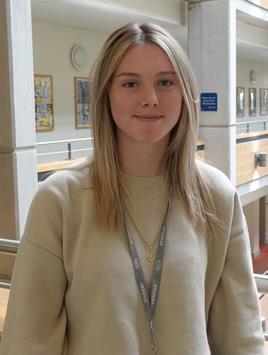
After this course I would like to get an apprenticeship in venue management or social media for setting up music events.
Izzy
Music Performance & Production
Extended Diploma Level 3
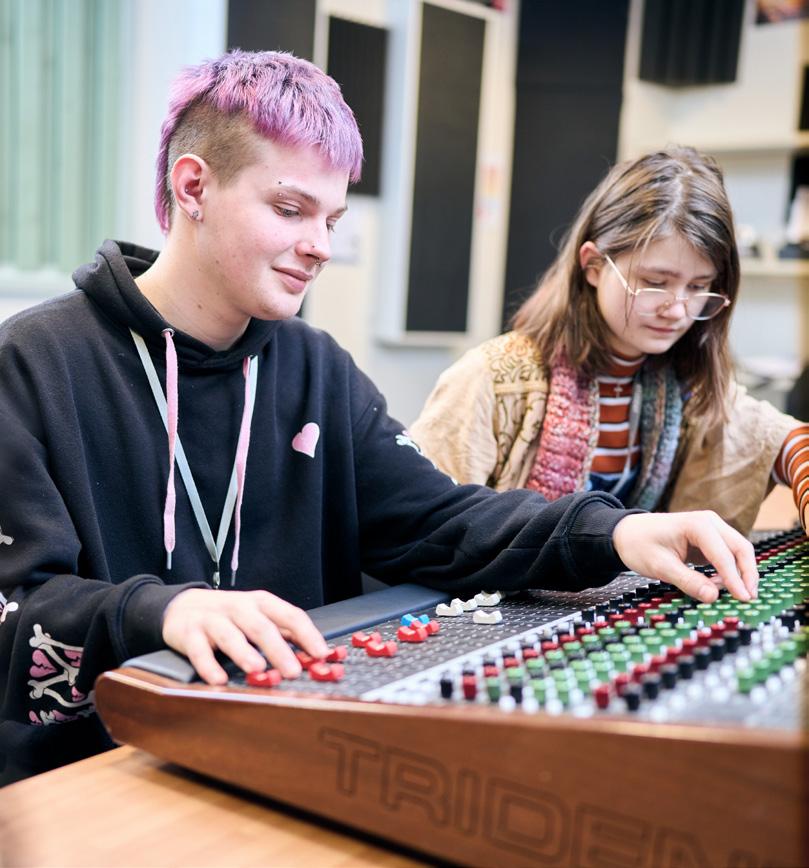
VOCATIONAL & T LEVEL | 128 FIND OUT MORE
Music Performance & Production
Music Performance & Production
Diploma Level 2
One year course
Entry requirements
Please see page 9 for general Vocational Level 2 guidance and check the course description on our website for exact entry requirements for this subject. You can also speak to our tutors at Open Events and Guidance Discussions for further information.
What will I study?
This is a highly practical course designed to introduce students to a range of skills including the basics of studio recording and performance. You will learn by completing a range of projects and assignments based on realistic industry situations. The course is also designed to run alongside maths and English study programmes if required.
Units will include:
• Introduction to Music Performance
• Introduction to Music Production
• Listening Skills for Music Performance and Production
• Exploring Music Composition
• Contextual Research for Performance and Production
• Performance Skills and Practice
• Production Skills and Practice
• Music Performance and Production Project
Your next steps
This course is a good stepping stone to the Level 3 Extended Diplomas in Music, Performing Arts, Dance & Musical Theatre or Production Arts.
Extended Diploma Level 3
Two year course
Entry requirements
Please see page 9 for general Vocational Level 3 guidance and check the course description on our website for exact entry requirements for this subject. You can also speak to our tutors at Open Events and Guidance Discussions for further information.
What will I study?
Units include the following:
• Principles of Music Performance and Production
• Critical Listening and Music Composition
• Music Industry and Professional Practice
• Critical and Contextual Awareness for Music Performance and Production
• Music Production in Context
• Music Performance in Context
• Preparation for Specialist Study in Music Performance and Production
• Collaborative Music Performance Project
• Developing Music Performance and Production Skills
Your next steps
Many of our students go on to study music or related subjects at degree level including music performance, song writing, live sound engineering, studio production, composition or music events management.
MORE ONLINE YORKCOLLEGE.AC.UK
129 | MUSIC
Pathways to Work & Independent Living Programme
I chose York College because I like the sports facilities and the choice of subjects. Overall, I enjoy the company of the Learning Support Practitioners and tutors. I like going on trips and I also enjoy my work placement.


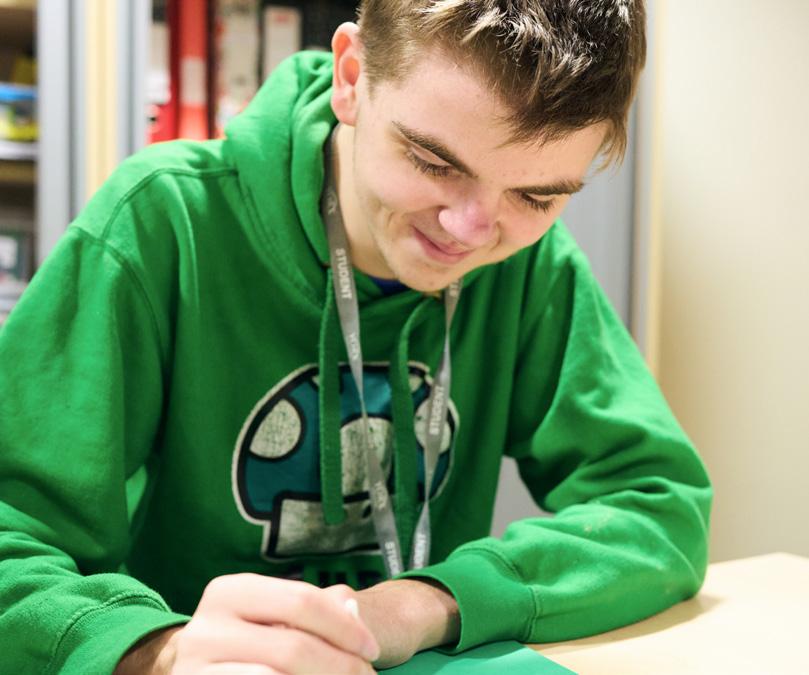
At the moment, I’m not sure what I plan to do after this course, my placement might give me some ideas.
Jack Pathways to Work and Independent Living
VOCATIONAL & T LEVEL | 130
FIND OUT MORE
Pathways to Work & Independent Living Programme
Entry Level 2 and above
One or two year course
The Pathways course is ideal for students working at Entry Level 2, Entry Level 3 and Level 1 who may require a personalised approach to learning designed to meet their individual needs.
The programme is supported with a high ratio of staff to students and is delivered through a combination of theory, practical sessions, visits, speakers and work placements.
Each individual course lasts one year, and students may be entered for Entry 2, Entry 3 or Level 1 at the start of their time at College, depending on ability and prior achievements. The course is designed to be flexible and most students spend one or two years in Pathways.
Entry requirements
If you apply for Pathways, you will attend a guidance discussion where we hope to find out about you as a student and give you a chance to ask any questions you may have about the course. This also allows everyone involved in the process to determine if this is a suitable choice of course for you and parents/carers/support workers are welcome to attend the guidance discussion with you, should you wish to bring them along.
In order to benefit from this programme fully, we advise that you apply if you are currently working at Entry Level 1 as a minimum, as the work is aimed at Entry Level 2 and above.
What will I study?
Students study a range of units to develop skills that prepare them for both work and living independently. The following units are an example of what might be covered over the course of a year:
• Effective Communication
• Preparing for Work Placement
• Healthy Living - including a weekly session of physical activity
• Working as a Team
• Candidate Project
• Searching and Applying for a Job
• Personal Finance
• Enterprise
• Community Project
•
We focus on helping students to prepare for adult life and developing the skills and confidence to achieve progression to other courses, supported internships and work.
The programme also encourages students to develop personal, social and communication skills, offering an excellent opportunity to belong to a small, supportive group of students within the context of the wider College setting.

As part of the Pathways course, all students study English and maths at a level suitable for their needs. This includes working towards an award in English and maths where appropriate. Progression to GCSE Maths and English is available for some students which includes joining classes in the wider College community.
Students will also undertake a work placement one day a week for a term of the course. This can be either supported 1:1 or undertaken with some support from staff who visit students regularly.
Your next steps
Past students have progressed on to:
• The next level within the Pathways programme
• A bespoke programme offering a ‘stepping stone’ to the Vocational programmes whilst continuing to access Pathways for maths, English and some core modules
• Entry Level or Level 1 Vocational programmes
• Open/supported employment
Learning in small classes with a higher level of support may help you to:
• Develop study skills that will allow you to succeed on future courses
• Increase your employability skills
• Work on independent living skills
• Improve communication skills
• Decide on next steps and goals for your future
Please contact Admissions by emailing info@yorkcollege.ac.uk for more information about the programme.
Domestic Cooking MORE ONLINE YORKCOLLEGE.AC.UK
131 | PATHWAYS TO WORK & INDEPENDENT LIVING PROGRAMME
Performance & Production
This course prepares you for the performing arts industry by helping you develop your ability in three disciplines (singing, dancing and acting) making you a multi-faceted performer. What I love about this course is the balance between the three disciplines that are essential skills needed to become successful in this competitive industry.

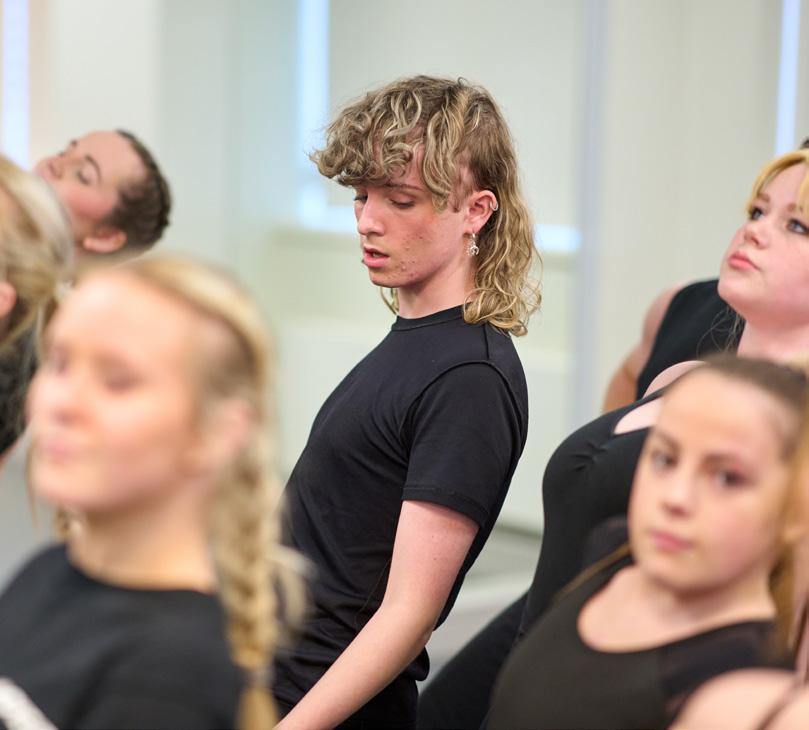
I chose York College due to its diverse approach and outstanding support for all their students.

Lucy
Performing & Production Arts (Musical Theatre) Extended Diploma Level 3
VOCATIONAL & T LEVEL | 132 FIND OUT MORE
Performing & Production Arts
Diploma Level 2
One year course
Entry requirements
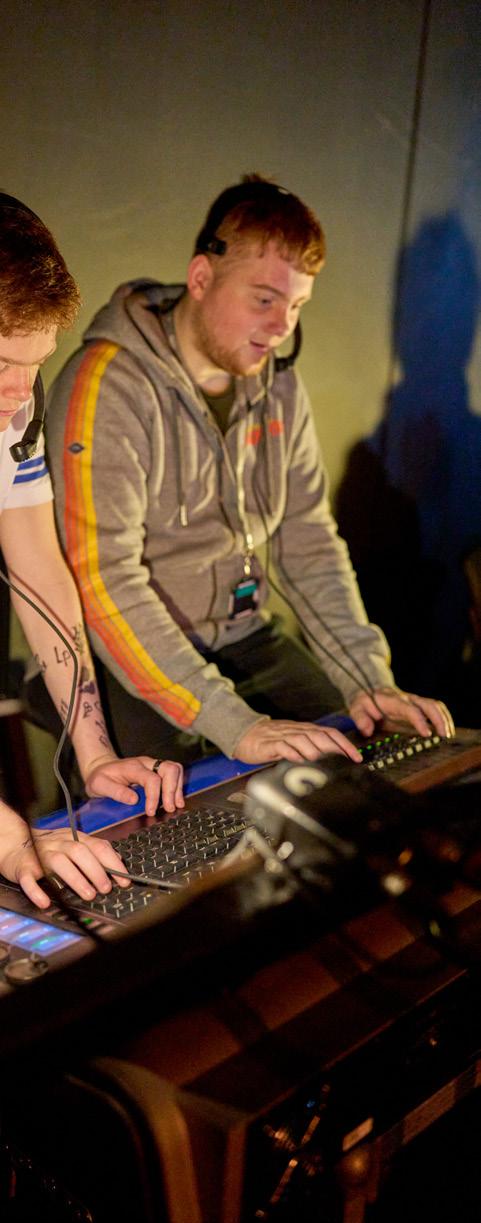
Please see page 9 for general Vocational Level 2 guidance and check the course description on our website for exact entry requirements for this subject. You can also speak to our tutors at Open Events and Guidance Discussions for further information.
What will I study?
You will be introduced to many areas of performance, but in particular acting, technical theatre and elements of dance. With practical skills and knowledge from these, you will develop and prepare yourself towards your own individual needs and progression pathways.
Over the year, practical work and assignments will include a range of projects drawn from core and specialist units. The programme may also include GCSE Maths and English as appropriate for Level 3 progression requirement.
Your next steps
Students who achieve a Merit grade can look to move on to a Level 3 pathway in either Acting, Dance & Musical Theatre or Backstage Arts.
MORE ONLINE YORKCOLLEGE.AC.UK
133 | PERFORMANCE & PRODUCTION
Performing & Production Arts (Acting)
Extended Diploma Level 3 Two year course
Entry requirements
Please see page 9 for general Vocational Level 3 guidance and check the course description on our website for exact entry requirements for this subject. You can also speak to our tutors at Open Events and Guidance Discussions for further information.
What will I study?
Units include:
• Principles of Performance
• Engaging with an Audience
• Introduction to Professional Practice
• Critical and Contextual Awareness
• Production and Performance Skills and Context
• Collaborative Performance Project
• Developing Performance and Production Skills
• Exploration of Specialist Study and Context
Your next steps
An Extended Diploma in Acting, equivalent to 3 A Levels, can lead to further study in acting, theatre, drama, performing arts, and production arts, either at university or at a specialist college or conservatoire. Previous students have secured places at East 15, Arden School of Theatre, Birmingham School of Theatre, Guildhall School of Music and Drama, Bristol Old Vic and LIPA.
Performing & Production Arts (Dance & Musical Theatre)
Extended Diploma Level 3
Two year course
Entry requirements
Please see page 9 for general Level 3 Vocational guidance and check the course description on our website for exact entry requirements for this course. You can also speak to our tutors at Open Events and Guidance Discussions for further information.
What will I study?
Equivalent to 3 A Levels, this is a very practical course; you will study a wide variety of dance and musical theatre styles.
These include:
Year One
Ballet, Contemporary, Commercial, Acrobatics, Singing, Acting, Musical Theatre, Physical Theatre, History of Theatre, Physiology, Progression and many performance projects.
Year Two
Ballet, Contemporary, Commercial, Acrobatics, Singing, Auditions and Applications, Musical Theatre, Children’s Theatre and many performance projects.
Your next steps
An Extended Diploma in Dance & Musical Theatre can lead to further study in Dance or Musical Theatre at university, specialist college or conservatoire. Previous students have secured places at Urdang, Bird, Addict Dance Academy, Laine, Performers College, Italia Conti, Dance Box, Rambert and Trinity Laban.
yorkcollege.ac.uk
& T LEVEL
134
VOCATIONAL
|
Performing & Production Arts (Backstage Arts)
Extended Diploma Level 3
Two year course
Entry requirements
Please see page 9 for general Vocational Level 3 guidance and check the course description on our website for exact entry requirements for this subject. You can also speak to our tutors at Open Events and Guidance Discussions for further information.
What will I study?
A highly practical programme, you will learn by completing a range of projects and assignments based on realistic entertainment productions, activities and demands. All students will explore the following areas before finding a specialism:

• Stage Management
• Set Design & Construction
• Sound Design
• Lighting Design
• Prop Making
Your next steps
Equivalent to 3 A Levels, this course can lead to immediate employment or provide access to the higher education sector.
Past students’ destinations include apprenticeships in major London theatres, programming lighting on cruise ships, stage management with touring theatre companies and set construction at the National Theatre.
Higher education destinations include Bristol Old Vic, Central School of Speech and Drama, Guildhall, Rose Bruford, Backstage Academy and School of Sound Recording (SSR) Manchester.
MORE ONLINE YORKCOLLEGE.AC.UK 135 | PERFORMANCE & PRODUCTION ©
Fiona Whyte
The Applied Science course allows me to learn and improve on my lab skills and I really enjoy the hands-on approach. My time at the College has been an amazing experience. My tutors are very friendly and supportive, and they make learning fun and enjoyable.
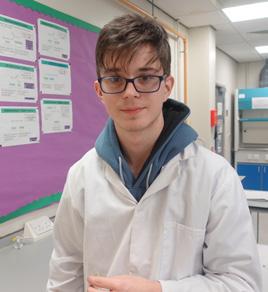

In the future I would like to progress to an apprenticeship in the field of biology.
Nathan Applied Science
Extended Diploma Level 3

Science
VOCATIONAL & T LEVEL | 136 FIND OUT MORE
Foundation/extended Diploma Level 3
One and two year courses
Entry requirements
Please see page 9 for general Vocational Level 3 guidance and check the course description on our website for exact entry requirements for this subject. You can also speak to our tutors at Open Events and Guidance Discussions for further information.
What will I study?
You will continue your study of science, building on what you have learnt in GCSE Science. Students will study all three sciences with an emphasis on practical lab-based biology and chemistry. The course is designed to allow you to develop your knowledge and skills in science as well as transferable and higher order skills required by universities and employers.
Much of the work you do will have a practical start point. You will be set assignments that have a real-world context so that you can see how the science you are studying is used in industry, medicine or other settings.
Year One – Foundation Diploma
Students who successfully complete the first year will be awarded a BTEC Level 3 Foundation Diploma in Applied Science. This is equivalent to 1.5 A Levels.
During the year you will develop your practical and investigative skills. You will learn how to work safely and competently in a lab as well as analyse and evaluate data. You will look specifically at microbiology and industrial chemical reactions.
Year Two – Extended Diploma
Students who successfully complete the second year will be awarded a BTEC Level 3 Extended Diploma in Applied Science. This is equivalent to 3 A Levels.
You will develop your knowledge of science further, with units such as genetics and genetic engineering, biological molecules and metabolic pathways, organic chemistry and applications of medical physics.
Your next steps
Most students will progress from the course to study at university. The course will provide you with the grades or UCAS points required to study a range of higher education courses.
In the past students have gone on to study in a variety of different areas including biology, marine biology, chemistry, biomedical science, radiology, forensic science and paramedic science.
Other students have progressed into employment or an apprenticeship. The course equips you with many transferable skills that are highly sought after by universities and employers alike.
Science 137 | SCIENCE
Applied
Sport & Uniformed Services
There’s so much to learn and such a variety of topics, which aid in all sorts of sporting or medical careers. My aspiration is to become a paediatric physiotherapist and doing this course has prepared me well for university.
Rosie Sport & Exercise Extended Diploma Level 3



VOCATIONAL & T LEVEL | 138 FIND OUT MORE
Fitness Instructing (Gym-Based Exercise)
Certificate Level 2
Personal
Training
One year course
Entry requirements
Please see page 9 for general Vocational guidance and check the course description on our website for exact entry requirements for this subject. You can also speak to our tutors at Open Events and Guidance Discussions for further information.
What will I study?
This is a highly practical course on which you will develop your theoretical and human body knowledge to work effectively with clients to develop and deliver fitness programmes.
Units include:
• Anatomy and Physiology
• Providing a Positive Customer Experience
• Lifestyle Management and Health Awareness
• Gym-based Programme Planning and Preparation
• Programme Delivery and Professional Instruction
Your next steps
On completion of this course, you’ll have an industry recognised qualification enabling you to start to work as a Fitness Instructor immediately. You will be CIMSPA accredited and licensed to practice.
The majority of students progress on to the Level 3 Personal Training qualification or take up employment in the sport and leisure industry.
One year course
Entry requirements
Please see page 9 for general Vocational guidance and check the course description on our website for exact entry requirements for this subject. You can also speak to our tutors at Open Events and Guidance Discussions for further information. You must have completed the Level 2 Certificate in Fitness Instructing prior to starting this course.
What will I study?
This is an ideal qualification for those in the fitness sector who wish to develop and refine their skills. It provides students with the understanding and practical skills needed to work as a Personal Trainer.
Units include:
• Applied Anatomy and Physiology
• Promoting Wellness through Client Motivation and Interaction
• Bespoke Exercise Programme Design
• Customised Exercise Programme Instruction and Communication Techniques
• Nutrition to Support Physical Activity
• Business Acumen for a Successful Personal Training Programme
Your next steps
You could enter employment as a Personal Trainer or combine this with another Level 3 qualification to enter higher education. On completion of the course, you’ll be CIMSPA accredited and be licensed to practice. Some students move into more specialised personal training such as in the Armed Forces.
Our Level 2 Diploma and the Extended Diploma Level 3 are now available.
Please see page 96 for course details.
Certificate Level 3 139 | SPORT & UNIFORMED SERVICES Esports
Sport (Coaching)
Sports Coaching & Development
Diploma Level 2
One year course
Entry requirements
Please see page 9 for general Vocational guidance and check the course description on our website for exact entry requirements for this subject. You can also speak to our tutors at Open Events and Guidance Discussions for further information.
What will I study?
You’ll develop skills to communicate with a range of people and demonstrate effective team working. These qualities will be enhanced through a range of coaching opportunities as part of planning and running a sports event and practical participation in team and individual sports. The structure and function of the body during exercise will also be studied.
Units include:
• Participation in Sport
• Anatomy and Physiology in Sport
• Developing Sporting Skills and Tactical Awareness
• Sports Coaching
• Plan, Deliver and Evaluate a Sports Session
• Health, Exercise and Nutrition
• Introduction for Fitness and Training
You’ll evidence your skills, knowledge and understanding through an evidence-based portfolio.
Your next steps
You may progress to Level 3 qualifications in Sport, Sport and Exercise Science or Uniformed Protective Services. Others interested in fitness may pursue the Fitness Instructing and Personal Training pathways. Some students take up employment in the sports industry.
Foundation Diploma/Extended Diploma Level 3
One and two year courses
Entry requirements
Please see page 9 for general Vocational guidance and check the course description on our website for exact entry requirements for this subject. You can also speak to our tutors at Open Events and Guidance Discussions for further information.
What will I study?
The course is designed to be consistent with current industry practice to enable students to enter employment directly in a sports coaching role or progress to higher education.
Foundation Diploma units include:
• Careers in Sport and Active Leisure
• Health, Well-being and Sport
• Developing Coaching Skills
• Sports Development
• Self-employment in Sport and Physical Activity
Extended Diploma units include:
• Applied Coaching Skills
• Research Project in Sport
• Sports Psychology
• Technical and Tactical Skills in Sport
Your next steps
The course will provide you with the skills and knowledge to progress into the sports coaching and development industry or possibly higher education courses relating to sport studies, sports coaching, sports management, sports development and PE teaching (check providers’ websites for information on entry requirements). There have also been examples of students progressing to non-traditional options including business. Students have also progressed to higher education sports scholarships in the UK and to international universities.
Potential job roles could include employment as a Sports Coach or Sports Development Co-ordinator.
yorkcollege.ac.uk
VOCATIONAL & T LEVEL | 140
Sport & Exercise Science
Extended Diploma Level 3
Two year course Entry requirements
Please see page 9 for general Vocational guidance and check the course description on our website for exact entry requirements for this subject. You can also speak to our tutors at Open Events and Guidance Discussions for further information.
What will I study?
This course is made up of a range of units including:
• Functional Anatomy
• Applied Sport and Exercise Psychology
• Applied Research Methods in Sport and Exercise Science
• Coaching for Performance and Fitness
• Physical Activity for Individual and Group-based Exercise
• Sports Massage
• Nutrition for Sport and Exercise Performance
• Biomechanics in Sport and Exercise Science
Across the two years there will be a combination of internal and external assessments.
Your next steps
The majority of students progress on to higher education courses relating to sport and exercise sciences, sports therapy, physiotherapy, sports psychology, and PE teaching; although there have also been examples of students progressing to non-traditional options including law. Employment progression includes fitness instructing, personal training and coaching. Some students secure higher education scholarships, combining their studies with student athlete programmes.

MORE ONLINE YORKCOLLEGE.AC.UK
141 | SPORT & UNIFORMED SERVICES
Extended Certificate Level 2
Extended Diploma Level 3
One year course
Entry requirements
Please see page 9 for general Vocational guidance and check the course description on our website for exact entry requirements for this subject. You can also speak to our tutors at Open Events and Guidance Discussions for further information.
What will I study?
By undertaking applied theory lessons and work-related learning you’ll gain a good understanding of the role of the uniformed services.
This course is made up of a range of units including:
• The Role and Work of the Public Services
• Working Skills in the Public Services Sector
• Citizenship, Society and the Public Services
• Crime and its Effects on Society and Individuals
• Health, Fitness and Lifestyle for the Public Services
Assessment is via externally set examined units, assignments, case studies, practical observations and presentations.
We have excellent links with the Police Force, Army, Navy, RAF, Fire Service, Ambulance, Prison and Probation Service who actively contribute to the work-related element of the course.
Your next steps
You may progress on to a Level 3 course in Uniformed Protective Services, take up employment at a junior level in the public sector or enter the Armed Forces.
Two year course
Entry requirements
Please see page 9 for general Vocational guidance and check the course description on our website for exact entry requirements for this subject. You can also speak to our tutors at Open Events and Guidance Discussions for further information.
What will I study?
Course content covers areas such as the following:
• Citizenship and Diversity
• Behaviour and Discipline in Uniformed Protective Services
• Physical Preparation, Health and Well-being
• Teamwork, Leadership and Communication
Each year the course consists of one externally assessed unit. The other units are internally assessed and include assignments, practical assessments, presentations and case studies.
The course includes strong work-related opportunities with the Army, Navy, RAF, Fire Service, Ambulance, Police and Prison Service.
Your next steps
This course gives a good understanding of the services, skills and knowledge to make a strong application to the Uniformed Services. Student progression routes include the Armed Forces, Civil Service, Police Community Support Officer (PCSO), Control Support Staff and the Police Constable Degree Apprenticeship (PCDA) an application for which is made directly through the Police Force.
Students also progress on to degree courses such as criminology, policing, disaster management, law and youth & social studies.
yorkcollege.ac.uk
Uniformed
Services
VOCATIONAL & T LEVEL | 142
Uniformed Protective Services
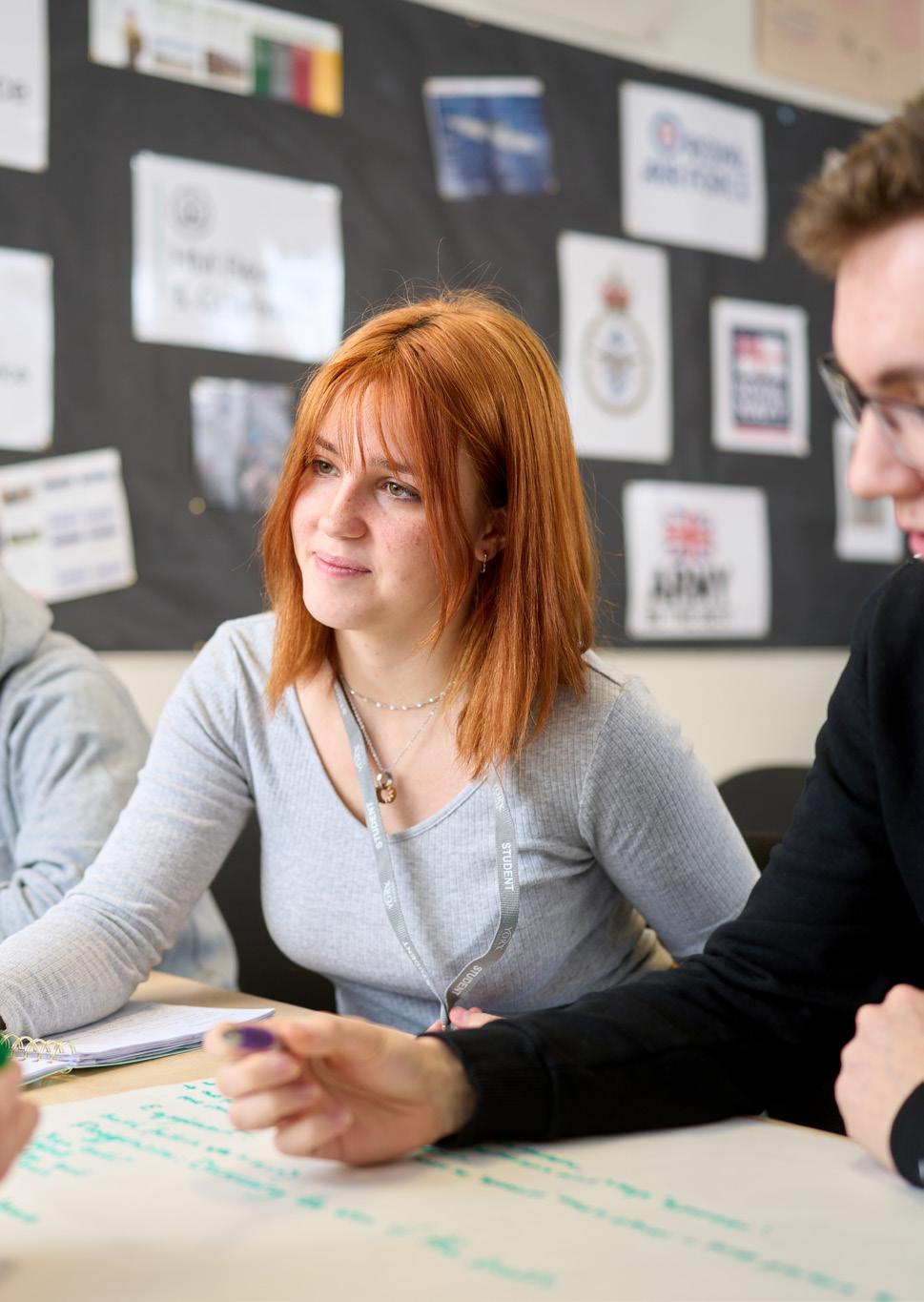
MORE ONLINE YORKCOLLEGE.AC.UK 143 | SPORT & UNIFORMED SERVICES
Apprenticeships

APPRENTICESHIPS | 144
Would you like to earn money, achieve a qualification and gain invaluable work and industry experience?
Work and study at the same time with an Apprenticeship at York College.
We deliver a range of Apprenticeships covering various occupational areas such as Construction, Business, Hospitality, Hair & Beauty, Engineering and Science.

145 | APPRENTICESHIPS
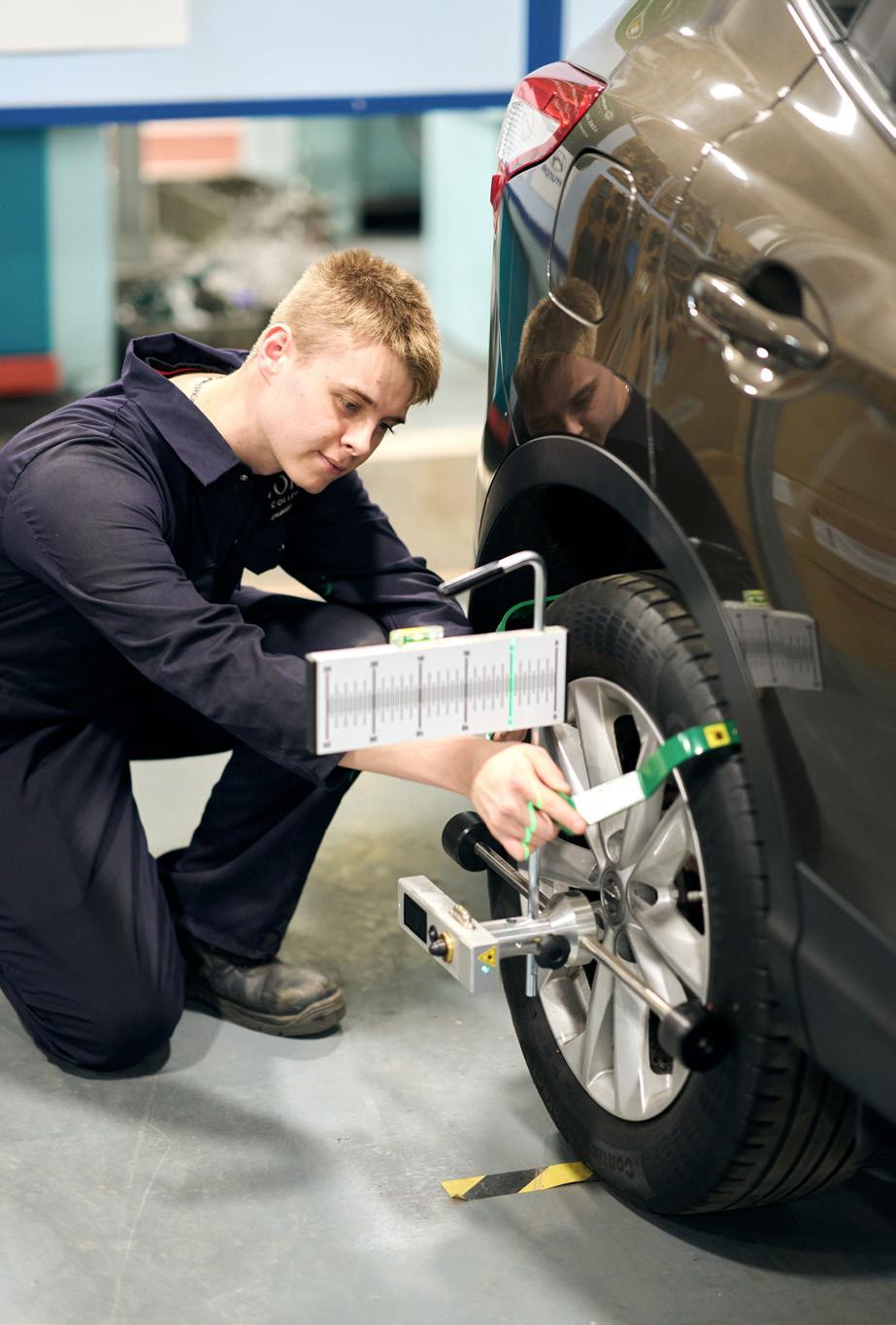
APPRENTICESHIPS | 146
Hair & Beauty Barbering • 169 Hairdressing Professional • 169 Advanced & Creative Hair Professional • 170 Beauty Therapist • 170 Advanced Beauty Therapist • 171 Hospitality Hospitality Team Member • 173 Production Chef • 174 Senior Production Chef • 174 Science Laboratory Technician • 177 Business Accounts/Finance Assistant • 151 Assistant Accountant • 152 Business Administrator • 152 Human Resources Support • 153 Construction Architectural Joinery • • 155 Site Carpentry • • 156 Furniture Manufacturer • 157 Bricklayer • 158 Craft Bricklayer • 158 Construction Support Technician • 159 Stonemason • 161 Plumbing & Domestic Heating Technician • 160 Installation/Maintenance Electrician • 160 Painter & Decorator • 161 Engineering Autocare Technician • 163 Motor Vehicle Service & Maintenance Technician • 163 Engineering Fitter • 164 Engineering Technician • 164 Engineering Draughtsperson • 166 Maintenance & Operations Engineering Technician • 165 Metal Fabricator • 166 LEVEL 2 LEVEL 3 LEVEL 2 LEVEL 3 147 | APPRENTICESHIPS
Course Directory Apprenticeships
What are Apprenticeships?
An apprenticeship is a real job with a contract of employment which is supported by a detailed and specific training programme. This means you are employed with a company, earning a wage whilst working towards your apprenticeship, gaining invaluable on-the-job knowledge and experience from your employer, the industry experts.
WHO CAN BE AN APPRENTICE?
Anyone living in England, has the right to work in England and has an eligible residency status, that is aged 16 or over and not in full-time education can be an apprentice. You must meet the entry criteria for the apprenticeship programme selected.
ENTRY CRITERIA
To start an apprenticeship, you must be employed within a business that covers the range of work required to complete your chosen apprenticeship route, have a contract of employment for a minimum of 30 hours per week (at least 50% of your work must be carried out in England), and meet the entry requirements for the apprenticeship programme.
WHY CHOOSE AN APPRENTICESHIP?
The benefits of doing an apprenticeship are:
• Being employed, therefore earning a salary and experiencing the workplace as a fully-fledged employee, including getting paid holidays
• Learning both in the workplace and College, with the full support of your employer, a College assessor and tutor, along with a mentor at your workplace
• Great future earning potential as you are already on a career pathway
• Fantastic opportunities for real future career development with apprenticeships now offered up to degree level, so apprentices really can climb the career ladder
WAGES
Your employer is responsible for paying your wage. The national minimum wage for apprentices from 2023 is £5.28 per hour and this applies to time working and time spent in training as part of the apprenticeship.
The wage applies to all apprentices aged under 19 and apprentices aged 19 or over in the first year of their apprenticeship. The majority of employers pay above the minimum apprenticeship wage.
DURATION
Duration of apprenticeships vary depending on which programme you choose. These are usually between 1-5 years. You will gain job and industry specific skills in the workplace and may have elements of online learning and/or attend York College for additional learning on day or block release. You will also study Functional Skills in Maths and English, if these are required (this is dependent on your GCSE results).
There will be an independent End-Point Assessment (EPA) and you will not achieve the full apprenticeship without passing this.
An EPA can be any combination of the following, depending on the apprenticeship:
• Professional discussion
• Competency based interview
• Knowledge test
• Practical observations
The EPA is separate to any qualifications or other assessment that the apprentice may undertake during the on programme stage of the apprenticeship. York College allows 3 months
APPRENTICESHIPS | 148
for an EPA to be completed. However, this time frame is a guide only, as apprentices progress and complete at different rates and the College is subject to Government and Awarding Body regulations and environmental changes.
If you are required to do Functional Skills qualifications, you must achieve these before you are put forward to the End-Point Assessment.
HOW TO APPLY
Our apprenticeship vacancies are advertised on our website at yorkcollege.ac.uk/apprenticeships
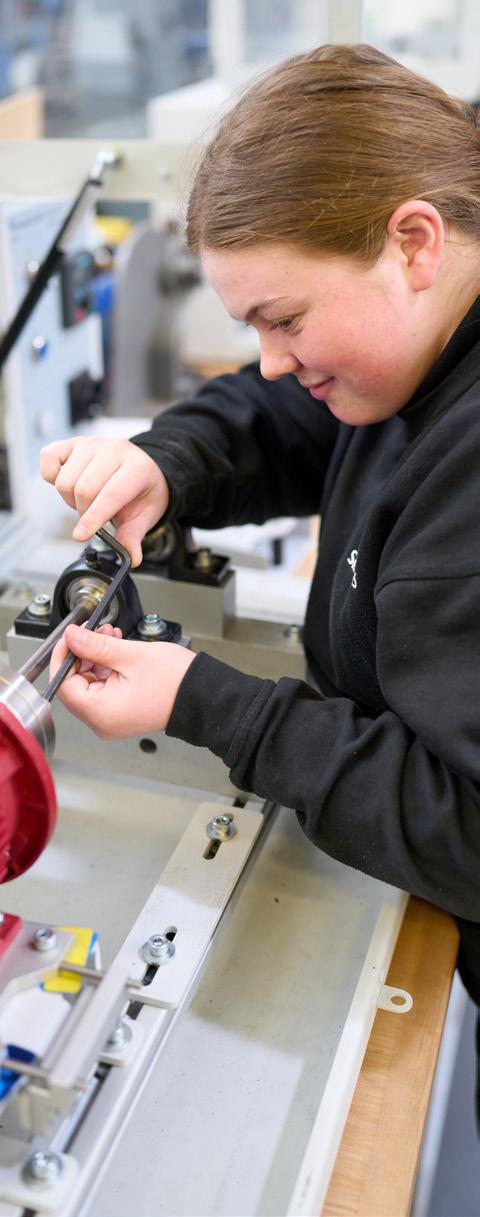
You can find general information about apprenticeships at apprenticeships.gov.uk
You can also get in touch with the York College Apprenticeships Team: apprenticeships@yorkcollege.ac.uk
Please state the apprenticeship you are interested in and we will advise you on how to proceed.
To discuss apprenticeships further please contact the Apprenticeships Team on 01904 770368 and choose option one.
Apprenticeships can also be found using the ‘Find an Apprenticeship’ service at www.gov.uk
PLEASE NOTE
Apprenticeship details are accurate at time of going to print. Due to recent apprenticeship reforms, employers are reviewing and redesigning apprenticeship programmes to ensure a closer direct alignment to employer and industry business needs. This will see the College introducing some new and exciting apprenticeship programmes and also higher-level apprenticeships to support progression and career development opportunities. We will be regularly updating our course information and website as new information is released. If you have any questions please speak directly to a member of the York College Apprenticeships Team.
MORE ONLINE YORKCOLLEGE.AC.UK 149 | APPRENTICESHIPS
I chose this route because I am very passionate about business. The course applies a lot of the knowledge that I learned in A Level Business and makes me think of it in different ways which are relevant to my workplace. I find a lot of content I learn in College comes up at work.
I receive the support that a full-time student does despite only spending one day a week here. My tutor and assessors are always very nice and supportive.
Luke Business Administrator Apprenticeship Level 3


Employer: York Cocoa Works

Business
APPRENTICESHIPS | 150 FIND OUT MORE
Accounts/ Finance Assistant
Apprenticeship Level 2
Typical duration 12 Months + End-Point Assessment
Entry requirements
Employment in a relevant environment for a minimum of 30 hours per week. Please see page 9 for general Apprenticeship guidance and check the course description on our website for exact entry requirements for this subject. You can also speak to our tutors at Open Events and Guidance Discussions for further information.
What will I study?
This qualification will prepare apprentices for junior and entry level accounting roles. It delivers a solid foundation in finance administration, covering areas such as double entry bookkeeping, basic costing principles and using accounting software.

Units include:
• Introduction to Bookkeeping
• Principles of Bookkeeping
• Principles of Costing
• The Business Environment
You will also develop business communications and lifelong learning skills, applying what you learn on the course to the wider industry context.
Your Next Steps
On successful completion of this course, you can progress to higher levels of the AAT Accounting qualifications via apprenticeship training or through part-time courses, or employment such as Accounts Assistant, Finance Assistant, Credit Control Assistant or Purchase Ledger Clerk.
MORE ONLINE YORKCOLLEGE.AC.UK
151 | BUSINESS
Assistant Accountant
Business Administrator
Apprenticeship Level 3
Apprenticeship Level 3
Typical duration 15 Months + End-Point Assessment
Entry Requirements
Employment in a relevant environment for a minimum of 30 hours per week. Please see page 9 for general Apprenticeship guidance and check the course description on our website for exact entry requirements for this subject. You can also speak to our tutors at Open Events and Guidance Discussions for further information.
What will I study?
This internationally recognised AAT qualification enables those working in accounting or those looking to pursue accountancy as a career to gain knowledge, practical experience and the important certification often sought by employers.
Units include:
• Financial Accounting: Preparing Financial Statements
• Management Accounting Techniques
• Tax Processes for Businesses
• Business Awareness
You will also develop business communications and lifelong learning skills, applying what you learn on the course to the wider industry context.
Your next steps
Upon successful completion you can progress on to the Professional Accounting Technician Apprenticeship - AAT Professional Diploma in Accounting at Level 4. You can apply for AAT associate bookkeeping membership and become a professional AAT Bookkeeper (AATQB).
You may also progress into careers such as Finance Officer, Assistant Accountant and Bookkeeper.
Typical duration 18 Months + End-Point Assessment
Entry requirements
Employment in a relevant role for a minimum of 30 hours per week. Please see page 9 for general Apprenticeship guidance and check the course description on our website for exact entry requirements for this subject. You can also speak to our tutors at Open Events and Guidance Discussions for further information.
What
will I study?
This apprenticeship will give you the knowledge, skills and behaviours required to work as a Business Administrator and will include the following:
• Use of multiple IT packages and systems relevant to the organisation in order to write letters or emails, create proposals, perform financial processes, record and analyse data
• Understand how to make effective decisions based on sound reasoning and be able to deal with challenges in a mature way
• Understand how to build and maintain relationships within your own team and across the organisation
• Understand how to share administrative best-practice across the organisation e.g. coach others to perform tasks correctly
Your next steps
This apprenticeship is an ideal stepping-stone into specialist, team leading, supervisory or line management roles within retail and higher-level training and apprenticeships. You may also progress into a more senior role within the business environment, or another career within the business environment, for example accounting.
yorkcollege.ac.uk APPRENTICESHIPS | 152
Human Resources Support
Apprenticeship Level 3
Typical duration 12 Months + End-Point Assessment
Entry Requirements
Employment in a relevant role for a minimum of 30 hours per week. Please see page 9 for general Apprenticeship guidance and check the course description on our website for exact entry requirements for this subject. You can also speak to our tutors at Open Events and Guidance Discussions for further information.
What will I study?
Units include:
• Understand the role and focus of HR within the organisation; its business plan/priorities and how these apply to your role
• Understand how to deliver excellent customer service on a range of HR queries and requirements providing solutions, advice and support primarily to managers
• How to use agreed systems and processes to deliver HR services within your organisation
• Know and understand how to keep up to date with business changes and HR legal/policy/process changes relevant to your role
• Know how to support implementation of HR changes and projects within your business
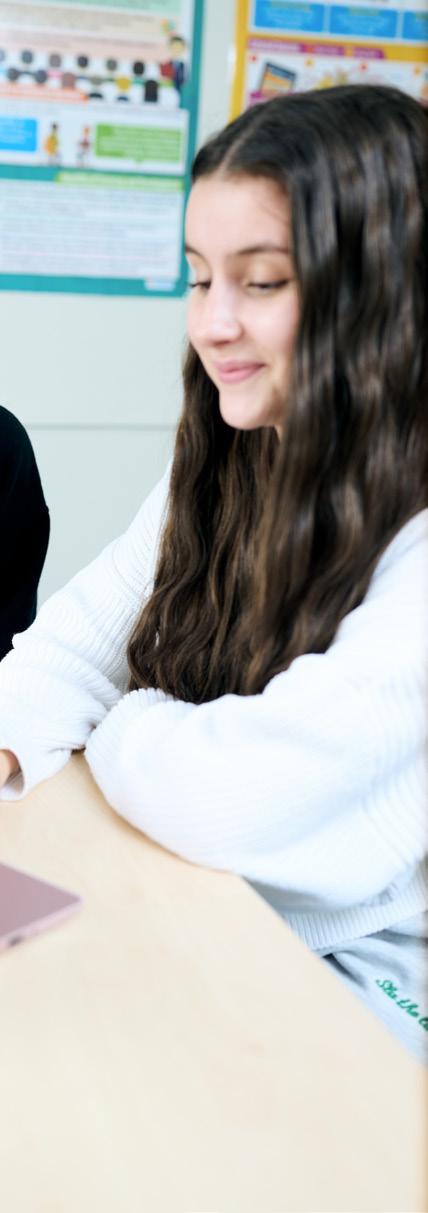
Your next steps
Further progression within an organisation and/or through the HR Consultant/Partner Apprenticeship. You can choose to stay within core Human Resources or diversify into one of the specialist areas of Human Resources. You may also be eligible to apply for associate membership of the Chartered Institute of Personnel and Development (CIPD).
MORE ONLINE YORKCOLLEGE.AC.UK 153 | BUSINESS
Construction
I did the full-time courses before moving on to my apprenticeship. You learn a range of skills from painting woodwork to hanging wallpaper such as wide vinyl.
My tutors are amazing. Whenever you need help, the support is there. I hope to carry on working with the company I’m with now as they have really supported me with College. We do domestic and commercial jobs but at the moment we are working on a Grade 2 listed building and working in Heritage is an amazing experience.


Skye
Painting & Decorating Apprenticeship

Level 2
Employer: Cain Decorators Ltd
APPRENTICESHIPS | 154 FIND OUT MORE
Apprenticeship Level 2
Architectural Joinery
Typical duration 24 Months + End-Point Assessment
Entry requirements
Employment in a relevant role for a minimum of 30 hours per week. Please see page 9 for general Apprenticeship guidance and check the course description on our website for exact entry requirements for this subject. You can also speak to our tutors at Open Events and Guidance Discussions for further information.
What will I study?
Units include:
• Principles of building construction terminology and components, Building Information Modelling (BIM) and environmental and sustainability considerations
• Interpreting and producing relevant information from drawings, specifications and work instructions including the basic principles of Computer Aided Design (CAD)
• How to use hand and power tools including narrow bandsaws, crosscut saws, re-saws, panel saws, surface planers, thicknessers and mortices
• How to manufacture routine architectural joinery products such as door, window, straight stairs and fitting parts, and how to finish products to the specified standard for them to accept a range of finishes
Your next steps
Following completion of this apprenticeship you can work for a business or become self-employed. You can also progress on to higher-level qualifications to increase your skills and knowledge of the construction industry.
Apprenticeship Level 3
Typical duration 12 Months + End-Point Assessment
Entry requirements
Employment in a relevant role for a minimum of 30 hours per week. Please see page 9 for general Apprenticeship guidance and check the course description on our website for exact entry requirements for this subject. You can also speak to our tutors at Open Events and Guidance Discussions for further information.
What will I study?
Units include:
• Set out complex work tasks for non-standard architectural joinery products, including complex door sets, doors, windows, units and fitments, staircases (straight and with turns) and products with single/ double curvature features
• Manufacture complex and shaped (circular and circular on circular) architectural joinery products including doors, windows with opening lights, units and fitments, panelling/cladding, staircases (straight and with turns) and veneers
• Set up and use fixed machinery such as circular saws, planers, thicknessers, bandsaws, mortices, tenoners, spindle moulders, grinders (including tool sharpening) and sanders
• Carry out quality checks of own and others work against specification and take remedial action, providing instructions to others as to the work required
Your next steps
Following completion of this apprenticeship you can work for a business or become self-employed. You can also progress on to higher-level qualifications such as HNC and work in roles such as supervisors in the workplace and then progress on to management level jobs.
155 | CONSTRUCTION
Architectural Joinery
Site Carpentry
Site Carpentry
Apprenticeship Level 2
Apprenticeship Level 3
Typical duration 24 Months + End-Point Assessment
Entry requirements
Employment in a relevant role for a minimum of 30 hours per week. Please see page 9 for general Apprenticeship guidance and check the course description on our website for exact entry requirements for this subject. You can also speak to our tutors at Open Events and Guidance Discussions for further information.
What will I study?
Units include:
• Interpreting and producing relevant information from drawings, specifications and work instructions including the basic principles of Computer Aided Design (CAD)
• How to use hand and power tools including portable circular saws, drills, saws, planers, routers, sanders, multi-functional tools and nail guns
• How to carry out first fixing work including timber frames and linings, timber coverings, flat roof decking, timber stud partitions, straight flights of stairs and installing handrails and spindles to straight flights of stairs
• How to carry out second fixing work including installation of service encasements, cladding, wall and floor units, mouldings, side hung doors and ironmongery
Your next steps
Following completion of this apprenticeship you can work for a business or become self-employed. You can also progress on to higher-level qualifications to increase your skills and knowledge of the construction industry.
Typical duration 12 Months + End-Point Assessment
Entry requirements
Employment in a relevant role for a minimum of 30 hours per week. Please see page 9 for general Apprenticeship guidance and check the course description on our website for exact entry requirements for this subject. You can also speak to our tutors at Open Events and Guidance Discussions for further information.
What will I study?
Units include:
• Install complex and non-standard doors and window frames, shaped door and hatch linings, partitions with openings and changes of direction and staircases with turns
• Erect inclined roofs with gables, roof verges and eaves, including finishings, joists and roof coverings, dormers and features
• Repair and or replace frames, mouldings, floor or flat roof joist coverings, door and window ironmongery, window components, structural joists and rafters, window components, guttering and downpipes
• Carry out quality checks of own and others work against specification and take remedial action, providing instructions to others as to the work required
Your next steps
On completion of this apprenticeship you may progress to a wide range of employment opportunities such as supervisors in the workplace and then progress on to management level jobs. Self-employment or starting a business may also be an option. You may also progress on to higher-level qualifications such as an HNC.
yorkcollege.ac.uk
APPRENTICESHIPS | 156
Furniture Manufacturer
Apprenticeship Level 2
Typical duration 24 Months + End-Point Assessment
Entry requirements
Employment in a relevant role for a minimum of 30 hours per week. Please see page 9 for general Apprenticeship guidance and check the course description on our website for exact entry requirements for this subject. You can also speak to our tutors at Open Events and Guidance Discussions for further information.
What will I study?
Units include:
• Make components of furniture to specification within acceptable tolerances
• Use appropriate equipment to cut materials within acceptable tolerances
• Understand the principles of joints used in making hand-crafted furniture

• Assemble components of furniture
• Understand the sequence of assembly and why this is important
• Measure and mark out materials to specification
• Sand materials for preparation prior to assembly, post-assembly and de-nibbing
• Understand grit sizes and the process of sanding
Your next steps
Progression may include working for a business or self-employment. You can also progress on to higher-level qualifications to increase your skills and knowledge.
MORE ONLINE YORKCOLLEGE.AC.UK 157 | CONSTRUCTION
Bricklayer
Apprenticeship Level 2
Craft Bricklayer
Apprenticeship Level 3
Typical duration 24 Months + End-Point Assessment
Entry requirements
Employment in a relevant role for a minimum of 30 hours per week. Please see page 9 for general Apprenticeship guidance and check the course description on our website for exact entry requirements for this subject. You can also speak to our tutors at Open Events and Guidance Discussions for further information.
What will I study?
• Understand the principles of high-quality customer service and communication to enable you to gain and keep a valued reputation in industry with clients, colleagues and industry representatives such as suppliers and manufacturers
• Understand the different eras, types of construction methods, insulation considerations, sustainability, facilities management, fire, moisture and air protection, fireplaces and chimneys, damp proof courses and the use of brick ties
• Set out and build brickwork, including complex arches and surrounding brickwork, curved on plan, concave and convex brickwork and battered brickwork
• Select appropriate tools, equipment and materials (e.g. trowel, levels, brick ties, DPC, insulation, mixers, lintels etc.) for use when setting out and erecting masonry walling
Your next steps
On completion you may progress to a wide range of employment opportunities in the workplace. Self-employment or starting a business may also be an option. You may also progress on to higher-level qualifications.
Typical duration 12 Months + End-Point Assessment
Entry requirements
Employment in a relevant role for a minimum of 30 hours per week. Please see page 9 for general Apprenticeship guidance and check the course description on our website for exact entry requirements for this subject. You can also speak to our tutors at Open Events and Guidance Discussions for further information.
What will I study?
• Modern methods of construction: timber frame, steel frame, insulated concrete forms, modular and concrete frames, cross laminated timber frames
• The principles of Heritage building, considerations and techniques applicable to the bricklayer
• Planning, prioritising, work scheduling and time management techniques for self and others
• Skills development, covering a range of complex bricklaying techniques; including herringbone/basket weave panels, segmental/semi-circular (rough, axed and gauged) arches, concave/convex brickwork, battered brickwork, tumbling in, corbelling, fireplaces and flue construction
• Promoting collaborative behaviours and teamwork to enable others to achieve high-quality standards, whilst considering the well-being of yourself and others
Your next steps
Following completion of this apprenticeship you may progress into full-time work in the industry or continue with the next level of study.
yorkcollege.ac.uk
APPRENTICESHIPS | 158
Construction Support Technician
Apprenticeship Level 3
Typical duration 24 Months + End-Point Assessment
Entry requirements
Employment in a relevant role for a minimum of 30 hours per week. Please see page 9 for general Apprenticeship guidance and check the course description on our website for exact entry requirements for this subject. You can also speak to our tutors at Open Events and Guidance Discussions for further information.
What will I study?
• Assist with the development of tenders relevant to the construction project, ensuring records of tenders are kept and processed within the required timescales
• How to use digital construction processes and systems and their use in the sector such as Building Information Modelling (BIM) or other computer-based software packages
• Interpret the different types of built environment contracts, project documentation, technical drawings and procurement processes in order to support the production of resource lists
• Use of project tendering, measurement and costing systems to assist with the planning of schedules of work and to provide early warning of problems for all contract phases on site
• Planning, carrying out and managing own work in line with management requirements, assessing tasks, scheduling work, achieving deadlines, reviewing performance and keeping records of work undertaken
Your next steps
Following completion of this apprenticeship, students can progress on to higher-level qualifications such as the Construction Site Supervisor Apprenticeship and the HNC in Construction & the Built Environment.

MORE ONLINE YORKCOLLEGE.AC.UK 159 | CONSTRUCTION
Plumbing & Domestic Heating Technician
Apprenticeship Level 3
Installation/ Maintenance Electrician
Apprenticeship Level 3
Typical duration 48 Months + End-Point Assessment
Entry requirements
Employment in a relevant role for a minimum of 30 hours per week. Please see page 9 for general Apprenticeship guidance and check the course description on our website for exact entry requirements for this subject. You can also speak to our tutors at Open Events and Guidance Discussions for further information.
What will I study?
Units include:
• Health and safety legislation, codes of practice and safe working practices
• Core plumbing systems to include selection, planning, installation, testing, commissioning and de-commissioning, service, maintenance, fault diagnosis and repair techniques on cold water, hot water, central heating, above ground drainage and rainwater systems
• Installation and testing techniques for electrical components and control systems on plumbing and domestic heating systems
We offer either the Fossil Fuel – Natural Gas or Environmental Technologies routes so you will additionally cover the following depending on which route is chosen:
• Selection, installation, testing, commissioning and service and maintenance techniques on domestic downstream natural gas pipework systems and appliances
Or
• Selection, installation, testing, commissioning and service and maintenance techniques on solar thermal, heat pumps and water recycling systems
Your next steps
Apprentices may progress to a wide range of employment opportunities in the workplace. Self-employment or starting a business may also be an option.
Typical duration 48 Months + End-Point Assessment
Entry requirements
Employment in a relevant role for a minimum of 30 hours per week. Please see page 9 for general Apprenticeship guidance and check the course description on our website for exact entry requirements for this subject. You can also speak to our tutors at Open Events and Guidance Discussions for further information.
What will I study?
Units include:
• The principles, practices and legislation for the termination and connection of conductors, cables and cords in electrical systems
• The practices and procedures for the preparation and installation of wiring systems and electrotechnical equipment in buildings, structures and the environment
• The principles, practices and legislation for the inspection, testing, commissioning and certification of electrotechnical systems and equipment in buildings, structures and the environment
• The principles, practices and legislation for diagnosing and correcting electrical faults in electrotechnical systems and equipment in buildings, structures and the environment
• The electrical principles associated with the design, building, installation and maintenance of electrical equipment and systems
Your next steps
On completion of this apprenticeship, you can potentially progress on to higher apprenticeships or employment, working for small electrical contractors to large multinational companies. You can also become self-employed or set up your own business.
yorkcollege.ac.uk
APPRENTICESHIPS | 160
Painter & Decorator
Stonemason
Apprenticeship Level 2
Apprenticeship Level 2
Typical duration 24 Months + End-Point Assessment
Entry requirements
Employment in a relevant role for a minimum of 30 hours per week. Please see page 9 for general Apprenticeship guidance and check the course description on our website for exact entry requirements for this subject. You can also speak to our tutors at Open Events and Guidance Discussions for further information.
What will I study?
Units include:
• How to prepare the work area safely providing dust sheets and protection to furniture and adjacent surfaces
• How to identify different industry sectors such as new construction, social housing, residential, refurbishment, commercial and Heritage
• How to advise clients about basic colour choices, recommend appropriate products for differing scenarios and sector, and identify and rectify common surface coating and wall covering problems
• How to use different application methods: brush, roller, spray, power-assisted rollers and special effect tools
• How to use wallpaper, using techniques for the hanging of lining paper, standard papers, digital print and wide width including matching patterns, internal and external corners
Your next steps
Apprentices may progress on to a wide range of employment opportunities in the workplace. Self-employment or starting a business may also be an option. You may also progress on to higher-level qualifications.
Please check our website for the latest information on Painter & Decorator course levels available.
Typical duration 24 Months + End-Point Assessment
Entry requirements
Employment in a relevant role for a minimum of 30 hours per week. Please see page 9 for general Apprenticeship guidance and check the course description on our website for exact entry requirements for this subject. You can also speak to our tutors at Open Events and Guidance Discussions for further information.
What will I study?
Units include:
• Select, use and maintain tools, components and equipment appropriate to the task being carried out
• Interpret the appropriate work plan for the job, taking into account factors such as building age, listed status, accessibility, quality of surrounding structures, other trades in the work area, customers and related legislation and regulations
• Produce or repair standard architectural enrichments, prepare backgrounds to receive masonry and to set out basic masonry on buildings/structures
Banker Mason will:
• Make moulds and templates to produce standard and bespoke stonemasonry components as required and conserve or restore stonemasonry, brickwork or earthen structures
Heritage Mason will:
• Prepare backgrounds to receive stone cladding and set out basic external stonemasonry on Heritage buildings/structures and conserve or restore existing stonemasonry, brickwork or earthen structures on Heritage structures
Your next steps
On completion you can progress to a wide range of employment opportunities in the workplace. Self-employment or starting a business may also be an option. You may also progress on to higher-level qualifications.
161 | CONSTRUCTION
I am currently doing a Draughtsperson apprenticeship in order to become a Design Engineer for Siemens. I really enjoy the variety of subjects that this course provides. Instead of studying one discipline within engineering we explore wider aspects of the industry.
Siemens chose York College because of the great facilities here. My experience at College has been good, tutors are helpful and most are ex-industry so they have lots of first hand experience.


Apprenticeship Level 3
Employer: Siemens Mobility

Engineering
Ethan Engineering Draughtsperson
APPRENTICESHIPS | 162 FIND OUT MORE
Autocare Technician
Motor Vehicle Service & Maintenance Technician
Apprenticeship Level 2
Typical duration 24 Months + End-Point Assessment
Entry Requirements
Employment in a relevant role for a minimum of 30 hours per week. Please see page 9 for general Apprenticeship guidance and check the course description on our website for exact entry requirements for this subject. You can also speak to our tutors at Open Events and Guidance Discussions for further information.
What will I study?
Units include:
• Understand and can carry out vehicle safety inspections and routine maintenance in line with manufacturer’s specifications or approved schedules, company procedures and complete approved documentation
• Understand how to carry out the replacement of components on a specific range of vehicle systems including steering and suspension, braking systems, battery and charging systems, exhaust systems and air-conditioning systems
• Use a wide range of specialist tools and equipment, mechanical and electrical measuring tools and diagnostic equipment to support fault identification and repair
• Demonstrate and use specific company IT systems within the workplace, including point-of-sale systems and hand-held devices
Your next steps
On completion of this apprenticeship you will be eligible to apply for IMI membership as a Registered Young Professional or as an Associate Member. You can also progress on to the Motor Vehicle Service and Maintenance Technician apprenticeship Level 3.
Apprenticeship Level 3
Typical duration 24 Months + End-Point Assessment
Entry requirements
Employment in a relevant role for a minimum of 30 hours per week. Please see page 9 for general Apprenticeship guidance and check the course description on our website for exact entry requirements for this subject. You can also speak to our tutors at Open Events and Guidance Discussions for further information.
What will I study?
Units include:
• Use a range of diagnostic equipment and follow recognised diagnostic procedures, logical diagnostic sequence and apply advanced diagnostic principles and problem-solving techniques to establish faults
• Carry out fundamental tasks associated with removal and replacement procedures on a vehicle and follow recognised repair procedures to complete a wide range of repairs
• Contribute to problem-solving discussions and enjoy finding solutions to own and other people’s problems and suggest ways to make the business more efficient and contribute to its commercial growth
You will complete an F-Gas qualification and produce a logbook of evidence demonstrating examples of your work.
Your next steps
This apprenticeship has been designed to be recognised by relevant professional engineering institutions and successful apprentices can apply for the appropriate level of professional registration (EngTech). Job roles include Diagnostic Technician, MOT Inspector, or self-employment and starting your own business.
163 | ENGINEERING
Engineering Fitter
Engineering Technician APPRENTICESHIPS
Apprenticeship Level 3
Apprenticeship Level 3
Typical duration 42 Months + End-Point Assessment
Entry requirements
Employment in a relevant role for a minimum of 30 hours per week. Please see page 9 for general Apprenticeship guidance and check the course description on our website for exact entry requirements for this subject. You can also speak to our tutors at Open Events and Guidance Discussions for further information.
What will I study?
Units include:
• Interpreting and following drawings/diagrams and/or specifications for required component or assembly
• Planning work activity, including resources, equipment and tooling
• Producing individual components; for example keys, pipework, threading, wiring looms, interfacing parts, motors, wiring cables
• Re-furbishing components
• Assembling components to produce equipment, machine or system - in full or part
• Quality checking and adjusting components or assembly against required specification; for example testing and calibrating
You will also work towards the Advanced Manufacturing Engineering Diploma and produce a portfolio of evidence.
Your next steps
This apprenticeship has professional recognition: Institution of Engineering and Technology - Engineering Technician. You can also work towards higher-level apprenticeships and qualifications.
Typical duration 42 Months + End-Point Assessment
Entry requirements
Employment in a relevant role for a minimum of 30 hours per week. Please see page 9 for general Apprenticeship guidance and check the course description on our website for exact entry requirements for this subject. You can also speak to our tutors at Open Events and Guidance Discussions for further information.
What will I study?
This apprenticeship offers two different routes:
• Mechatronics Maintenance Technician – you will cover a broad range of activities including installation, testing, fault finding and the on-going planned maintenance of complex automated equipment. This requires the application of a complex blend of skills, knowledge and occupational behaviours across the electrical, electronic, mechanical, fluid power and control systems disciplines.
• Technical Support Technicians – you will provide technical support and expertise for all areas of the Engineering and Manufacturing function including communications software, analysis tools, production scheduling/planning, product technical applications and capability, engineering drawing, purchasing and/or supply of goods or services for engineering activities, quality control, components/systems and how they interact.
You will also work towards the Advanced Manufacturing Diploma Level 2 and 3.
Your next steps
Completion of the apprenticeship is designed to be recognised by relevant professional engineering institutions at the appropriate level of professional registration (EngTech). You can also work towards higher-level apprenticeships and qualifications.
yorkcollege.ac.uk
| 164
Maintenance & Operations Engineering Technician
Apprenticeship Level 3
Typical duration 42 Months + End-Point Assessment
Entry requirements
Employment in a relevant role for a minimum of 30 hours per week. Please see page 9 for general Apprenticeship guidance and check the course description on our website for exact entry requirements for this subject. You can also speak to our tutors at Open Events and Guidance Discussions for further information.
What will I study?
This apprenticeship will give you the knowledge, skills and behaviours required to work as a Maintenance & Operations Engineering Technician, and we offer the following routes:
• Electrical Technician
• Mechanical Technician
• Electrical System and Process Control Technician
• Electromechanical Technician
You will also work towards the Advanced Manufacturing Engineering Diploma and produce a portfolio of evidence.
Your next steps
This apprenticeship has professional recognition: Institution of Engineering and Technology - Engineering Technician. You can also work towards higher-level apprenticeships and qualifications.

MORE ONLINE YORKCOLLEGE.AC.UK 165 | ENGINEERING
Metal Fabricator
Engineering Draughtsperson
Apprenticeship Level 3
Apprenticeship Level 3
Typical duration 42 Months + End-Point Assessment
Entry requirements
Employment in a relevant role for a minimum of 30 hours per week. Please see page 9 for general Apprenticeship guidance and check the course description on our website for exact entry requirements for this subject. You can also speak to our tutors at Open Events and Guidance Discussions for further information.
What will I study?
Units include:
• Set up, check and adjust the equipment for use in the safe and reliable fabrication of metal products or components and maintaining the equipment in a reliable and safe condition throughout
• Interpret technical drawings, patterns, templates and specifications to mark out, produce and assemble complex fabricated products to meet the required specification and quality requirements
• Use appropriate tools, equipment and techniques to shape and form (hot or cold) metal materials, demonstrating and applying knowledge of material properties and characteristics throughout
• Operate appropriate tools and equipment to join metal parts using a range of mechanical fasteners and fixing techniques
• Operate thermal joining equipment to join metal parts using a range of appropriate techniques to the standards required by the specifications for the fabrication activity being carried out
Your next steps
On completion of this apprenticeship, you can progress on to higher-level apprenticeships or the HNC in Engineering.
Typical duration 42 Months + End-Point Assessment
Entry requirements
Employment in a relevant role for a minimum of 30 hours per week. Please see page 9 for general Apprenticeship guidance and check the course description on our website for exact entry requirements for this subject. You can also speak to our tutors at Open Events and Guidance Discussions for further information.
What will I study?
Units include:
• Know and understand how to employ the appropriate use of computer-based technology including 2D and 3D modelling
• Know and understand the common engineering principles and the application of maths and science to engineering and understand the impact of relevant factors that are important to the design
• Know and understand the relevance and application of Building Information Modelling (BIM)
• Understand and demonstrate how to use effective communication and interpersonal skills, showing sensitivity to others and working collaboratively
• Know and understand Process and Instrument Diagrams (P&ID)
• Know and understand about the general arrangements of structures showing multiple materials including steel, concrete, masonry, timber
Your next steps
This apprenticeship has been designed to meet the professional standards of the Engineering Council for registration as an Engineering Technician (EngTech). If supported by your employer, progression could include HNC/HND/Degree (BEng) in a relevant discipline, and/or a higher apprenticeship.
Machinist Apprenticeship Level 3 is currently in development. Please see our website for the most up-to-date information.
yorkcollege.ac.uk APPRENTICESHIPS | 166

MORE ONLINE YORKCOLLEGE.AC.UK 167 | ENGINEERING
Hair & Beauty
I chose this course because I enjoy the practical side of things, so decided to do an apprenticeship. I visited the College in Year 11 and decided that Hairdressing would be the best option for me.
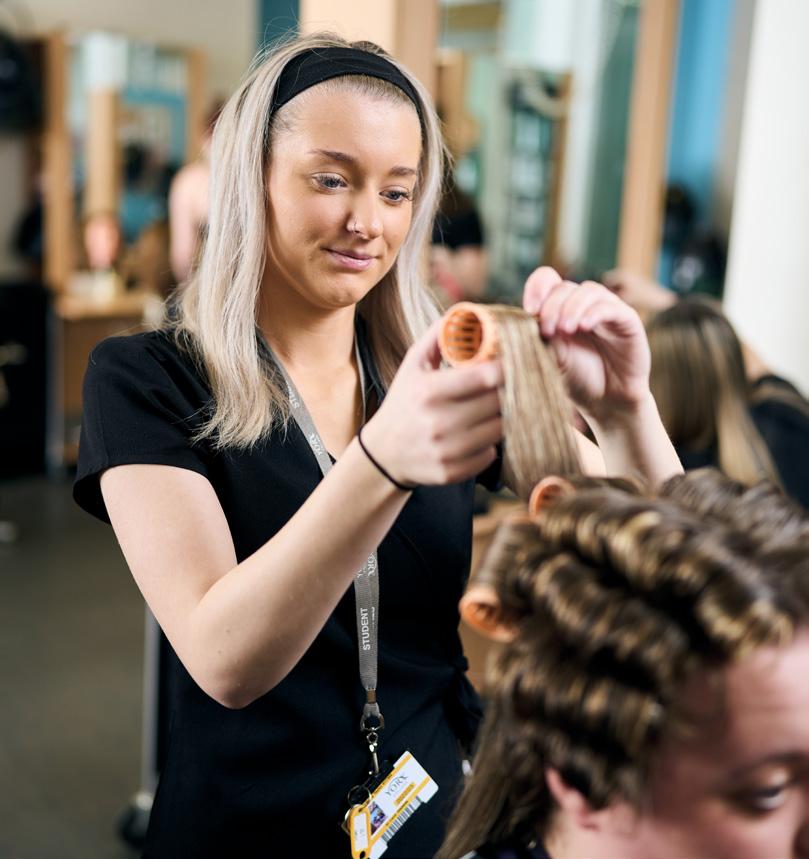
My experience here has been good, I am enjoying my course and there is lots of help on offer if you are ever unsure. In the future I’d like to be a Stylist in a hair salon.

Lily Hairdressing Professional Apprenticeship Level 2
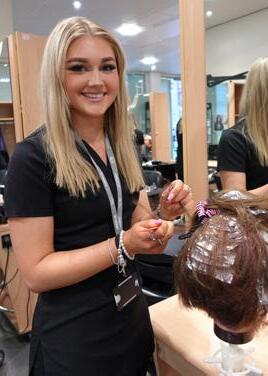
Employer: Watkins Wright
Hairdressing & Beauty
APPRENTICESHIPS | 168 FIND OUT MORE
Apprenticeship Level 2
Hairdressing Professional
Apprenticeship Level 2
Typical duration 18 Months + End-Point Assessment
Entry Requirements
Employment in a relevant role for a minimum of 30 hours per week. Please see page 9 for general Apprenticeship guidance and check the course description on our website for exact entry requirements for this subject. You can also speak to our tutors at Open Events and Guidance Discussions for further information.
What will I study?
This apprenticeship will give you the knowledge, skills and behaviours required to work as a Barber.
Units include:
• Client consultation
• Shampoo, condition and treat hair and scalp
• Cutting hair using barbering techniques to create a variety of looks
• Style and finish men’s hair
• Cutting facial hair into shape
• Provide shaving services
Observations and knowledge tests will be used to assess skills, knowledge and behaviours required for the Level 2 Diploma for Hair Professionals.
Your Next Steps
Job opportunities following completion of this qualification include Junior Barber, Barber, Colour Specialist, self-employment, starting your own business or higher-level apprenticeships.
Typical duration 24 Months + End-Point Assessment
Entry Requirements
You must be employed in a relevant role for a minimum of 30 hours per week. Please see page 9 for general Apprenticeship guidance and check the course description on our website for exact entry requirements for this subject. You can also speak to our tutors at Open Events and Guidance Discussions for further information.
What will I study?
This apprenticeship will give you the knowledge, skills and behaviours required to work as a Hairdresser.
Units include:
• Professionalism and standards
• Behaviour and communication
• Safe working practices
• Consultation
• Shampoo, condition and treat the hair and scalp
• Cut hair using a range of techniques to create a variety of looks
• Style and finish hair using a range of techniques to achieve a variety of looks
• Colour and lighten hair using a range of techniques
• Perming hair
Observations and knowledge tests will be used to assess skills, knowledge and behaviours required for the Level 2 Diploma for Hair Professionals.
Your Next Steps
Job opportunities following completion of this apprenticeship include Junior Stylist, Stylist, Colour Technician, self-employment, starting your own business or progression on to the Advanced and Creative Professional Hair Apprenticeship Level 3.
Barbering 169 | HAIR & BEAUTY
Advanced & Creative Hair Professional
Apprenticeship Level 3
Beauty Therapist
Typical duration 12 Months + End-Point Assessment
Entry requirements
You must be employed in a relevant environment for a minimum of 30 hours per week. Please see page 9 for general Apprenticeship guidance and check the course description on our website for exact entry requirements for this subject. You can also speak to our tutors at Open Events and Guidance Discussions for further information.
What will I study?
This apprenticeship will give you the knowledge, skills and behaviours required to work as a Hairdresser.
Units include:
• Monitor procedures to safely control work operations
• Provide hairdressing consultation services
• Creatively colour and lighten hair
• Creatively style and dress hair
• Creatively cut hair using a combination of techniques
• Hair colour correction service
• Cut men’s hair using basic techniques
You will also put together a collection of looks which will inform the Professional Discussion during the End-Point Assessment.
Your Next Steps
Job opportunities following completion of this qualification include Junior Stylist, Stylist, Colour Technician, self-employment, starting your own business, or progression on to higher-level apprenticeships.
Apprenticeship Level 2
Typical duration 15 Months + End-Point Assessment
Entry Requirements
You must be employed in a relevant role for a minimum of 30 hours per week. Please see page 9 for general Apprenticeship guidance and check the course description on our website for exact entry requirements for this subject. You can also speak to our tutors at Open Events and Guidance Discussions for further information.
What will I study?
This apprenticeship will give you the knowledge, skills and behaviours required to work as a Beauty Therapist.
Units include:
• Carrying out beauty therapy treatments in line with legal, industry and organisational requirements, maintaining honesty, integrity and confidentiality
• Selecting, using and applying a range of beauty therapy techniques, products, tools and equipment to provide:
• waxing services (legs, underarms, face and bikini line)
• hand and nail treatments
• foot treatments
• facial skin care treatments
• eyelash and eyebrow treatments
• make-up application
• basic massage treatments (back, neck and shoulder)
Study will include working towards the Level 2 Diploma for Beauty Professionals - Beauty Therapist.
Your next steps
You could progress to a Level 3 qualification or apprenticeship to further enhance your skills.
yorkcollege.ac.uk
APPRENTICESHIPS | 170
Advanced Beauty Therapist
Apprenticeship Level 3
Typical duration 18 Months + End-Point Assessment
Entry Requirements
You must be employed in a relevant role for a minimum of 30 hours per week. Please see page 9 for general Apprenticeship guidance and check the course description on our website for exact entry requirements for this subject. You can also speak to our tutors at Open Events and Guidance Discussions for further information.
What will I study?
This apprenticeship will give you the knowledge, skills and behaviours required to work as a Beauty Therapist to provide, design and implement bespoke treatment plans.
Units include:
• Complete advanced consultations including in-depth client lifestyle profiling
• Design, implement and perform advanced bespoke manual therapies on the face, scalp and body
• Design, implement and perform advanced facial technical (electrical or mechanical) therapy treatments
• Provide post treatment aftercare and product advice for advanced manual and technical therapies
• Promote sales and additional services to enhance the customer experience and overall treatment results
Your Next Steps
On completion of this apprenticeship you will be qualified to work in roles such as Advanced Beauty Therapist, Head Therapist, Senior Therapist, become self-employed or start your own business. You can also look at higher-level apprenticeships such as Team Leader and Management or other industry-based qualifications.

MORE ONLINE YORKCOLLEGE.AC.UK 171 | HAIR & BEAUTY
Hospitality
I chose this course as it allows me to work alongside learning. I like that I am able to push and challenge myself during practicals as well as being able to socialise with other young people in the same situation as me.
Tutors have been very supportive especially when I have been entering competitions and trying to stretch myself in practical sessions.
Fraser
Production Chef Apprenticeship Level 2
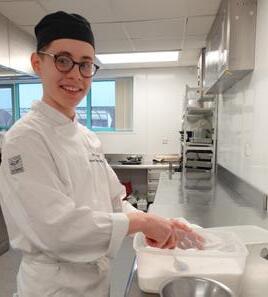

Employer: Grays Court Hotel

APPRENTICESHIPS | 172 FIND OUT MORE
Hospitality Team Member

Apprenticeship Level 2
Typical duration 12 Months + End-Point Assessment
Entry requirements
Employment in a relevant role for a minimum of 30 hours per week. Please see page 9 for general Apprenticeship guidance and check the course description on our website for exact entry requirements for this subject. You can also speak to our tutors at Open Events and Guidance Discussions for further information.
What will I study?
Units include:
• Understand how to use clear and engaging communication to establish a good rapport with customers and ask relevant questions to determine their needs
• Understand how to deliver excellent customer service in line with the business/brand standards with the aim of exceeding customer expectations
• Understand how personal discipline in approach to work, for example timekeeping, attendance, personal appearance, personal presentation and conduct can all have an impact on the business/brand reputation
• Understand how to ensure each stage of food and beverage service meets business/brand standard, including for example, customer arrival, provision of information, promoting menu and other items, taking and processing orders, serving food and drink
Your next steps
On successful completion of the apprenticeship there could be a possibility of moving on to the Level 3 Team Member Apprenticeship or other Level 3 Apprenticeships in the relevant area, or into a more senior role within the establishment.
MORE ONLINE YORKCOLLEGE.AC.UK
173 | HOSPITALITY
Production Chef
Senior Production Chef
Apprenticeship Level 2
Apprenticeship Level 3
Typical duration 12 Months + End-Point Assessment
Entry requirements
Employment in a relevant role for a minimum of 30 hours per week. Please see page 9 for general Apprenticeship guidance and check the course description on our website for exact entry requirements for this subject. You can also speak to our tutors at Open Events and Guidance Discussions for further information.
What will I study?
Units include:
• Check, prepare, assemble, cook, regenerate, hold and present food meeting the needs of the customers and maintaining organisational standards and procedures
• Use kitchen tools and equipment safely and correctly to produce consistently high-quality dishes according to specifications
• Understand how to produce dishes to suit individuals’ specific dietary, religious and allergenic needs as required
• Understand how to operate within all regulations, legislation and procedural requirements and complete and maintain all documentation in relation to this
• Understand how to maintain quality and consistency in food production by using resources in line with organisations’ financial constraints, style, specifications and ethos
Your next steps
On successful completion apprentices could progress on to the Senior Production Chef or Chef de Partie Apprenticeship or into a more senior role within the organisation.
Typical duration 12 Months + End-Point Assessment
Entry requirements
Employment in a relevant role for a minimum of 30 hours per week. Please see page 9 for general Apprenticeship guidance and check the course description on our website for exact entry requirements for this subject. You can also speak to our tutors at Open Events and Guidance Discussions for further information.
What will I study?
Units include:
• Understand and supervise the production of centrally developed menu items and dishes according to organisational specifications
• Understand and supervise the monitoring of the correct use and maintenance of food production equipment and the procedure for dealing with misuse and malfunctions
• Understand the importance of combining nutrient groups to produce balanced menu items and dishes
• Support team members to ensure the timely delivery of high-quality food to the specification required
• Understand the importance of monitoring the team’s understanding and compliance with all relevant industry specific regulations, legislation and procedures
• Understand how to operate efficiently to deliver profit margins, reduce wastage and support the overall financial performance of the business
Your next steps
On successful completion of the apprenticeship there may be an opportunity to study a higher-level qualification or progress into a management role within the organisation.
yorkcollege.ac.uk APPRENTICESHIPS | 174

YORKCOLLEGE.AC.UK 175 | HOSPITALITY
MORE ONLINE
All the staff have been incredibly helpful and passionate about their teaching. I have had very interesting and varied discussions with my tutors, and they are all kind and helpful. The practical lab experience is an important element for working in a laboratory environment.

Following completion of my apprenticeships I intend to develop my scientific skills and continue my employment at the University of Leeds.
Alex Laboratory Technician Apprenticeship
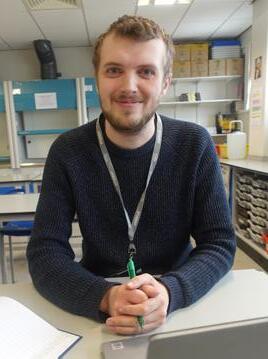
Employer: University of Leeds

Science
APPRENTICESHIPS | 176 FIND OUT MORE
Laboratory Technician
Apprenticeship Level 3
Typical duration 24 Months + End-Point Assessment
Entry requirements
Employment in a relevant environment for minimum of 30 hours per week. Please see page 9 for general Apprenticeship guidance and check the course description on our website for exact entry requirements for this subject. You can also speak to our tutors at Open Events and Guidance Discussions for further information.
What will I study?
You will work towards the BTEC Level 3 Diploma in Applied Science which will include:
• Follow quality procedures to meet the requirements of quality standards relevant to the workplace
• Prepare for laboratory tasks using the appropriate scientific techniques, procedures and methods
• Perform laboratory tasks following specified methodologies, such as Standard Operating Procedures
• Use of specified instrumentation and laboratory equipment, including calibration where required
• Produce reliable, accurate data and keep accurate records of laboratory work undertaken and results
• Analyse, interpret and evaluate data and identify results requiring further investigation seeking advice of senior colleagues as appropriate
• Apply scientific techniques for data presentation
e.g. statistics
Your next steps
Ideally, once you have completed your apprenticeship you will have a job with your employer. From the Level 3 Laboratory Technician Advanced Apprenticeship, you can then progress on to higher-level apprenticeships.

MORE ONLINE YORKCOLLEGE.AC.UK
177 | SCIENCE
CONTACTING PARENTS & CARERS
Throughout a student’s time at College, parents and carers are kept informed and involved through a number of activities including:
• A start of year Welcome Evening where you have the chance to meet key College staff. At this event you will also receive their contact details at College e.g. telephone number and email address
• ‘Live’ access to the Parent Portal, providing information on attendance, marks, tutor comments and planning next steps
• Parent/Carer Evenings in the spring term, which give you the chance to meet your child’s tutors and discuss their progress
• Parents and carers are also asked to take part in our Parent and Carer Satisfaction Surveys
If you wish to discuss any aspect of your child’s education and progress please do not hesitate to contact their Progress Coach throughout the year.
been withdrawn. In cases where we do not get this permission, we will strongly encourage the student to inform you that they have withdrawn this consent.
Students who withdraw their consent to contact parents or carers must provide the College with an emergency contact; the individual named as the emergency contact should know that they have been named and confirm that they are happy to act in that capacity.

If consent is not withdrawn by your child/ward, the College will continue to contact you until the student leaves the College, or reaches the age of 18, whichever is the later date.
In the event that a student is taken ill, the College will contact the person identified by the student, and held within the College’s student records, as their ‘Emergency Contact’.
Students who are under the age of 16 or who are deemed to be a ‘vulnerable adult’ are informed that, as a condition of their enrolment, the College will ordinarily communicate with their parents or carers regarding the following:
• Absence from College (activities)
• Academic progress
• Any matters of concern
Signing the College enrolment form implies your child/ward’s consent to the College communicating with you as their parents or carers.
Data Protection Legislation states that any child over the age of 16 reserves the right to withdraw their consent for the College to contact you. Should this happen, we are required to get express [written] permission from the student to allow us to inform you that this consent has
CONTACTING PARENTS & CARERS | 178
statement & disclaimer
DISCLAIMER
Every care has been taken to ensure the accuracy of the information given in this prospectus. However, York College cannot accept any responsibility for the consequences of any error or omissions in its content.
If, in the opinion of the College authorities, circumstances necessitating a change in the course provision occur, an advertised course may be changed or the content of any course may be modified.
CREDITS
Thanks to everyone who contributed to this publication, either by providing information or photographs. Thanks to all students and staff featured.
YORK COLLEGE DISABILITY COMMITMENT
The College is committed to equality for all and widening participation for disabled students, and ensuring that all students have access to a high quality learning experience.
To help us achieve this please make sure that you let us know what you need so we can make reasonable adjustments to help you succeed.
EQUALITY & DIVERSITY STATEMENT
York College is committed to equality of opportunity. The aim is to create an environment in which people treat each other with mutual respect, regardless of: age; disability; family responsibility; marital status; race; colour; ethnicity; nationality; religion or belief; gender identity; sexual orientation; trade union activity; unrelated criminal convictions.
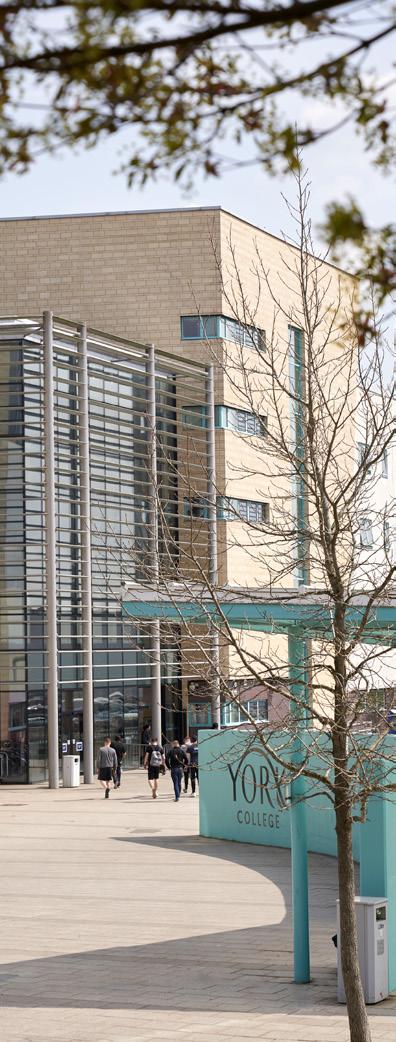
179 | DISCLAIMER
Open Events 2023/24
TASTER DAYS
Taster Days for Year 11 students will be held on the 16th & 18th January 2024. Booking in advance is required. Please see our website or call 01904 770239 for further information.
York College, Sim Balk Lane, York, YO23 2BB +44 (0)1904 770770 info@yorkcollege.ac.uk www.yorkcollege.ac.uk contact get social YORK.COLLEGE.YORKSHIRE YORK_COLLEGE YORK_COLLEGE YORK COLLEGE, YORK UK YORK COLLEGE, UK
19th October 2023 5.30pm - 8.00pm Wednesday 8th November 2023 5.30pm - 8.00pm Saturday 25th November 2023 10.30am - 12.30pm Monday 5th February 2024 5.30pm - 8.00pm Tuesday 19th March 2024 5.30pm - 8.00pm Thursday 20th June 2024 5.30pm - 8.00pm
A LEVEL APPRENTICESHIPS T LEVEL VOCATIONAL Thursday






































 Daniel A Level Business and Economics
Daniel A Level Business and Economics
























































 Noah Management & Administration T Level
Noah Management & Administration T Level















































































